Maria Dahle, Director
2024 was a year of stark contrasts for the Network of Human Rights Houses and beyond: continuing armed conflict and the disregard for human life were met with the bravery, solidarity and unity of those opposing it; rising authoritarianism was met with the uprising of communities that speak up against it.
The acceleration and deepening impact of authoritarianism, which human rights defenders and civil society have warned against for decades, was felt more acutely in 2024.
In Georgia and Serbia, we are witnessing a human rights crisis and rapidly closing civic space. For years, civil society in these countries has been the first to sound the alarm about early warning signs. As human rights defenders find themselves under direct attacks from their governments, and protests of thousands of concerned individuals are being ignored, international attention and timely response are crucial.
In Belarus and Azerbaijan, the situation is bleaker still. Authorities have almost completely eradicated independent civil society in these countries, forcing many into exile. The need for the protection of human rights defenders with efficient visa procedures and support systems also for exiled civil society is increasing.
Political imprisonment has become a widespread tool of repression, used to silence critical voices and to deprive citizens of alternatives to the state narrative. Our colleagues from the Network are among hundreds behind bars. Human rights defenders Anar Mammadli in Azerbaijan, and in Belarus Andrei Aliaksandrau, Ales Bialiatski, Andrei Chapiuk, Uladzimir Labkovich, Valiantsin Stefanovich and Marfa Rabkova are imprisoned for dedicating their lives to protecting and promoting human rights for all. We continue to call for their immediate release.
Human rights defenders are vital in working towards fairer and freer societies. Human rights defenders are like the canaries in the coal mine, warning us of imminent danger for the human rights development in a country. There is a clear link between domestic repression and international aggression. When authorities, over time, persecute dissent and critical voices in their own society, it is done with a purpose and ambition to limit pluralism, public participation, independent monitoring and reporting to citizens. It is a deliberate step toward authoritarian entrenchment, which may give way to violations that cross borders, including armed conflict.
Russia’s sustained military aggression against Ukraine continues amidst recent alarming shifts at the international arena where the United States seemingly has abandoned its position as a global defender of human rights to increasingly side with authoritarian states. Protecting and advancing human rights is an essential part of security policy. Hence, states’ support of international human rights mechanisms and standards, protection of human rights defenders, civil society and free media must be increased.
Through each level of rising authoritarianism, we see one constant: The strength and determination of independent civil society to stand up for what is right - despite overwhelming persecution. In these challenging times, solidarity and being a part of a community are essential.
In 2024, we marked the 30th anniversary of the Network of Human Rights Houses and we remain in awe of the members of the Network, brave human rights defenders of 80+ organisations, for their stamina and crucial work in protecting rights and freedoms at home and abroad. We also extend our deepest gratitude to our donors. Your support for the Network of Human Rights Houses is an investment in, and a demonstration of commitment to human rights at a time when it is needed the most.
Our work in 2024
October: Baia Pataraia and Lela Tsiskarishvili of Human Rights House Tbilisi joined HRHF’s 30th anniversary advocacy week in Oslo, engaging with Norwegian policymakers to highlight human rights issues.
Human Rights House Foundation (HRHF) envisions a world in which everyone can freely and safely promote and enjoy all human rights.
HRHF recognises that lasting human rights change can be achieved when a strong and independent civil society is united in solidarity and able to freely contribute to the promotion and protection of human rights at home and abroad.
Human Rights Houses are central to HRHF’s work empowering civil society and advancing its vision.
Our vision
October: Tanja Boromisa of Human Rights House Banja Luka met with representatives of the Norwegian Ministry of Foreign Affairs to discuss human rights trends in Republika Srpska, Bosnia and Herzegovina.
Strengthening capacities of Human Rights Houses to advance human rights
October: Member of the Network of Human Rights Houses advocate for the release of their imprisoned colleagues in Belarus and Azerbaijan.
Empowering Armenian civil society to combat SLAPPs
SLAPPs (Strategic Lawsuits Against Public Participation) are a rising threat in Europe used by powerful actors to silence civil society. HRHF and the Network have increasingly tracked this trend. In Armenia, mining companies and politicians are using SLAPPs to suppress environmental activists, human rights defenders, and independent media. To address this, Human Rights House Yerevan and Human Rights House Foundation (HRHF) hosted a two-day workshop in Armenia in September 2024, equipping civil society representatives with tools to combat SLAPPs. The workshop gathered 17 participants, including eco-activists, environmental organisations, and human rights defenders, to discuss SLAPPs, examine their threats to democracy and free speech, and explore strategies for legal resistance.
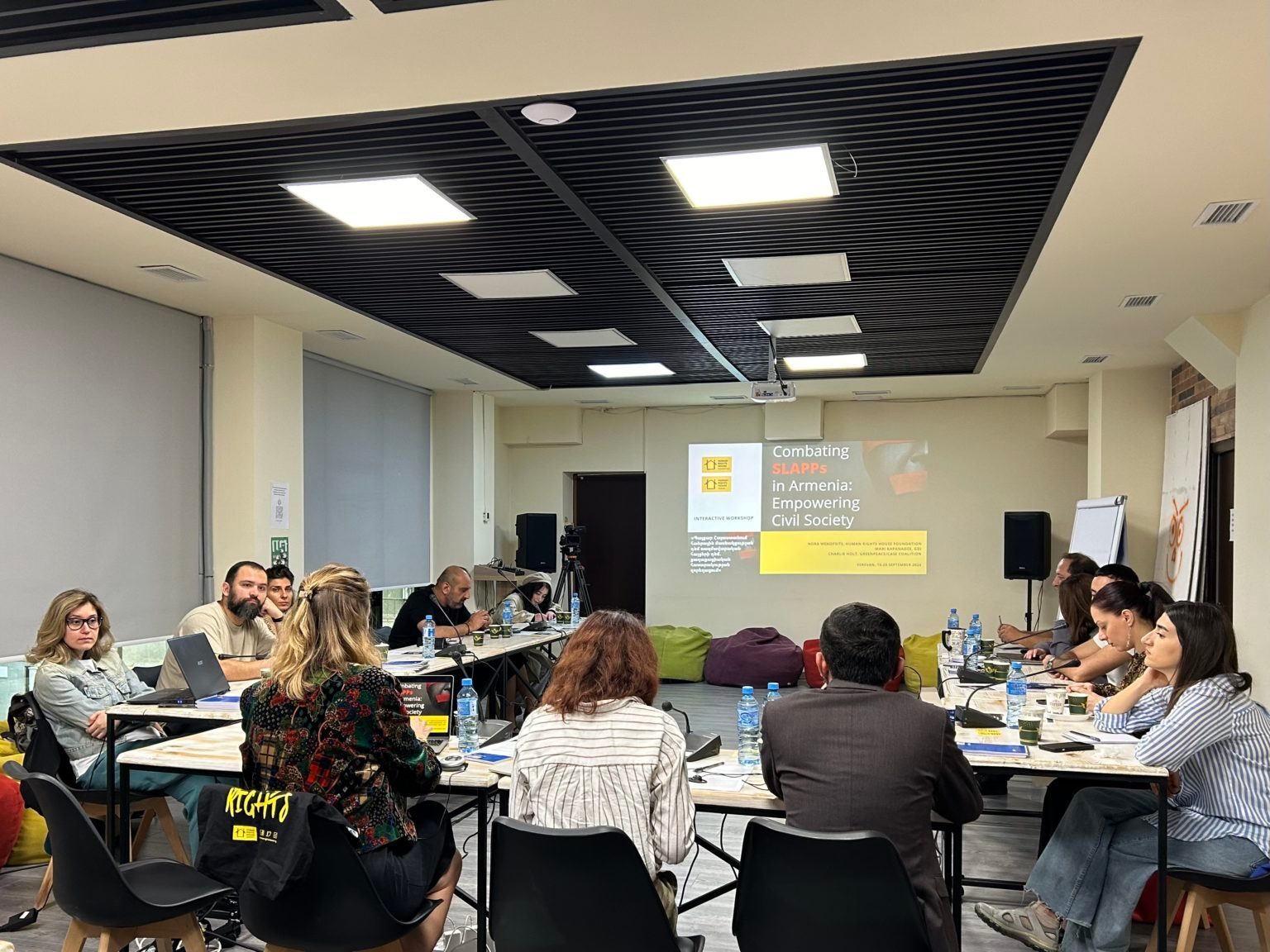
Supporting Belarusian civil society to engage strategically with the Universal Periodic Review
Ahead of the 2025 Universal Periodic Review (UPR) of Belarus at the UN Human Rights Council, HRHF hosted a workshop to build the capacity of Belarusian civil society organisations to meaningfully engage with the UPR process. More than a dozen HRDs participated, many of whom had never previously engaged with the UPR. HRHF focused on strategies for developing strong civil society submissions to the UPR and civil society access points within the UPR. Crucially, the workshop also created a collaborative space for exiled Belarusians to coordinate messaging around the UPR and ultimately increase the visibility of their collective concerns at the UN level. HRHF followed up the workshop by supporting organisations in drafting and submitting reports to form part of the UPR “stakeholder’s report” which will be reviewed and considered by States as they prepare their recommendations to Belarus.
September 2024: Participants during the workshop “Combating SLAPPs in Armenia: Empowering Civil Society”.
Building the sustainability of Network partners
HRHF’s capacity-building approach is focused on strengthening civil society by empowering the next generation of human rights defenders (HRDs). Peer-to-peer learning and nurturing connections between HRDs from the Network and beyond are a key part of the approach. Throughout 2024, HRHF worked to support Network partners by facilitating capacity-building activities aimed at increasing their resilience and impact. This work aimed at key areas such as communications, language skills, advocacy, and grant management and included English language classes, and an online group for communication professionals within the Network to exchange experience, best practices and tips. Additionally, HRHF organised workshops on advocacy and communication.
Supporting Network partners with coaching and mentoring
In 2024, HRHF offered one-on-one support for advocates from the Network of Human Rights Houses as part of its strategic coaching and mentoring work. This included working closely with partners like Anastasiya Dziubanava from the Belarusian Helsinki Committee, who was involved in advocating on two key resolution processes on Belarus at the UN Human Rights Council on the establishment of the Group of Independent Experts and the renewal of the Special Rapporteur’s mandate. In this interview, Dziubanava shares insight into these processes.
HRDs (of which 96 women) completed English course
0
%
Organisations supported through sub-grants
0
%
Advocacy capacity building workshops implemented, serving 66 human rights defenders
0
In 2024, Human Rights House Foundation (HRHF) strengthened the Network of Human Rights Houses, enhancing members’ capacities to address existing and emerging challenges and trends. HRHF focused on sustainability through capacity-building as well as direct coaching and mentoring in key areas including; advocacy, communications, language skills, and sub-grant management. HRHF also launched its Good Governance of a Human Rights House guide, a living document providing insights into best practices for the Network and wider civil society. Thanks to the generous support of its donors, HRHF provided core and project sub-grants, empowering Houses and their members to serve as platforms for human rights work and respond to local needs.
Strengthening the Network of Human Rights Houses and its impact
October: Network representatives were invited by the Norwegian Parliament to an international seminar on political prisoners, co-organised by HRHF. They briefed Members of Parliament on regional human rights challenges, focusing on political prisoners, transnational repression, and possible responses.
Left to right: Dušan Pokuševski (Belgrade Centre for Human Rights, member organisation of Human Rights House Belgrade), Viktoryia Fiodarava (Legal Initiative, Belarus), Baia Pataraia (Sapari, member organisation of Human Rights House Tbilisi), Arzu Geybulla (journalist, Azerbaijan), and Olha Skrypnyk (Crimean Human Rights Group, member organisation of Human Rights House Crimea).
Human rights defenders from the Network in focus
Throughout 2024, HRHF worked to amplify the causes and calls that are most urgent for members of the Network to bring international awareness, influence decision-makers, and contribute to increased visibility of HRDs that may increase their protection at home. HRHF published interviews on trends, and emerging issues from “foreign agent” legislation to wellbeing as a cornerstone of sustainability. To honor women human rights defenders and the vital role that they play nationally and internationally in protecting and advancing human rights, HRHF launched the third edition of its Portraits of Strength photography series. Featuring strong women HRDs from across the network, the exhibition has been launched in a number of countries, attracting wide audiences and enabling conversations about the impact of WHRDs.
Network of Human Rights Houses in Southeastern Europe launched
On 19 March 2024, a new Regional Network of Human Rights Houses was launched by Human Rights Houses Banja Luka, Belgrade, Zagreb and the Sarajevo Open Centre. The Network was formed as a way to work more closely together on issues like EU ascension as well as common challenges. As its first activity together, the group launched a joint report on the situation of human rights defenders in the region. By coordinating evidence-based regional advocacy efforts, the Regional Network is determined to address common human rights challenges and learn from shared experience.
Mobilising the Network to raise the alarm on rising authoritarianism
HRHF and the Network of Human Rights Houses work together to monitor, document, and report on human rights trends – which our partners experience in their work. In 2024, we advocated together on the international level about the acceleration and deepening of authoritarianism in the region. Our joint advocacy targeted States and other stakeholders with specific calls to action. In July, we hosted a side event at HRC56 highlighting the situation in Bosnia and Herzegovina, Georgia, and Azerbaijan. In May, HRHF and partners from Human Rights House Tbilisi published analysis and recommendations following Georgia’s adoption of the Law on Transparency and Foreign Influence. Throughout the year we highlighted our colleagues in Azerbaijan and Belarus, imprisoned for their work in warning the world about the troubling developments there.
Advocating together for increased support for civil society and celebrating 30 years of the Network
In October, representatives from the Network of Human Rights Houses gathered in Oslo for a week of advocacy focused on strengthening support for human rights defence, and to mark the Network’s 30th anniversary which was established in Oslo in 1994. HRHF hosted a reception at Human Rights House Oslo bringing together Network representatives, HRHF board members, Norwegian diplomats, and civil society leaders. Together, we celebrated the Network and recommitted to the values of human rights, needed more now than ever in the face of rising authoritarianism.
HRDs at risk (including family members) received protection support
0
%
Events organised for Network members to jointly advocate for human rights
0
Members of the Network of Human Rights Houses
0
+
HRHF connects HRHs and their member organisations in an international Network, enabling transnational connections, solidarity, competency transfer, protection, and collaboration to amplify human rights impact nationally, regionally, and internationally. In 1994, Human Rights House Oslo and Human Rights Houses in Moscow and Warsaw founded the Network of Human Rights Houses. Three decades later, we celebrated this milestone as the total number of organisations united in the Network rose to over 80. Human Rights Houses in Southeastern Europe joined forces with the Sarajevo Open Centre to establish a new Regional Network, enhancing cross-border collaboration. Throughout the year, HRHF worked alongside partners to strengthen the Network, amplify the voices of its members, and raise the alarm on emerging human rights challenges. HRHF thanks its donors for making this work possible.
Strengthening
the promotion and protection of rights that underpin independent civil society
October: Members of the Network of Human Rights Houses discuss human rights trends with representatives of the Norwegian Standing Committee on Foreign Affairs.
Promoting the link between human rights and security
The OSCE is a key international organisation operating at the intersection of human rights and security. On 18 March 2024, in Vienna, Human Rights House Foundation and the Netherlands Helsinki Committee co-hosted a civil society Human Dimension event where OSCE State delegations could hear directly from human rights defenders from seven countries, including representatives from several Human Rights Houses in the region.
Advocating for enhanced EU visa guidance for HRDs at risk
On 26 June, the EU Commission adopted a revised EU visa handbook strengthening human rights protections with fairer visa procedures and greater support for human rights defenders. HRHF has actively advocated for these changes for years through the #Visa4HRDs campaign together with Protect Defenders and other civil society actors, contributing to advocacy, policy reporting, and consultations including with the Fundamental Rights Agency and DG ENEST, and the Visa Committee. Insights from the Network of Human Rights Houses have been included in the Handbook’s examples of the application of visa regulation. This reform is vital for HRDs at risk, enabling them to continue their work in exile when fleeing hostile environments.
Pursuing accountability for severe human rights violations in Belarus at the Human Rights Council
On 4 April 2024, the UN Human Rights Council adopted a resolution establishing the Group of Independent Experts on Belarus (GIE Belarus). The new mechanism is critical for advancing accountability for severe human rights violations in Belarus in connection with the ongoing mass repressions renewed and intensified following the 2020 presidential elections.
The establishment of the mandate follows years of advocacy coordinated by HRHF alongside Belarusian and international civil society, and it replaces the OHCHR Examination of Belarus, established by the Human Rights Council in 2022 following advocacy by HRHF and partners. In the same resolution, the Human Rights Council extended for another year the mandate of the Special Rapporteur on Belarus, a critical mandate and lifeline for Belarusian civil society to the international community. The GIE Belarus is gathering evidence to support legal accountability, including potential prosecutions at the International Criminal Court, and ensure long-term justice, given the absence of national or regional accountability mechanisms. HRHF continues to advocate for its support and renewal, with Lithuania already initiating [as of April 2025] a process at the ICC.
Maintaining international attention on reprisals against civil society
In 2024, HRHF continued to raise reprisals against civil society for its legitimate work as a serious trend inhibiting human rights defenders from working at the national level and engaging with international organisations and mechanisms. When those engaging with international bodies, or advocating domestically, face intimidation, threats, imprisonment, or worse, we all lose. Maintaining attention on reprisals raises the political cost on malign actors who might conduct them and helps the international community protect HRDs at risk. A notable case is the detention of our colleague Anar Mammadli who has been behind bars in Azerbaijan since 29 April 2024. Mammadli was arrested for his legitimate human rights work, including his participation in March events at the UN Human Rights Council and OSCE (see story below).
Responding to political and human rights crises together
Throughout 2024, HRHF, the Network of Human Rights Houses, and partners sought to draw and maintain attention to deteriorating human rights situations across our region, including in Azerbaijan, Belarus, Georgia, Russia, and Ukraine (in the context of Russian military aggression). We did so to raise pressure on domestic authorities and the international community to respond to violations. Civil society plays a vital role in exposing human rights violations and informing international response and accountability processes.
International standards, mechanisms, and national laws strengthened following HRHF and Network advocacy
0
/
0
International human rights mechanisms engaged with by HRHF and Network partners
0
/
0
Activities jointly implemented by HRHF and Network partners to advocate for strengthened international and domestic human rights policies
0
+
Grants issued to promote the role of women HRDs
0
+
Thanks to the support of its donors in 2024, HRHF continued to empower and work alongside Human Rights Houses, their members and partners to defend fundamental freedoms and advocate for systemic change. HRHF responded, alongside partners, to political and human rights crises in Azerbaijan, Georgia, Ukraine, and Russia, as well as trends like reprisals and rising authoritarianism, through international advocacy and institutional engagement. Together we called for action and accountability in response to deteriorating human rights situations, increased support for human rights defenders, and for the release of our imprisoned colleagues. We advocated for the renewal and strengthening of key international mechanisms including the mandates of the UN Special Rapporteurs on Belarus and Russia to sustain bridges between the international community and civil society in both countries. HRHF and the Netherlands Helsinki Committee co-hosted a Human Rights Tour of the OSCE region, providing a platform for HRDs to share first-hand accounts of ongoing challenges.
2024 in words: Insights from members and partners of the Network
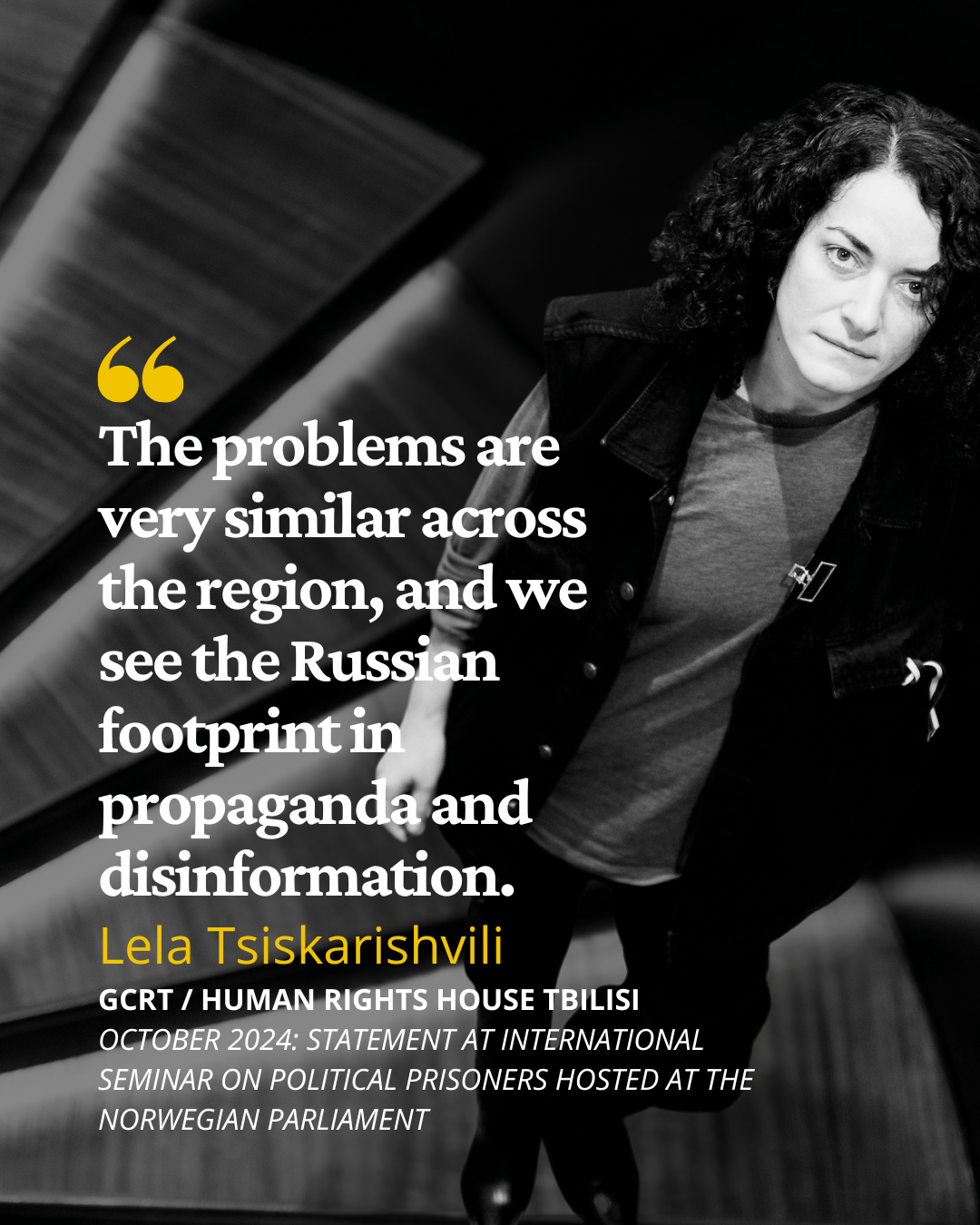
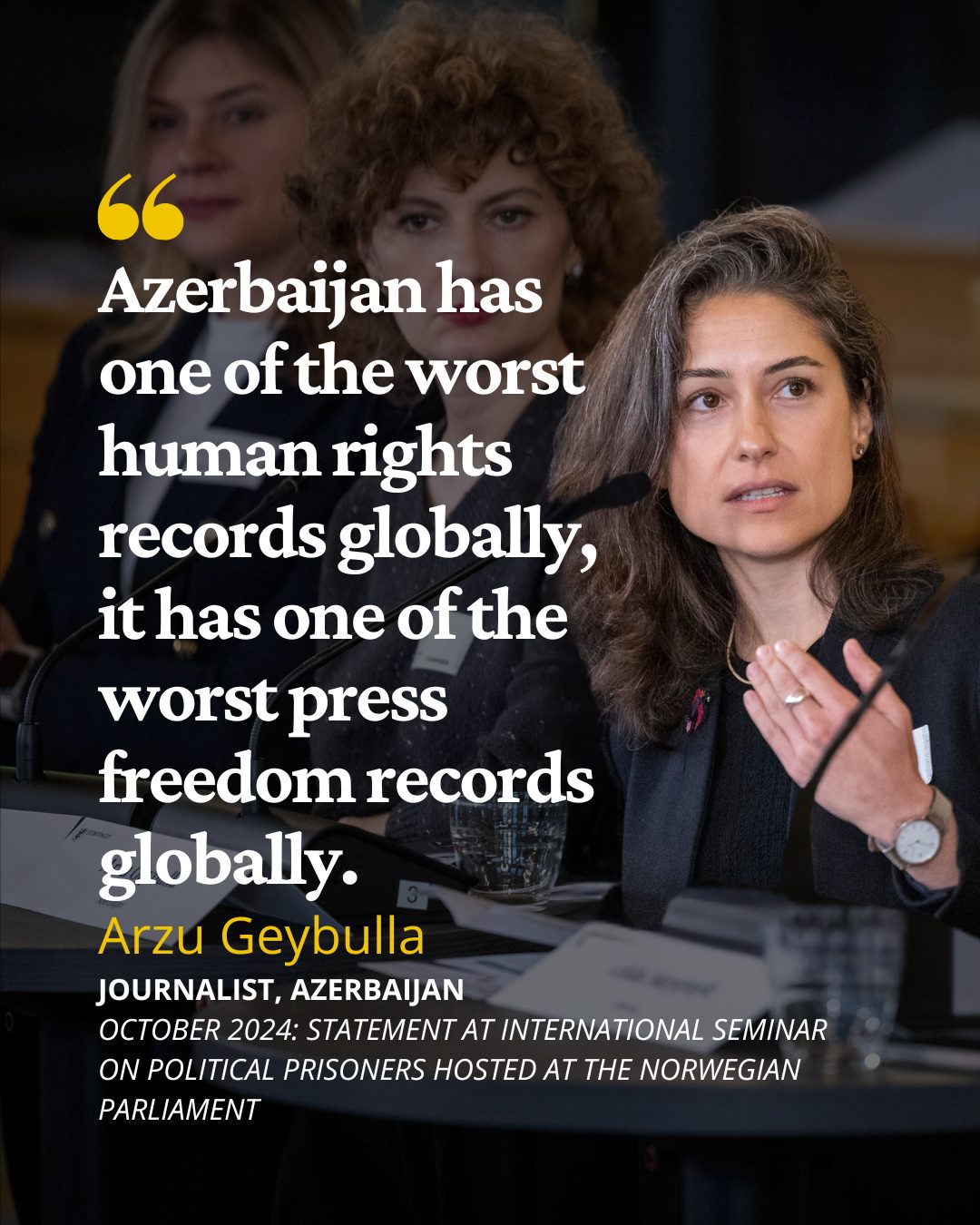
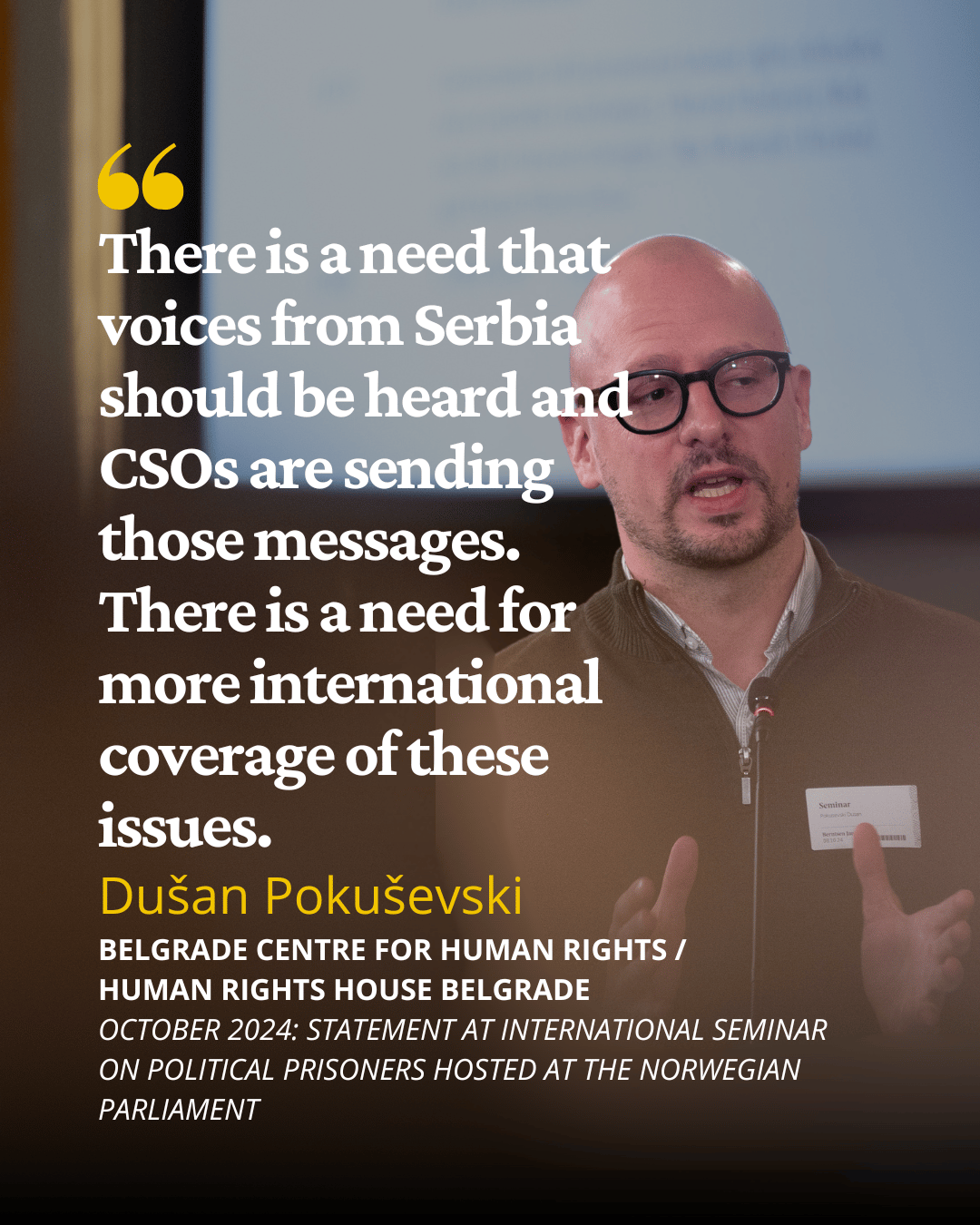
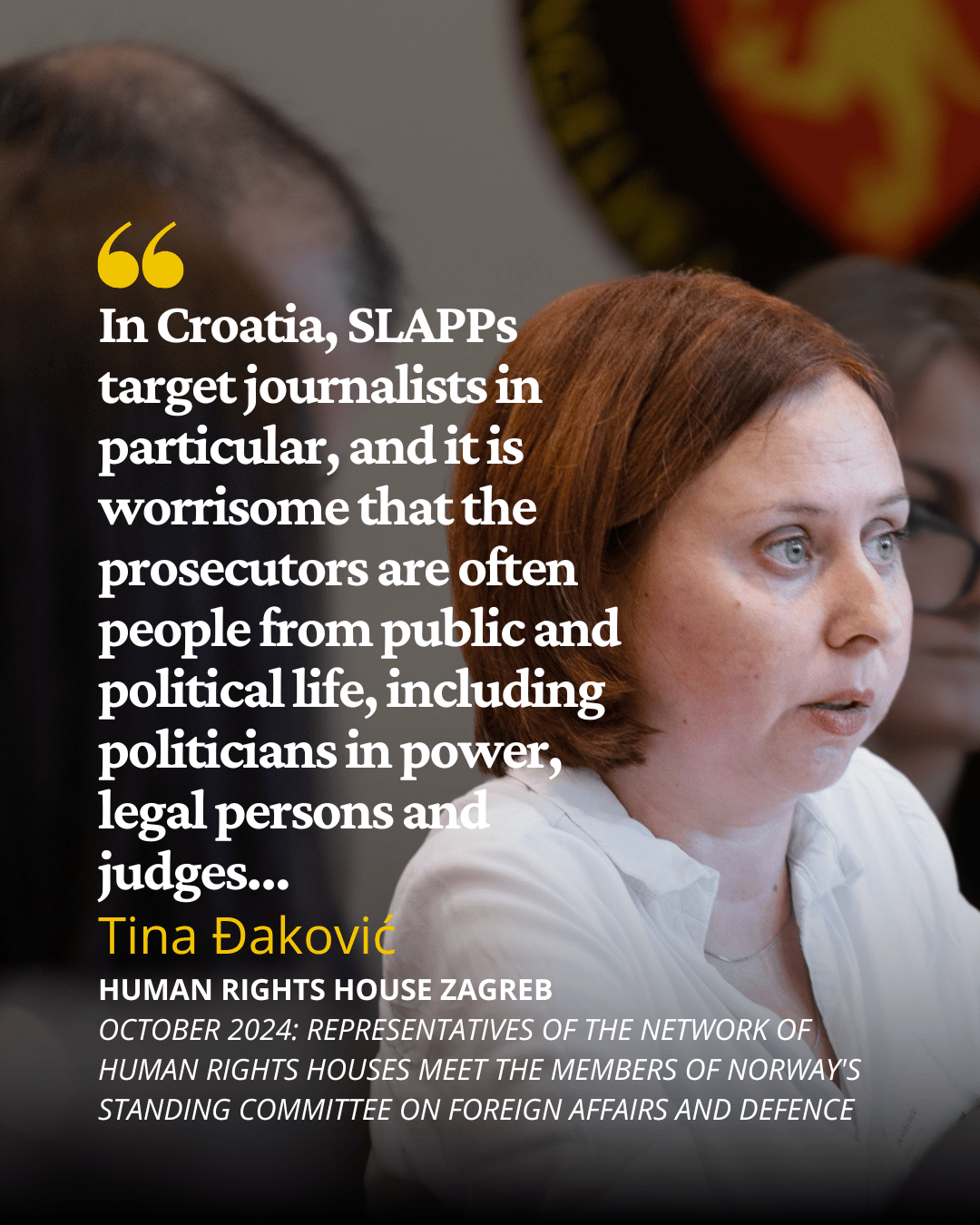
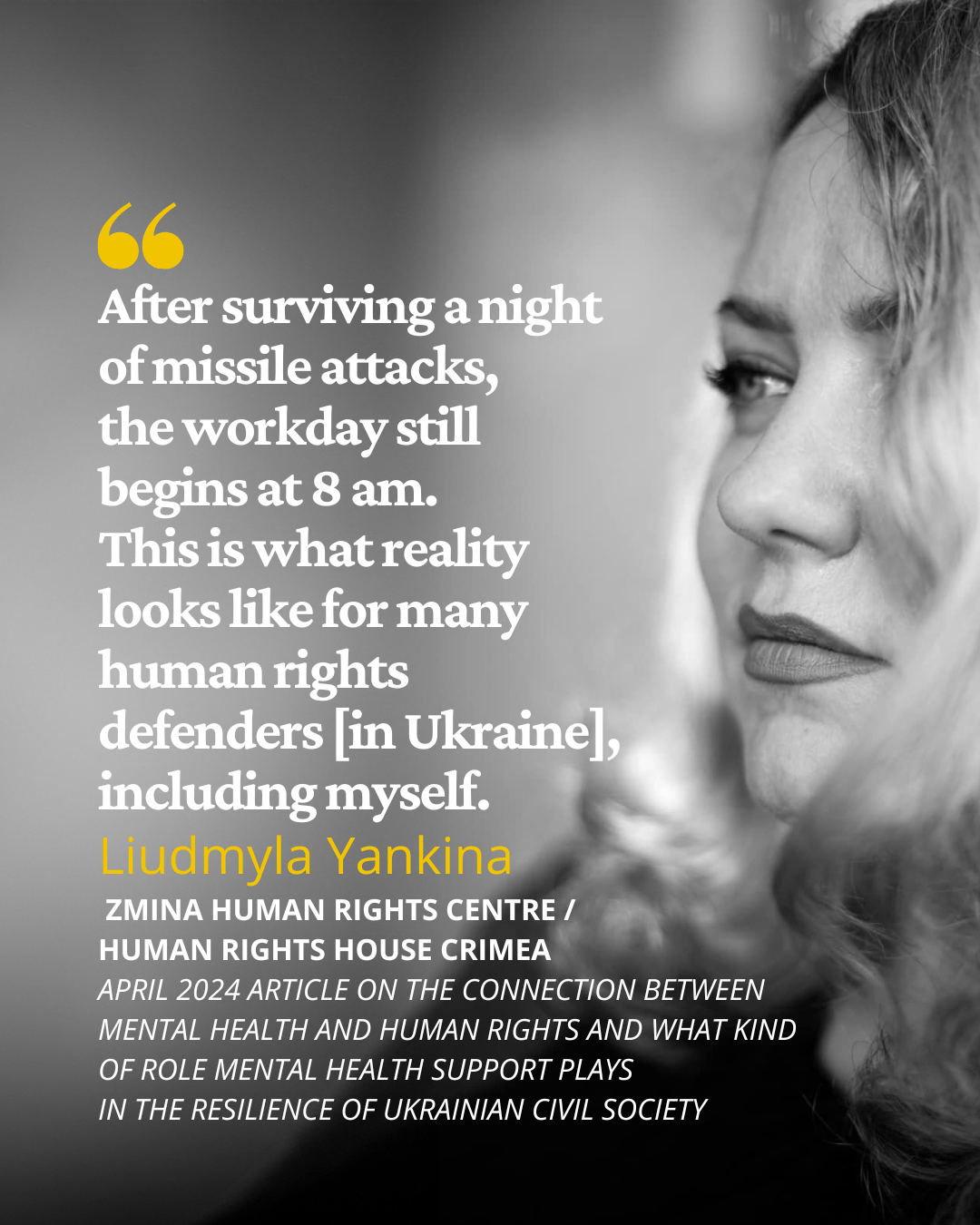
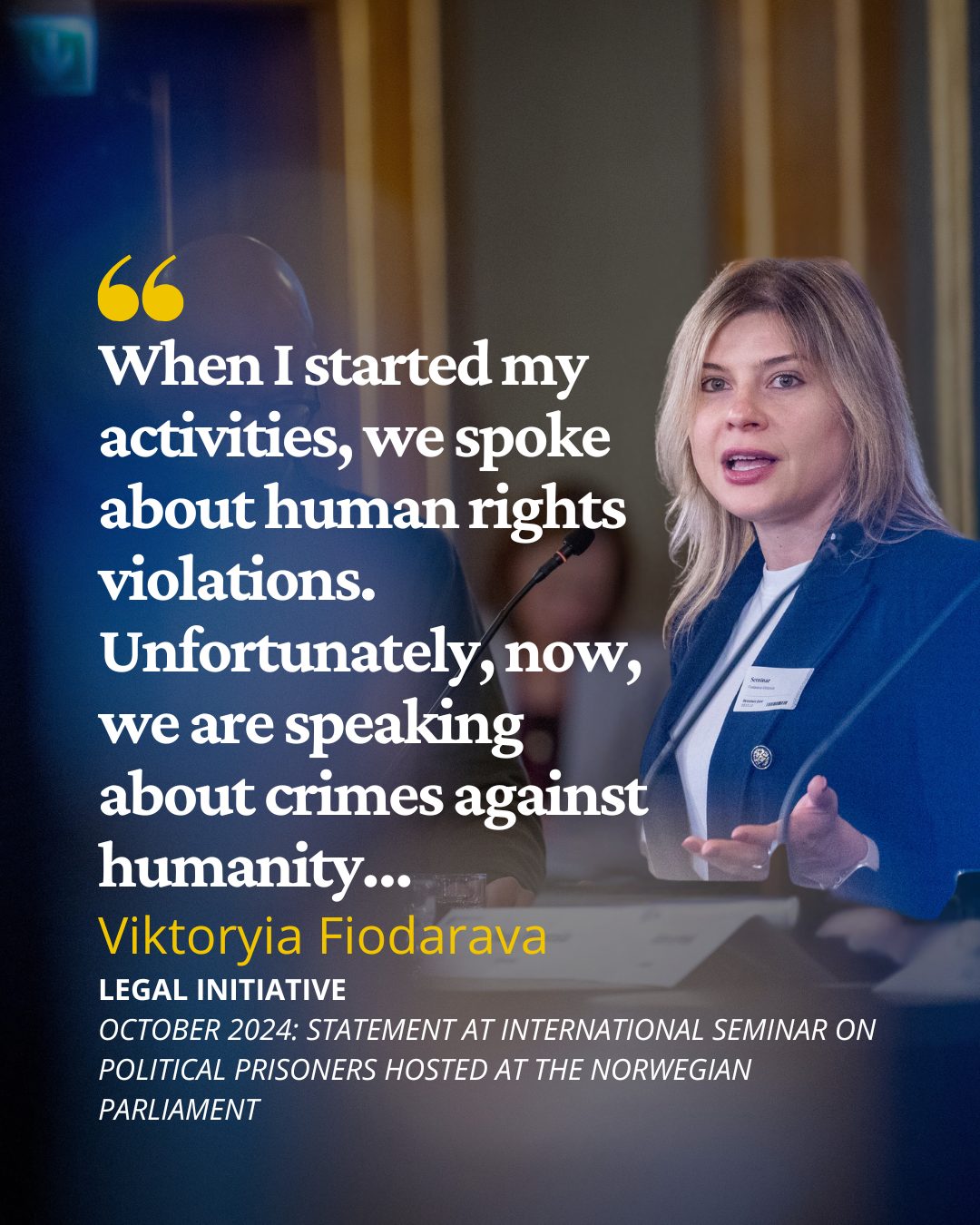
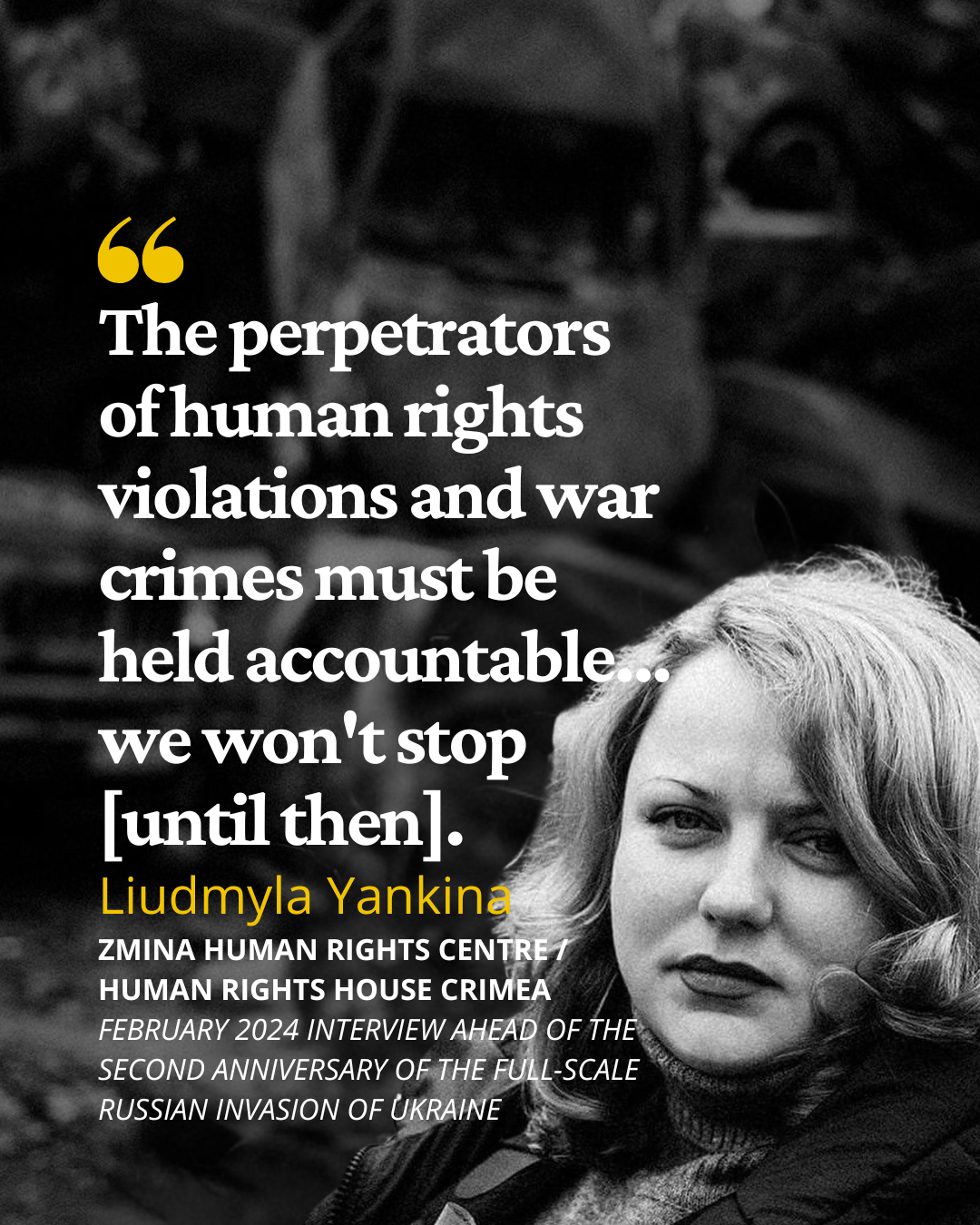
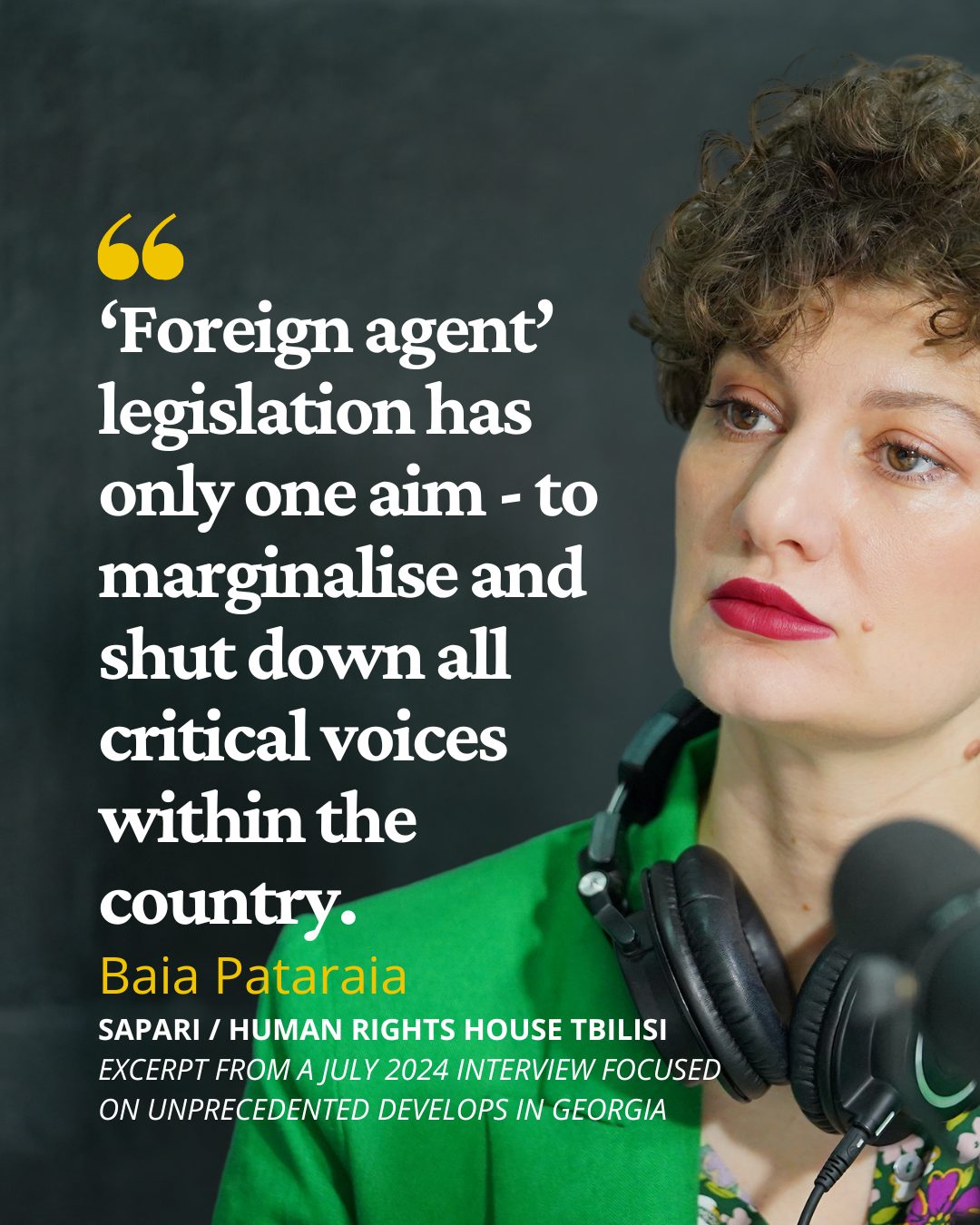
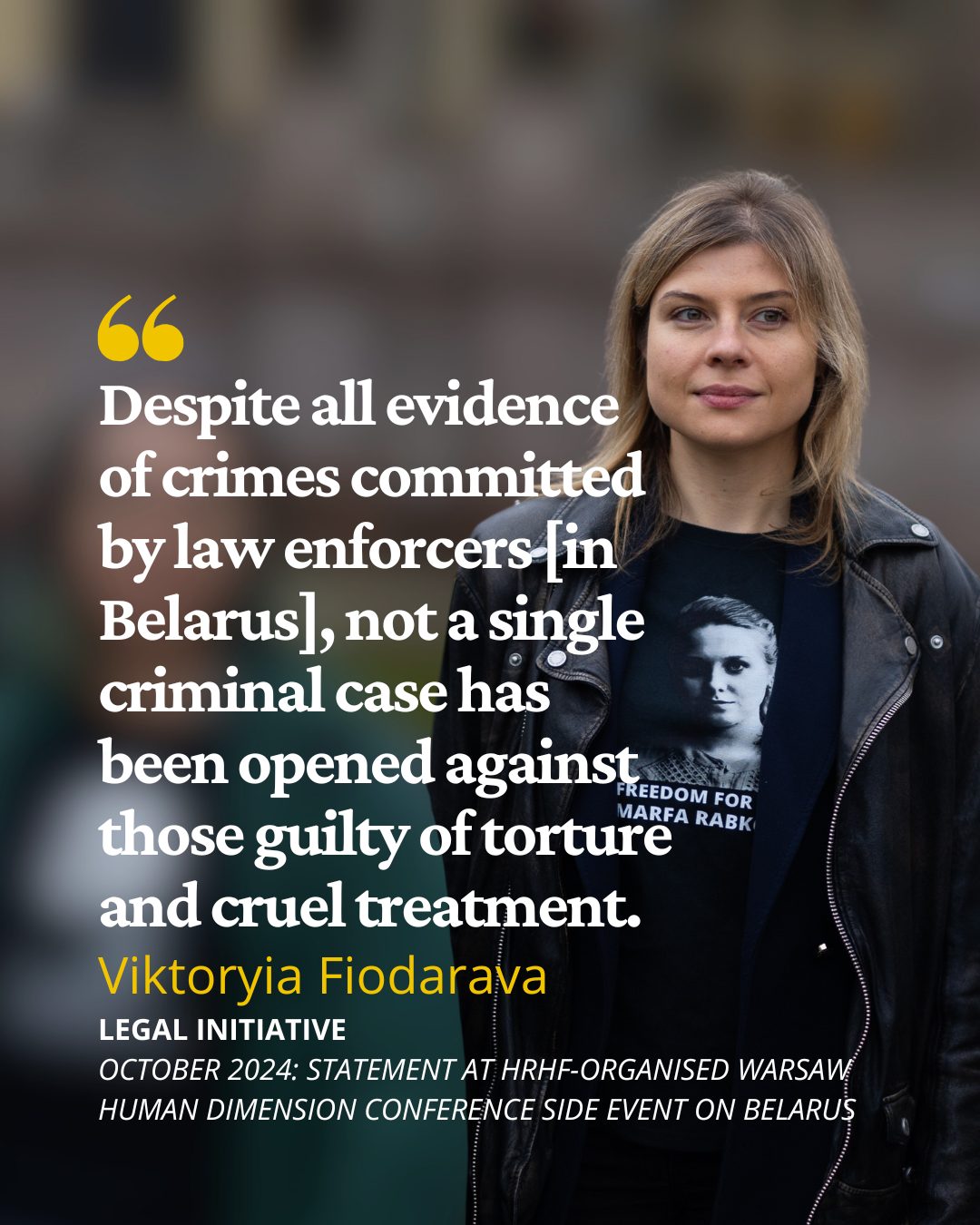
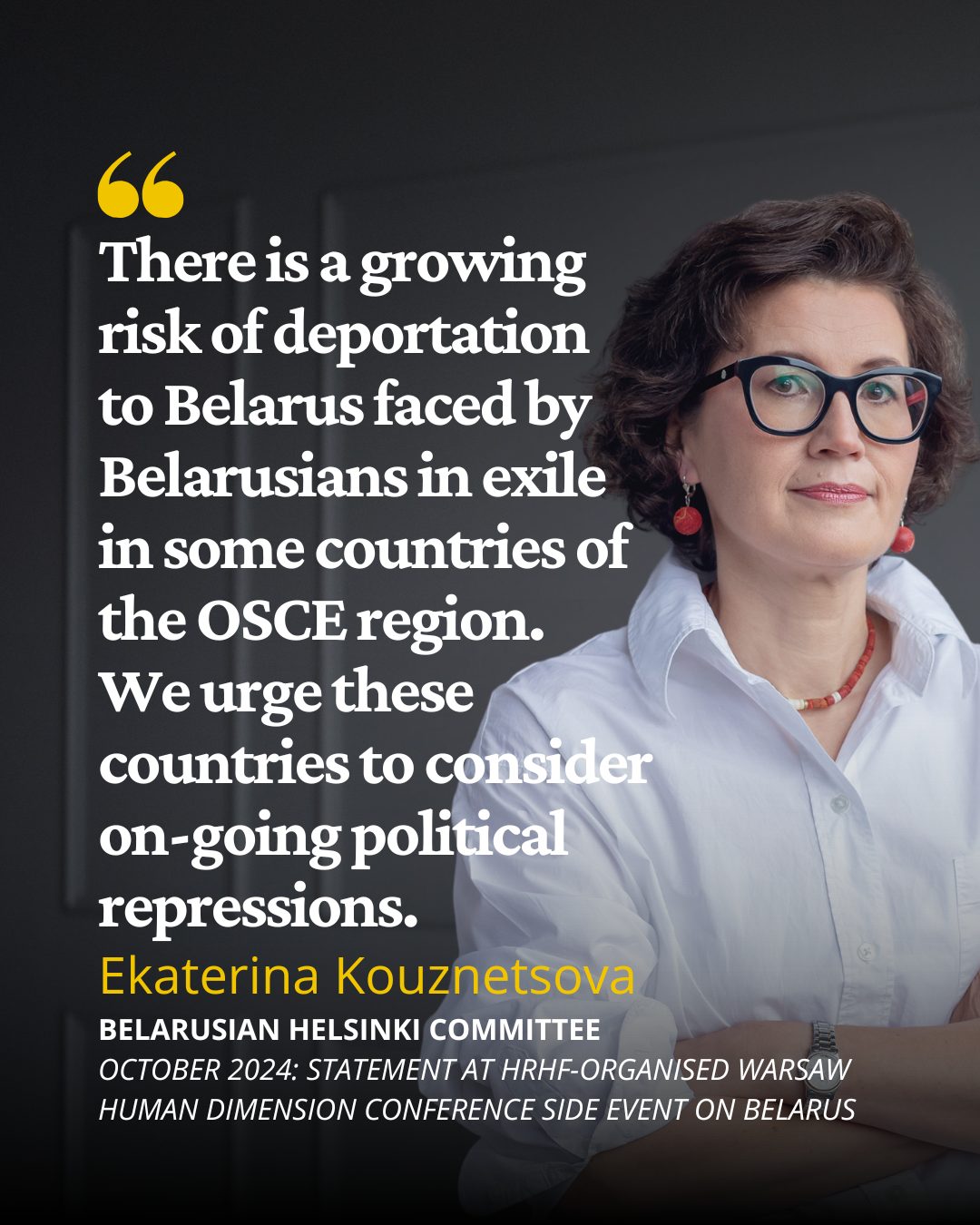
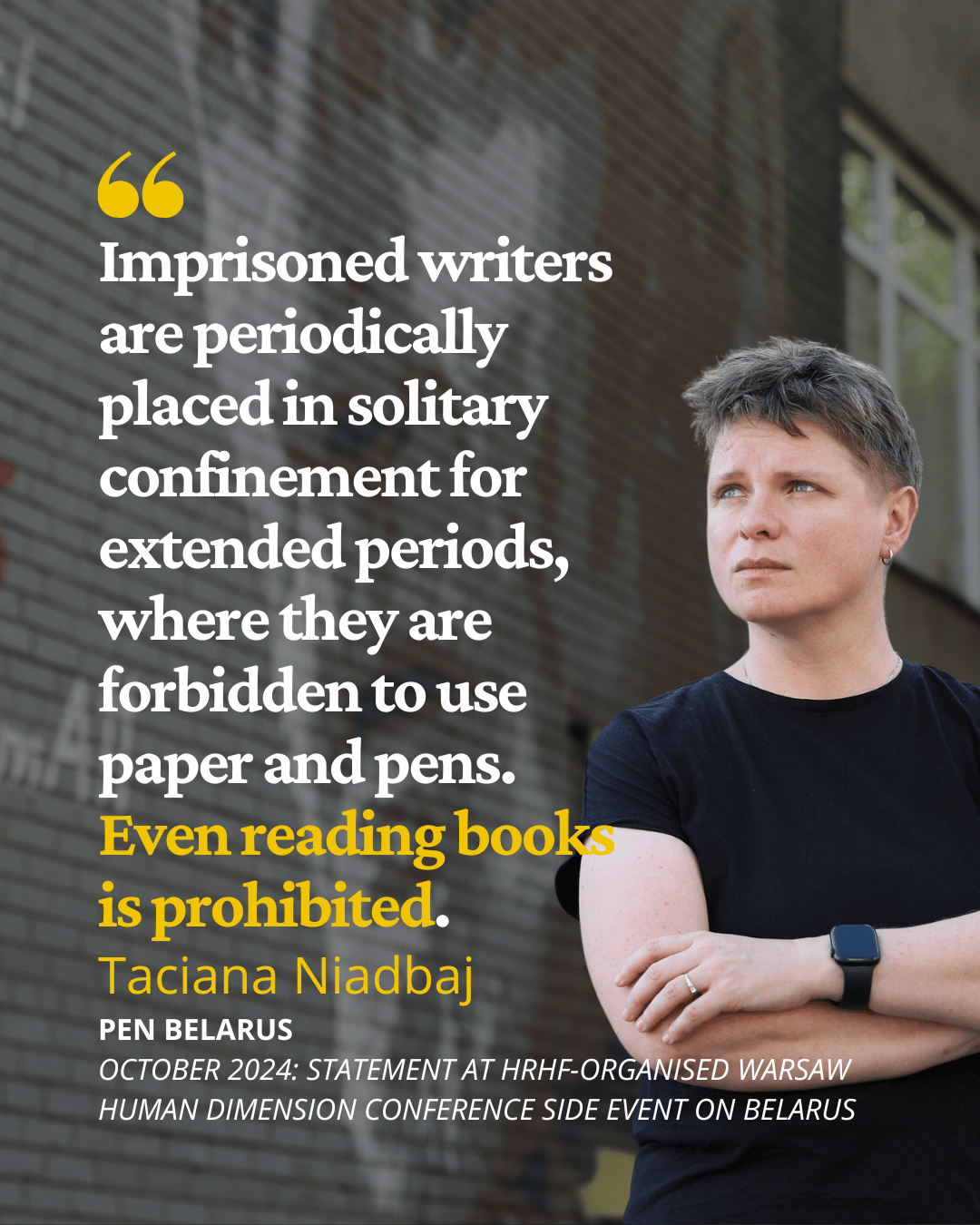
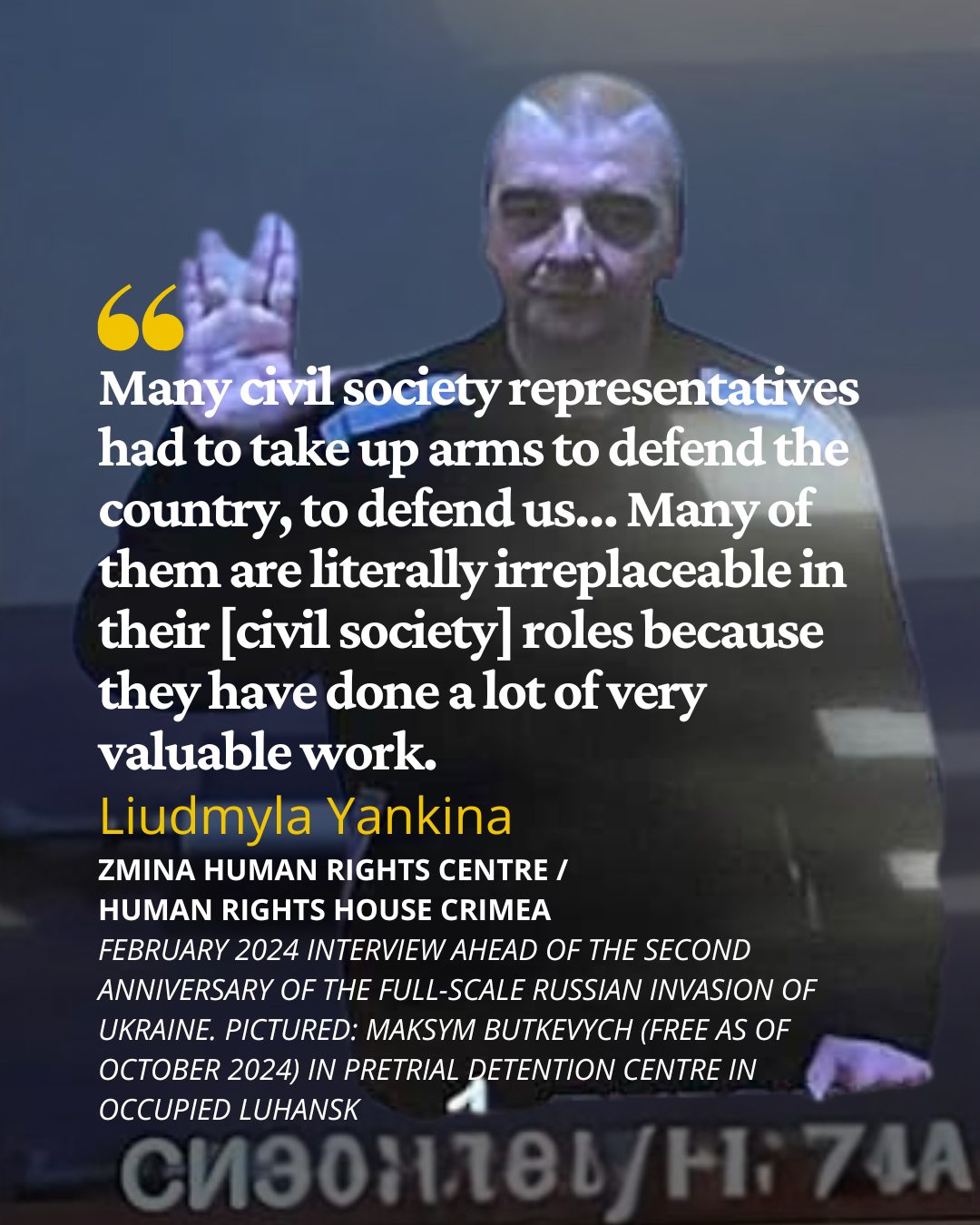
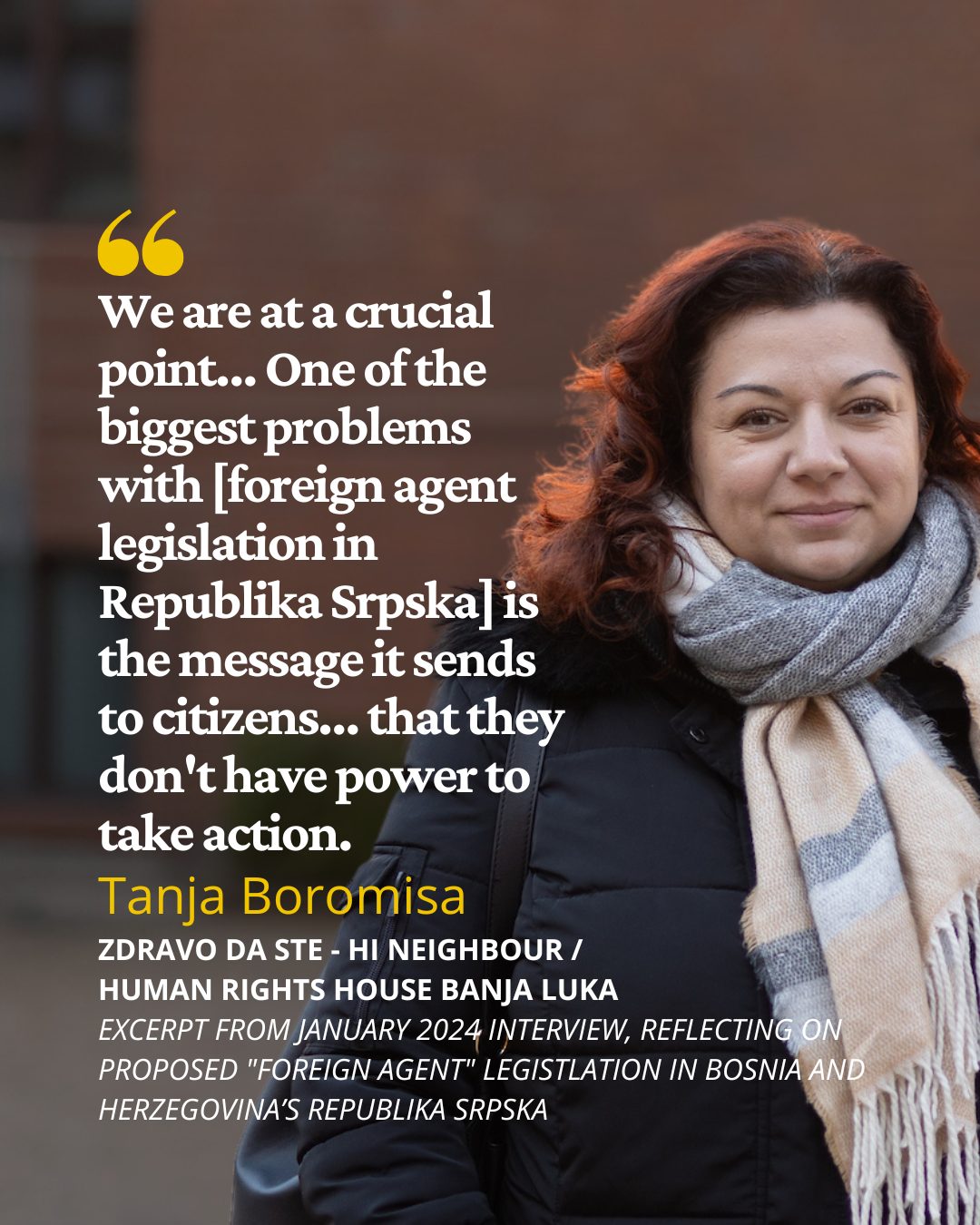
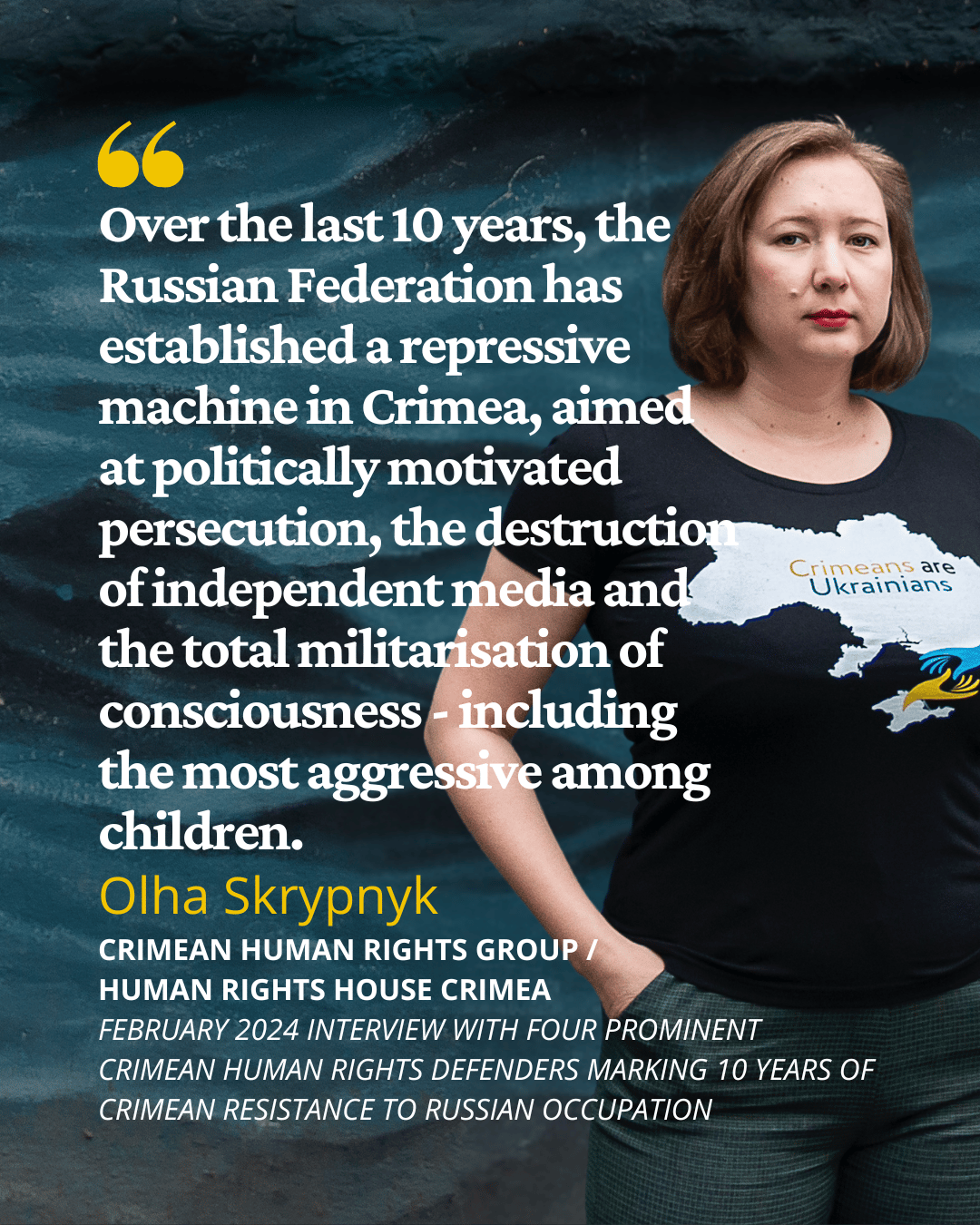
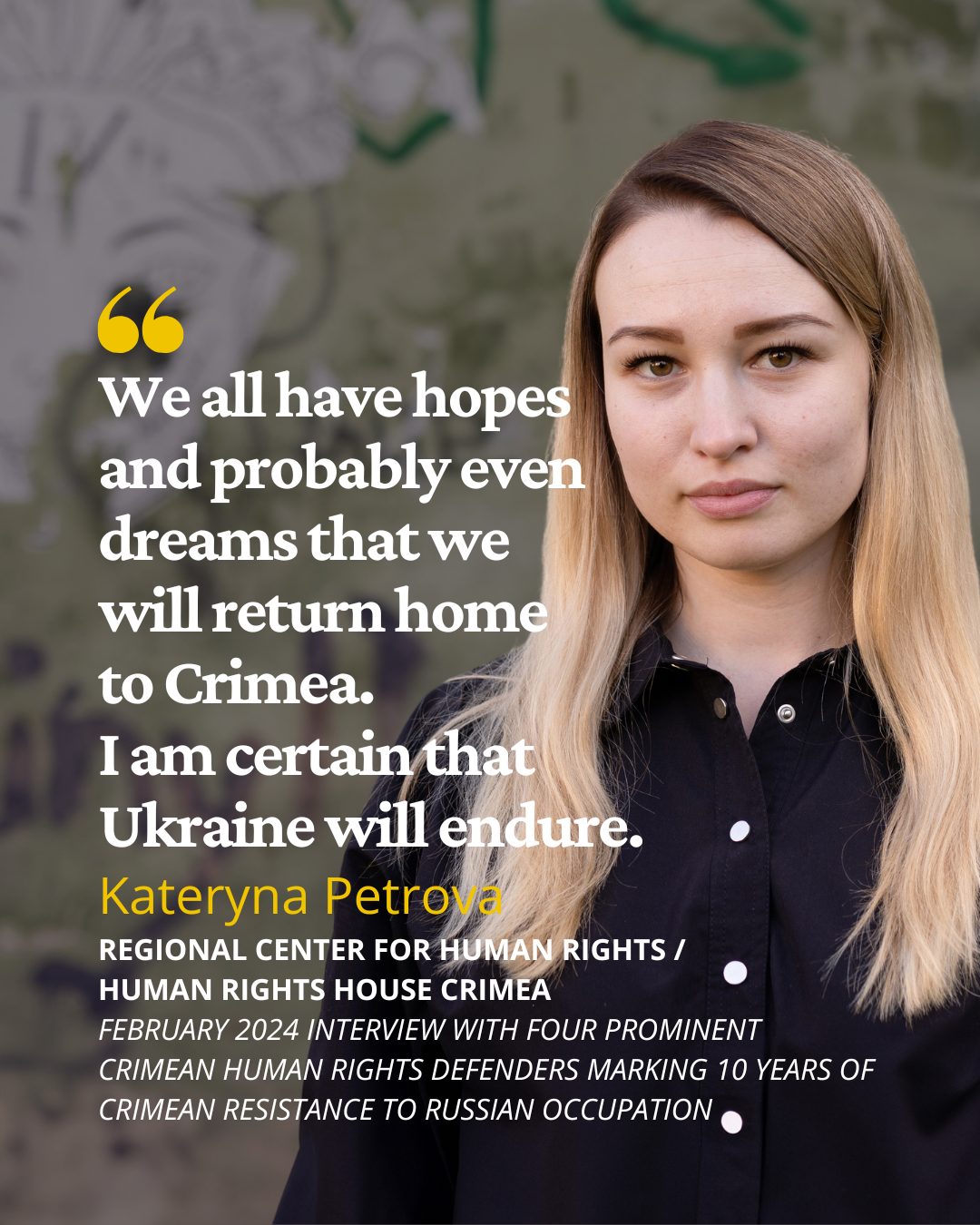
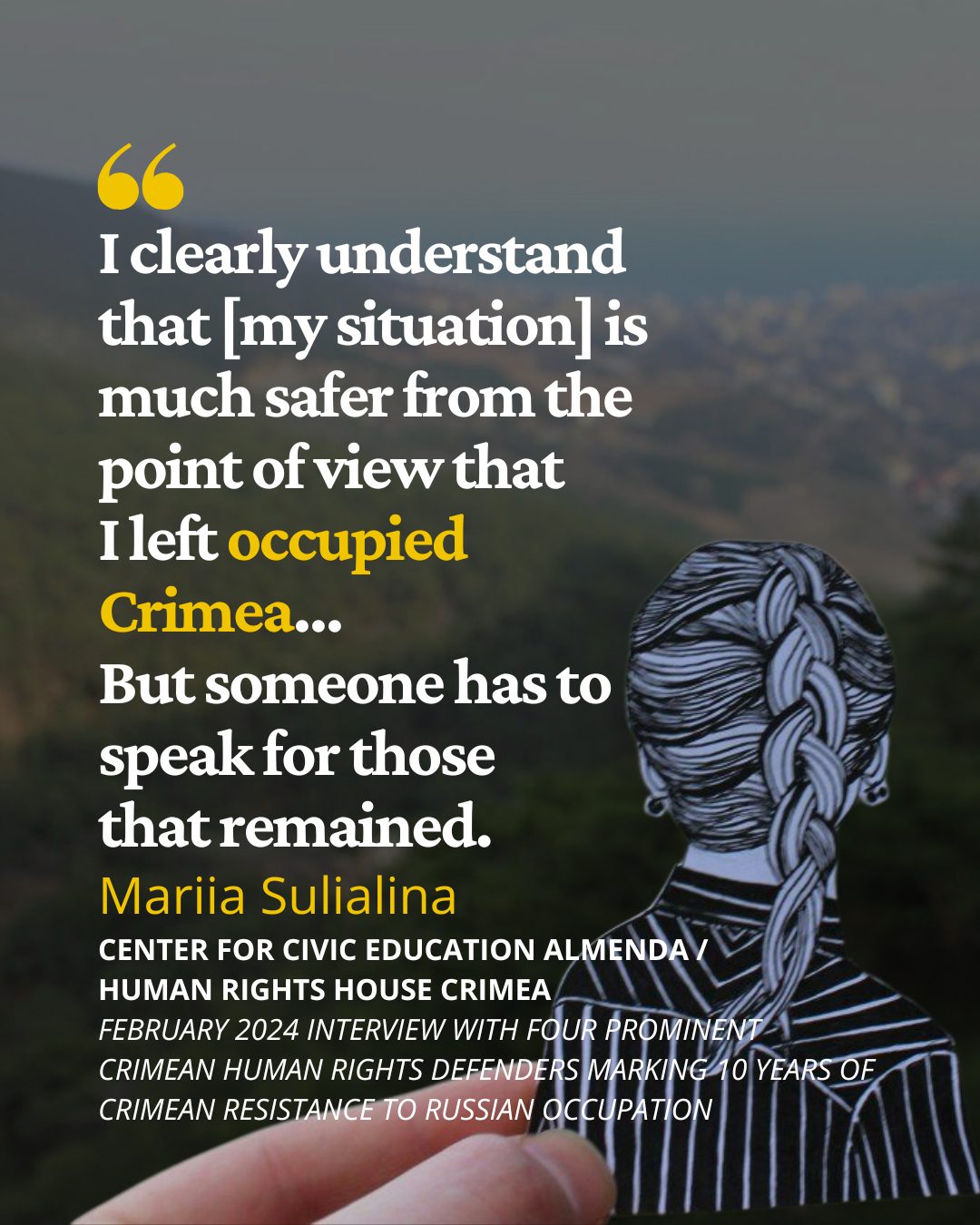
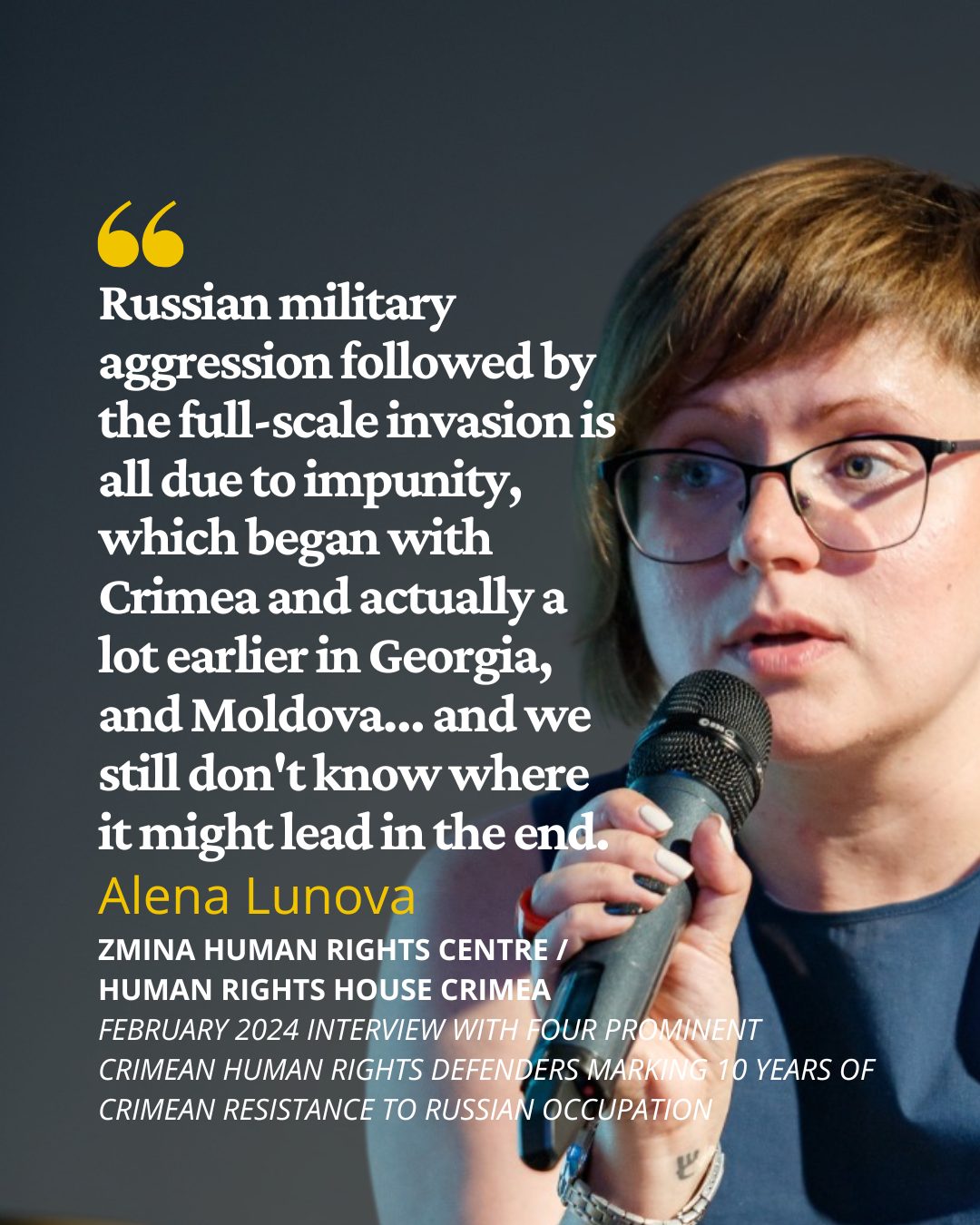
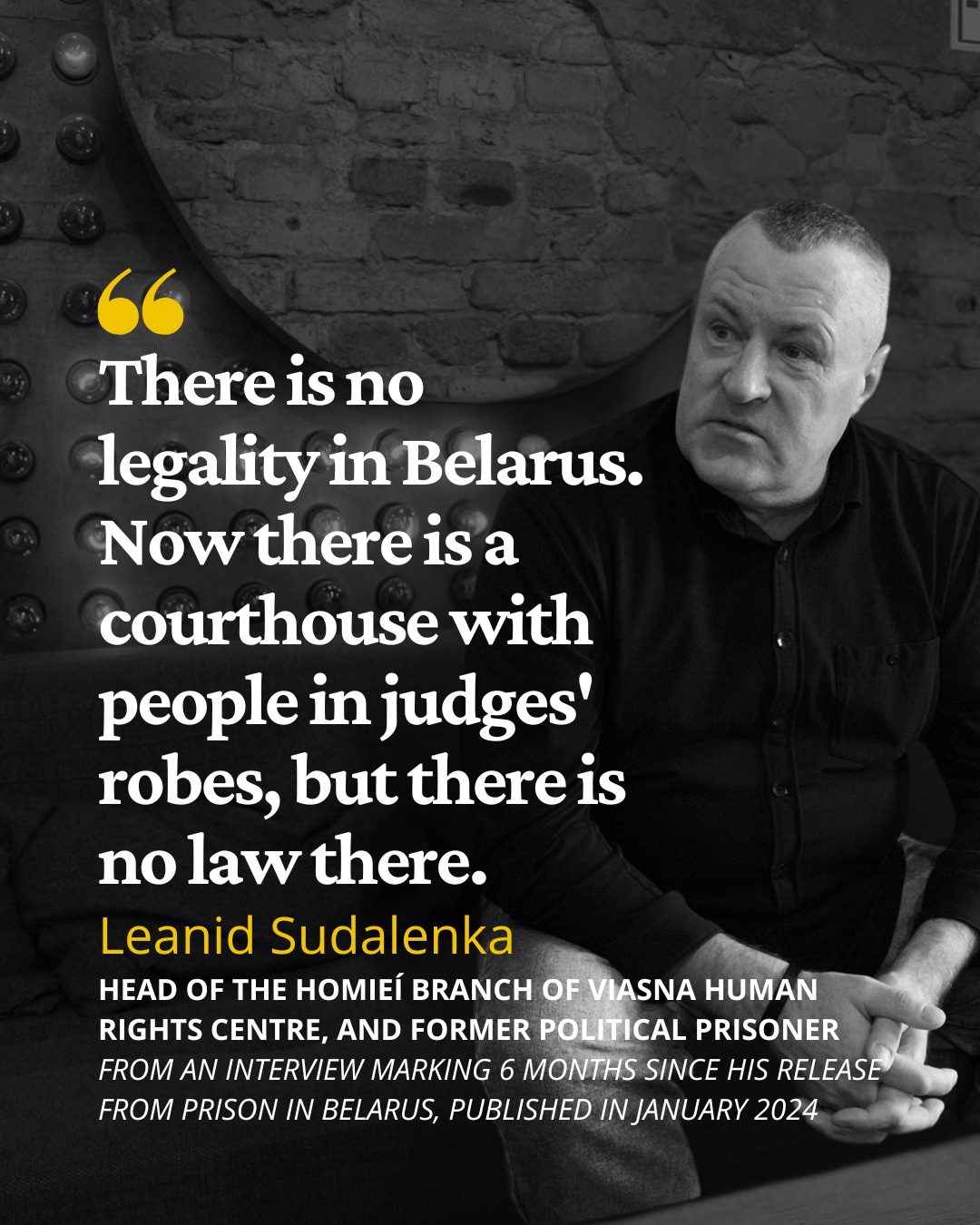
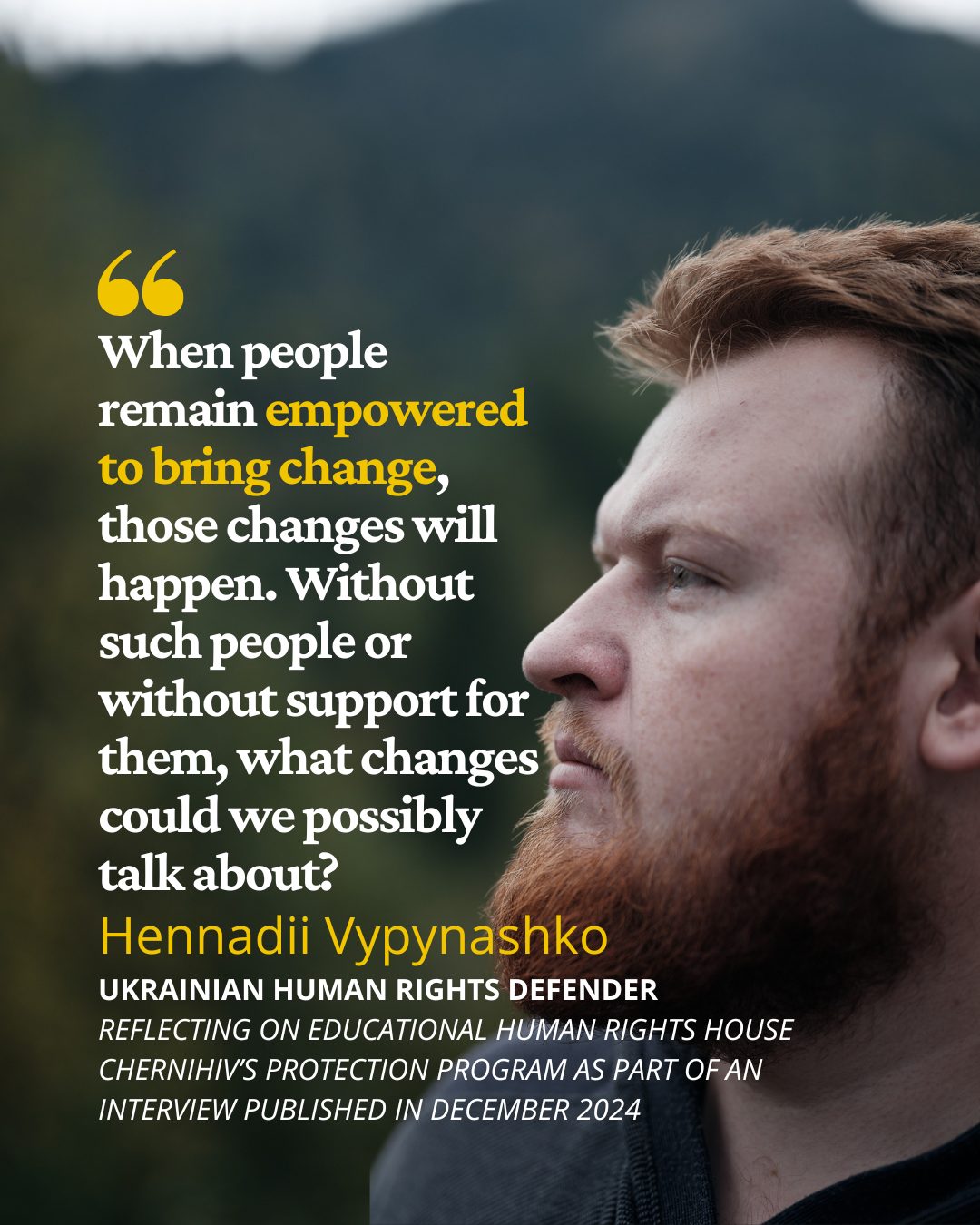
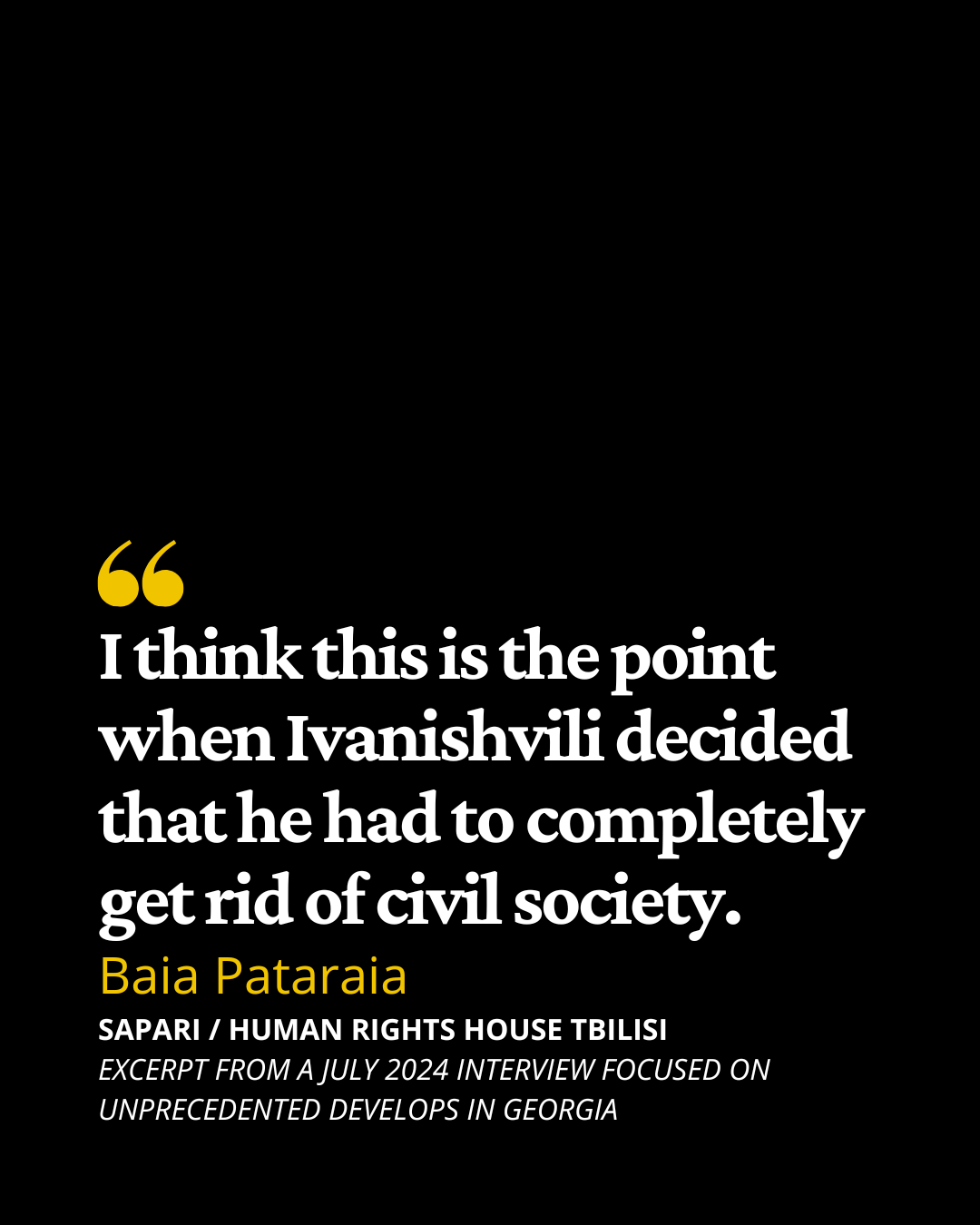
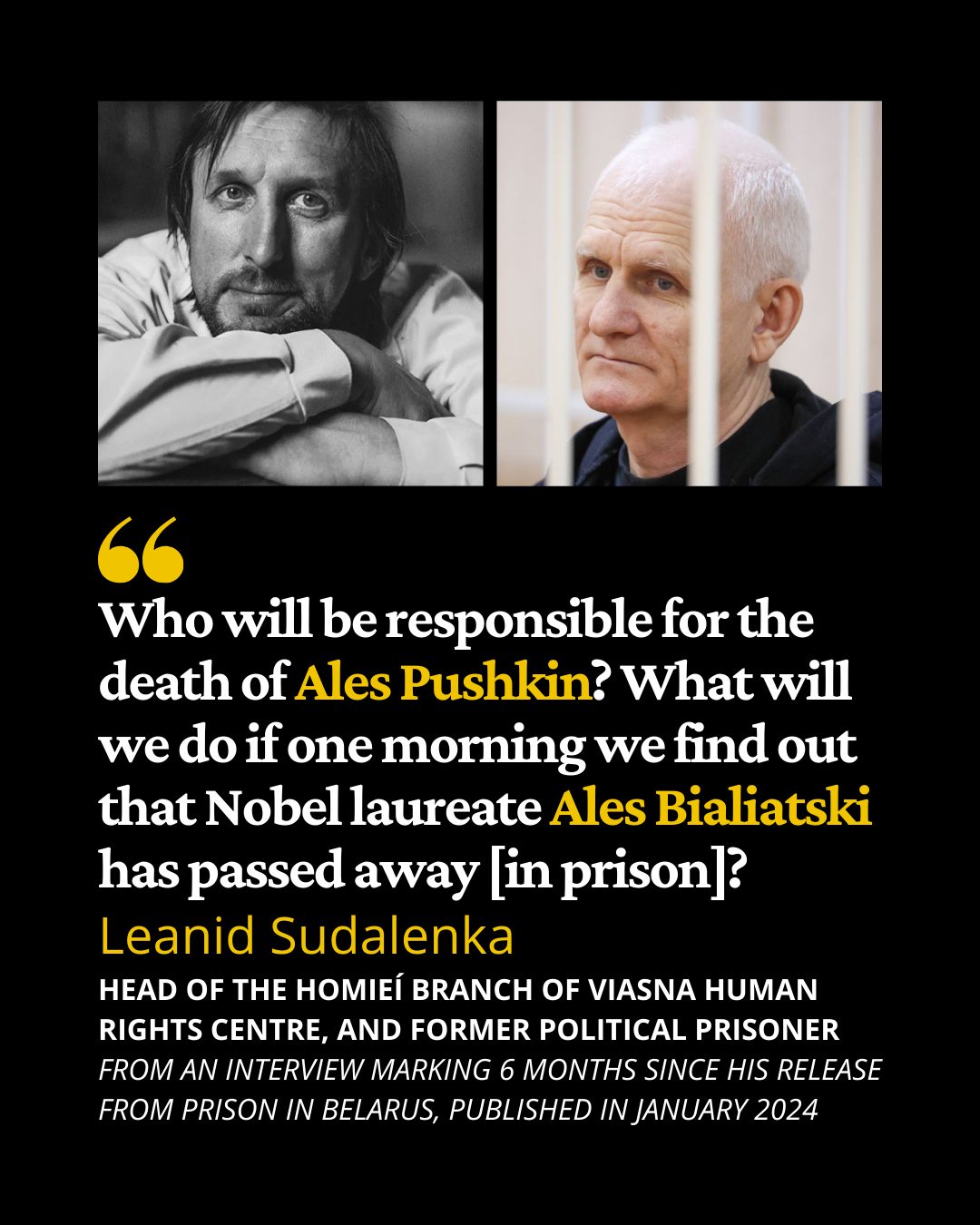
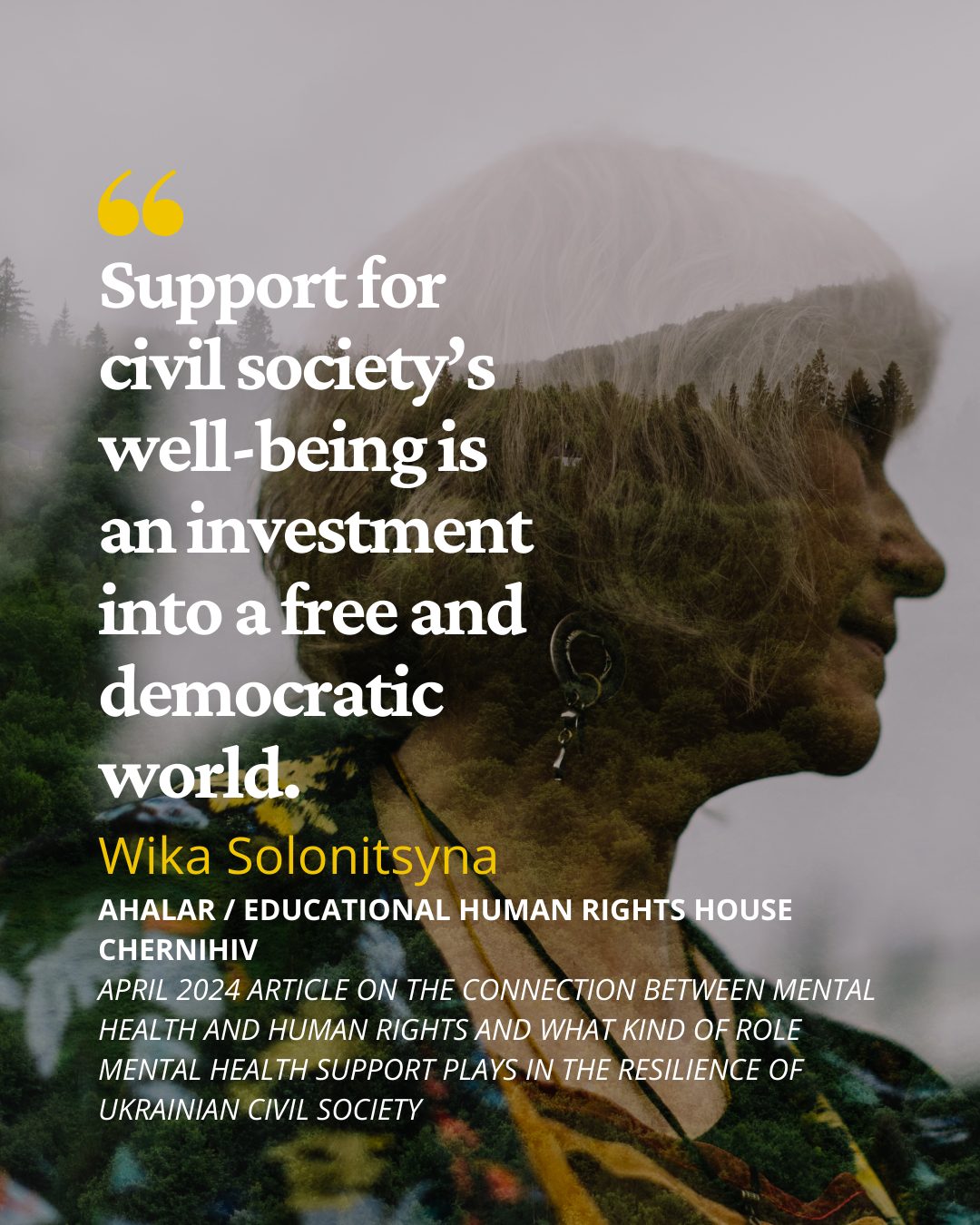
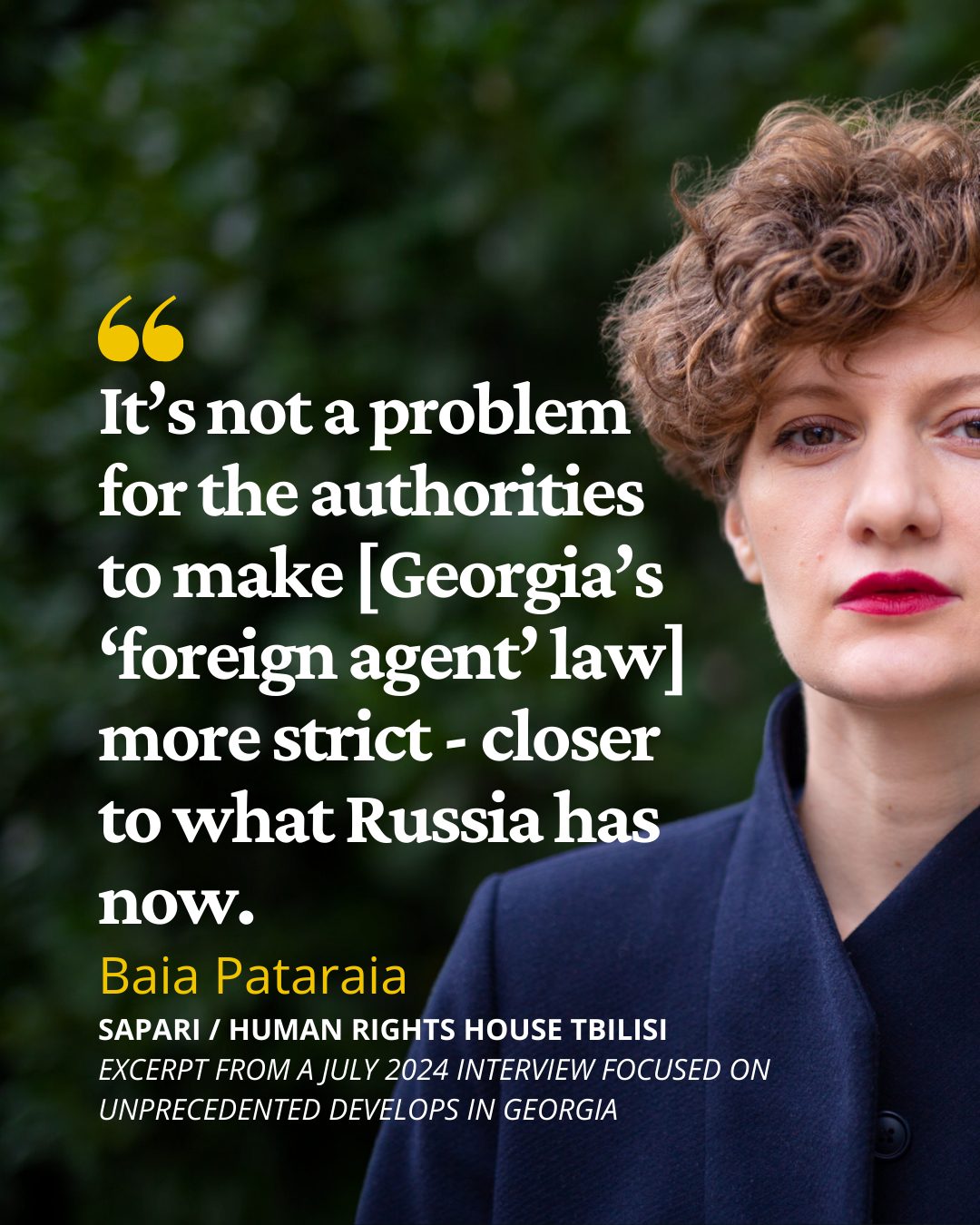
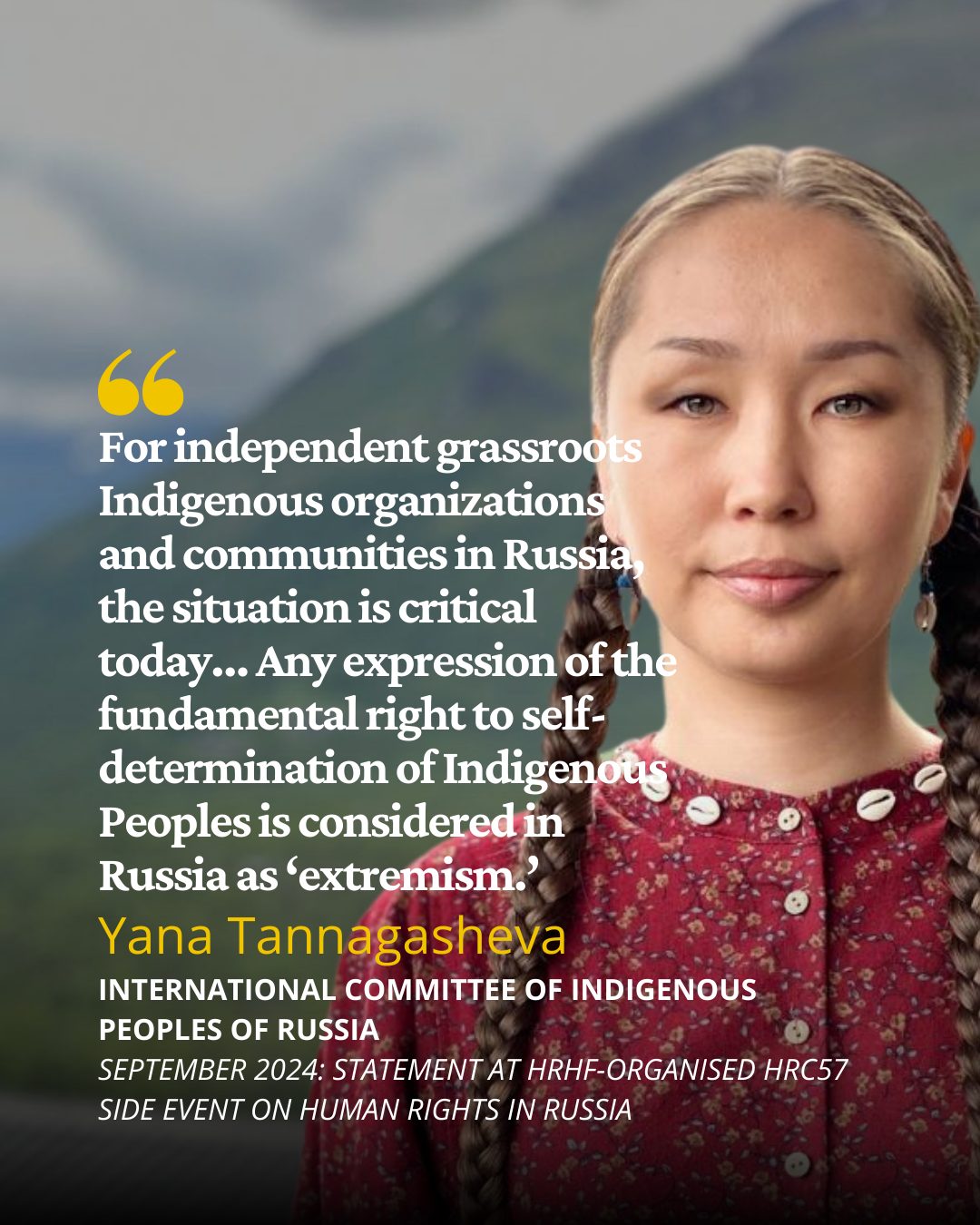
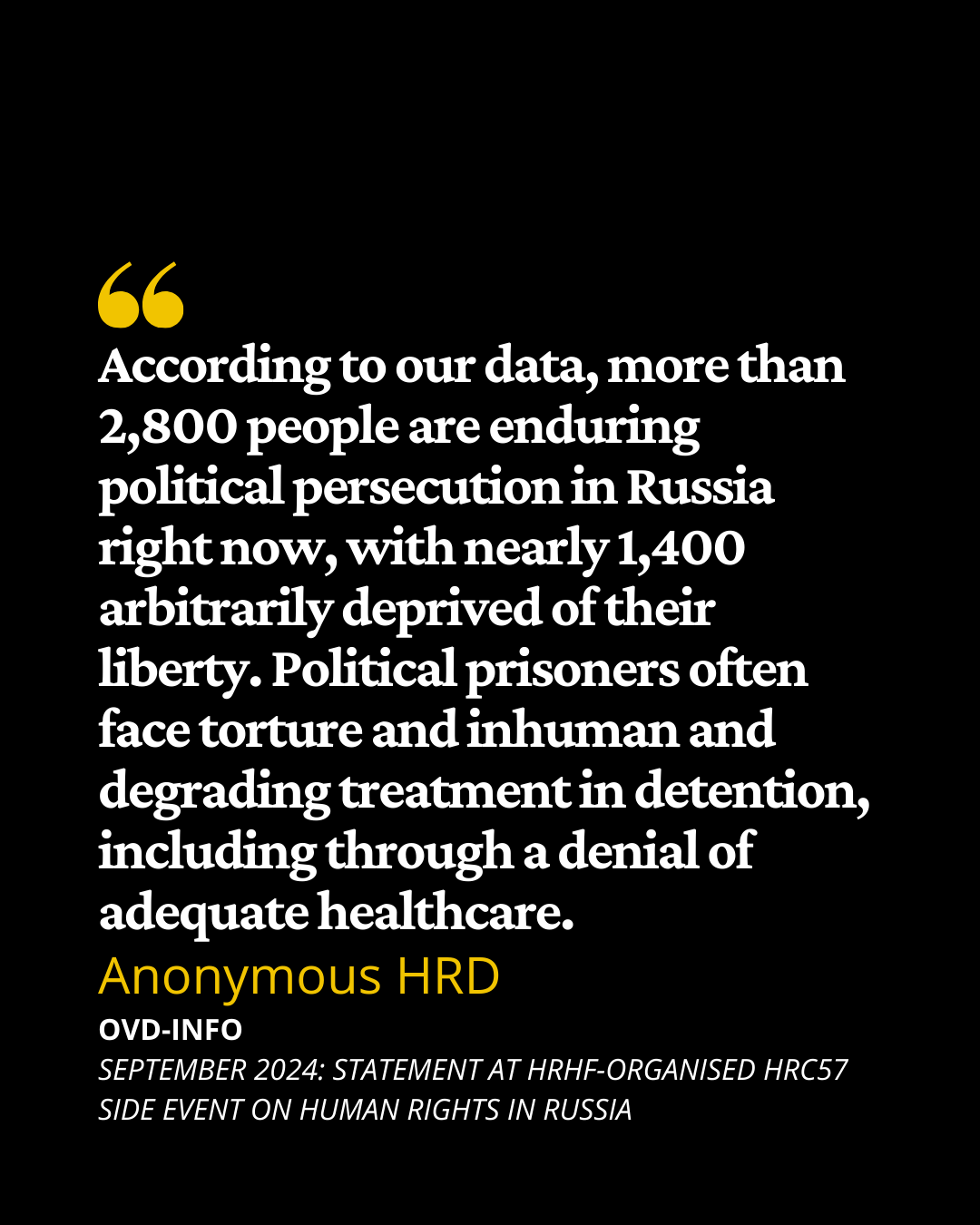
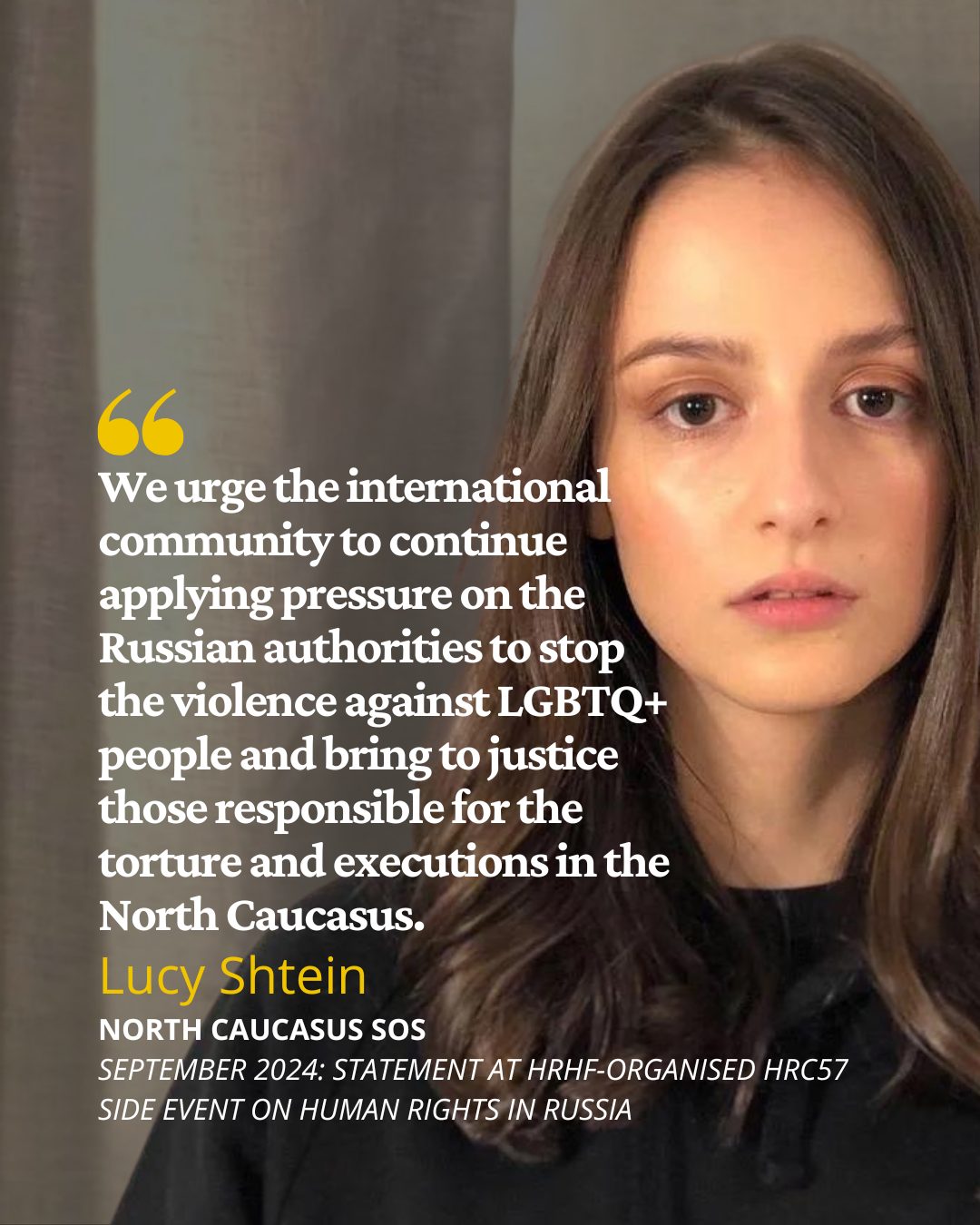
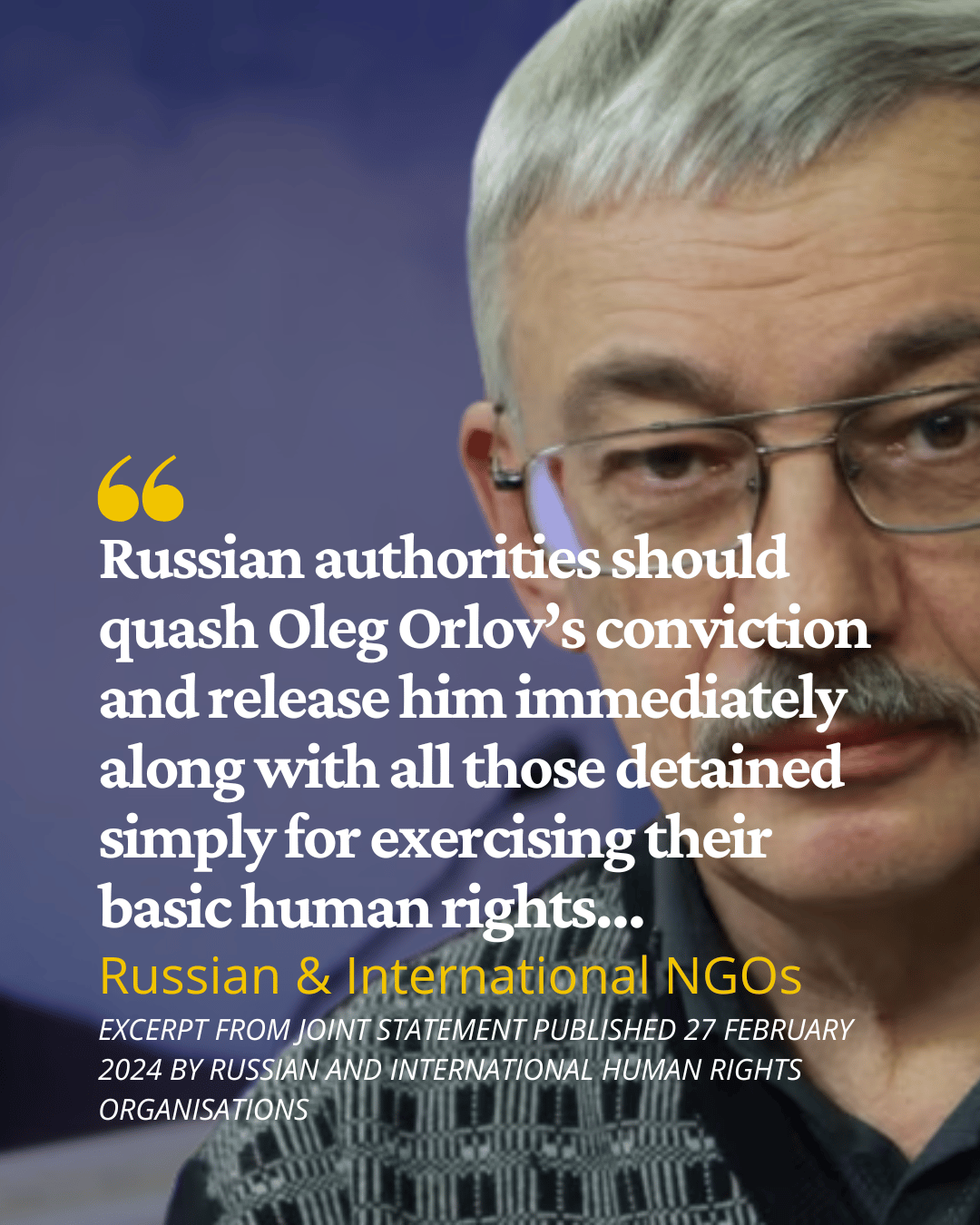
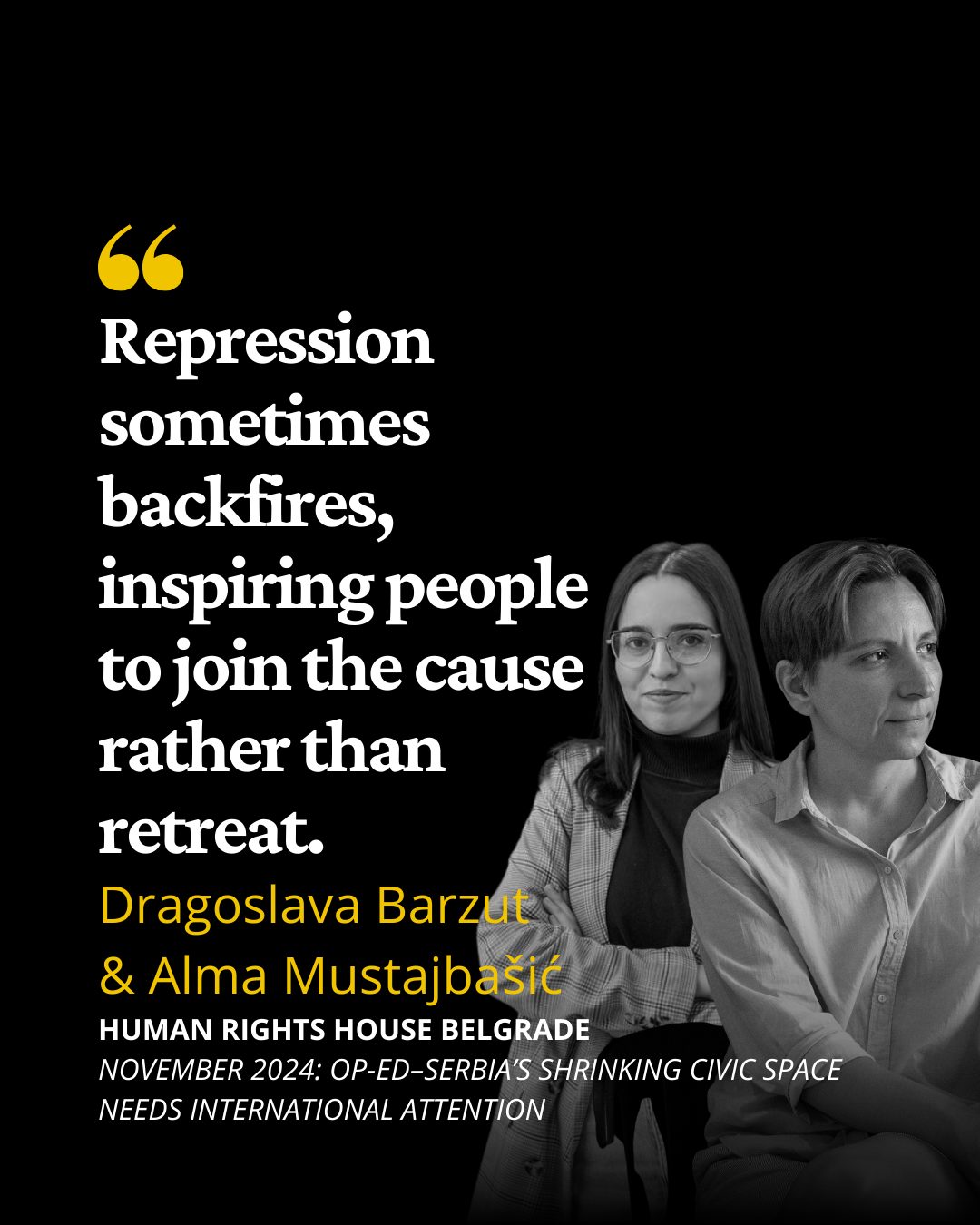
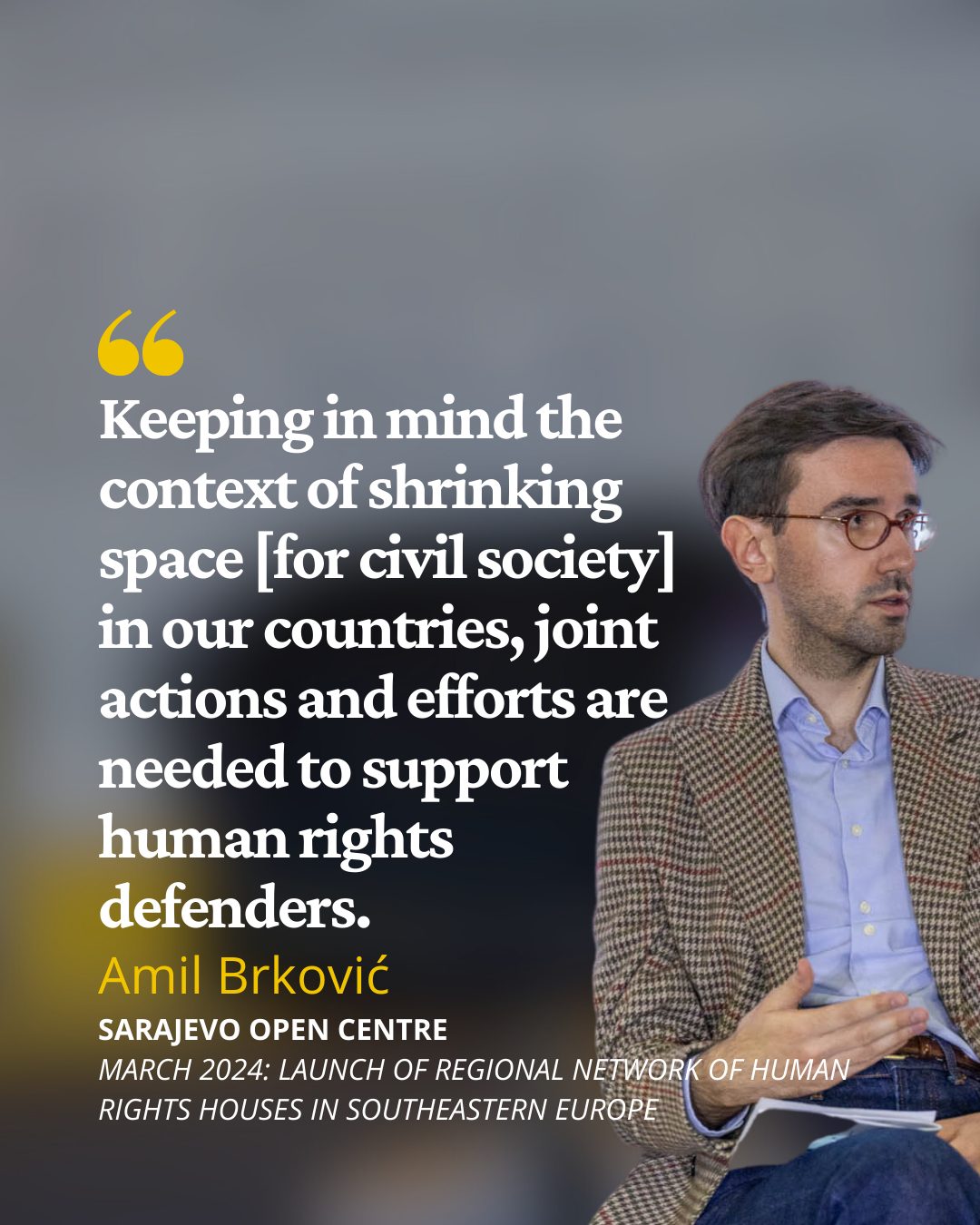
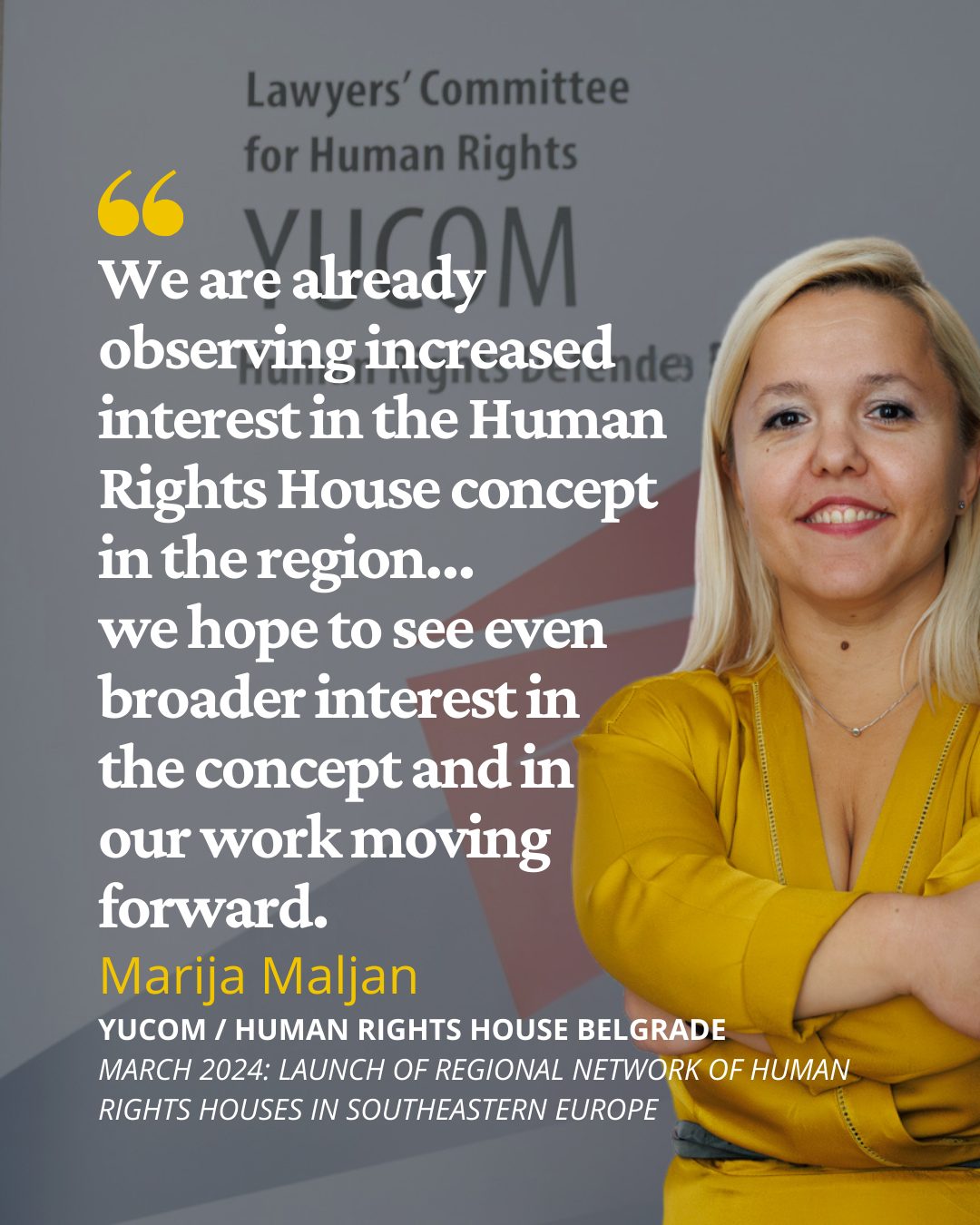
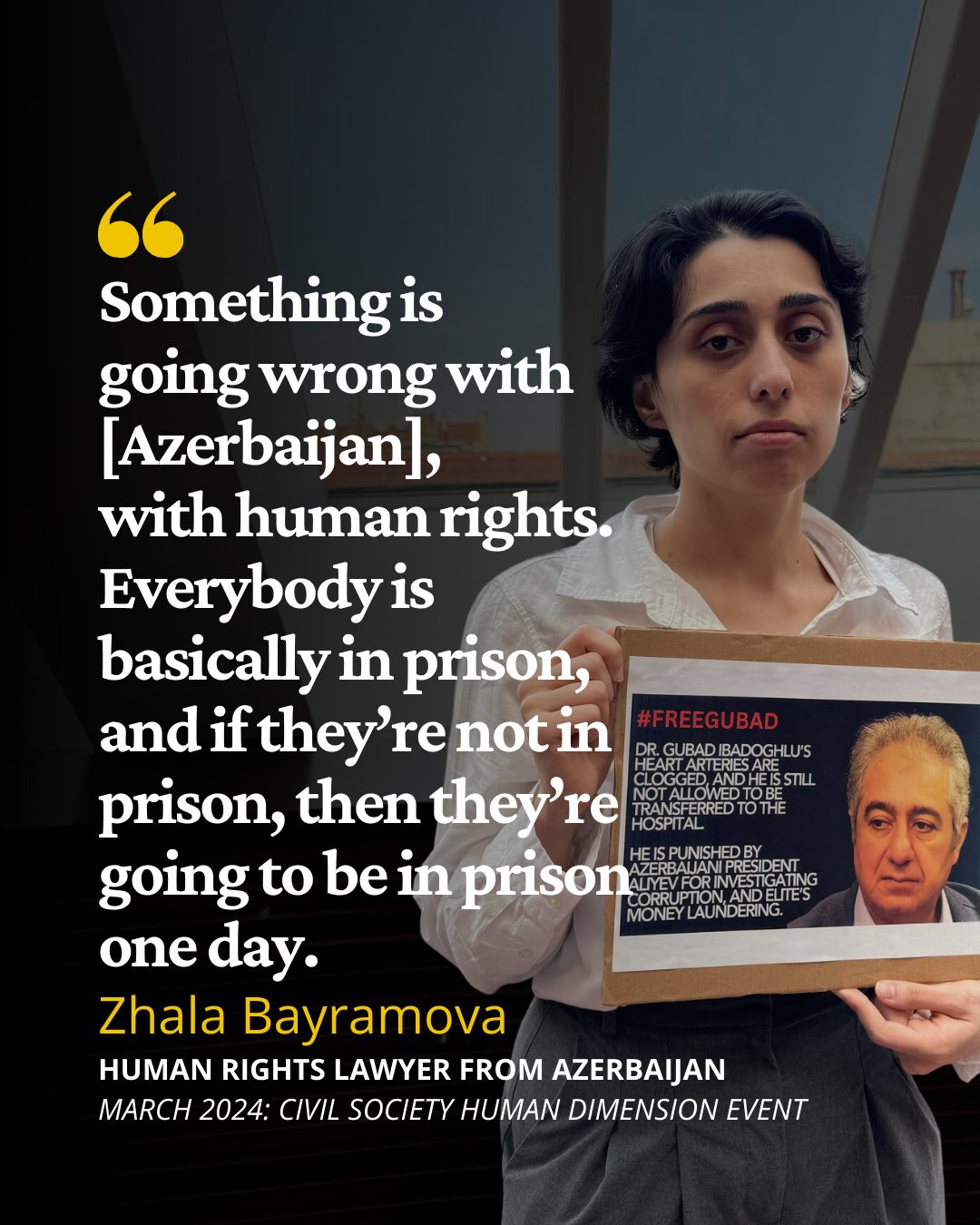
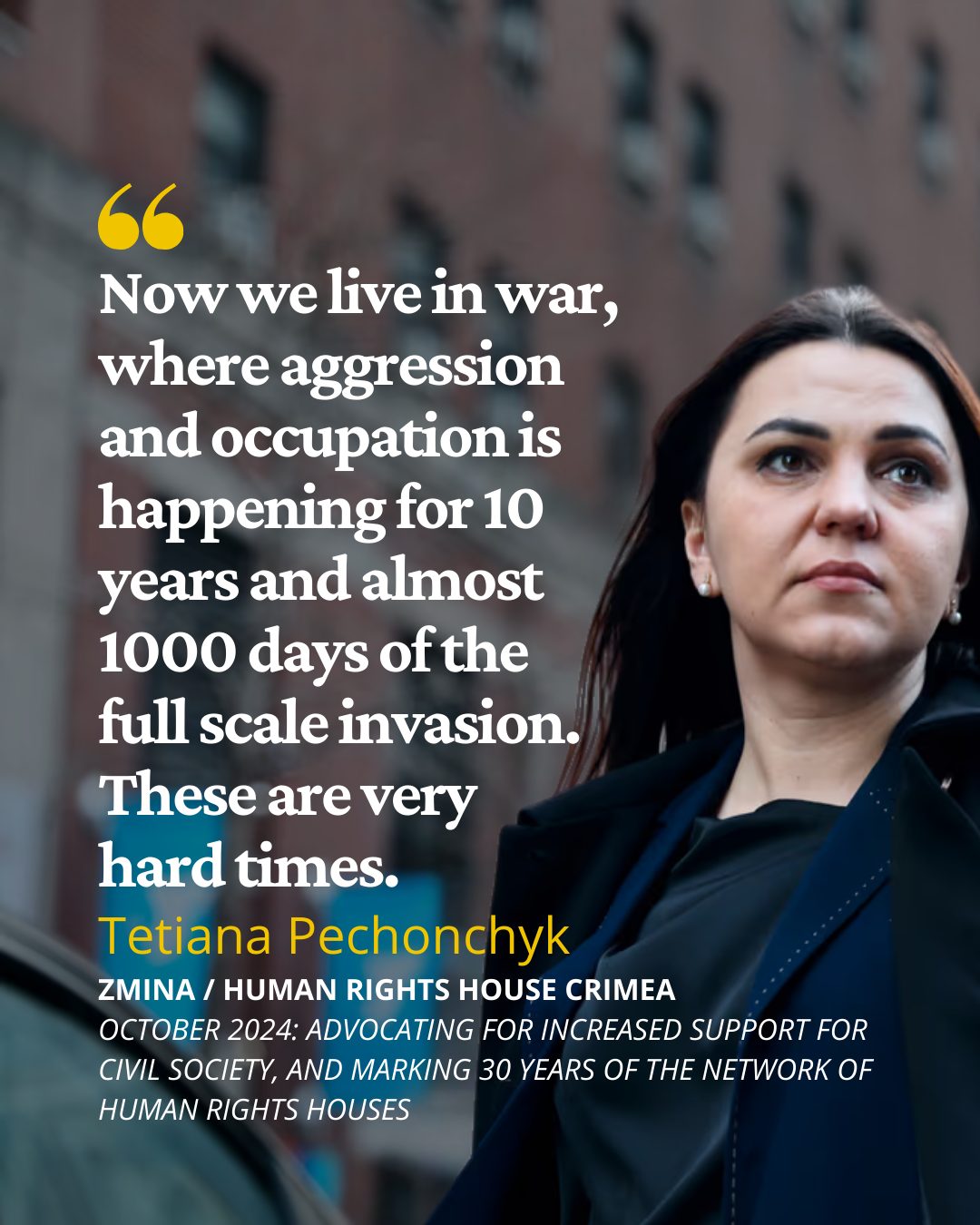
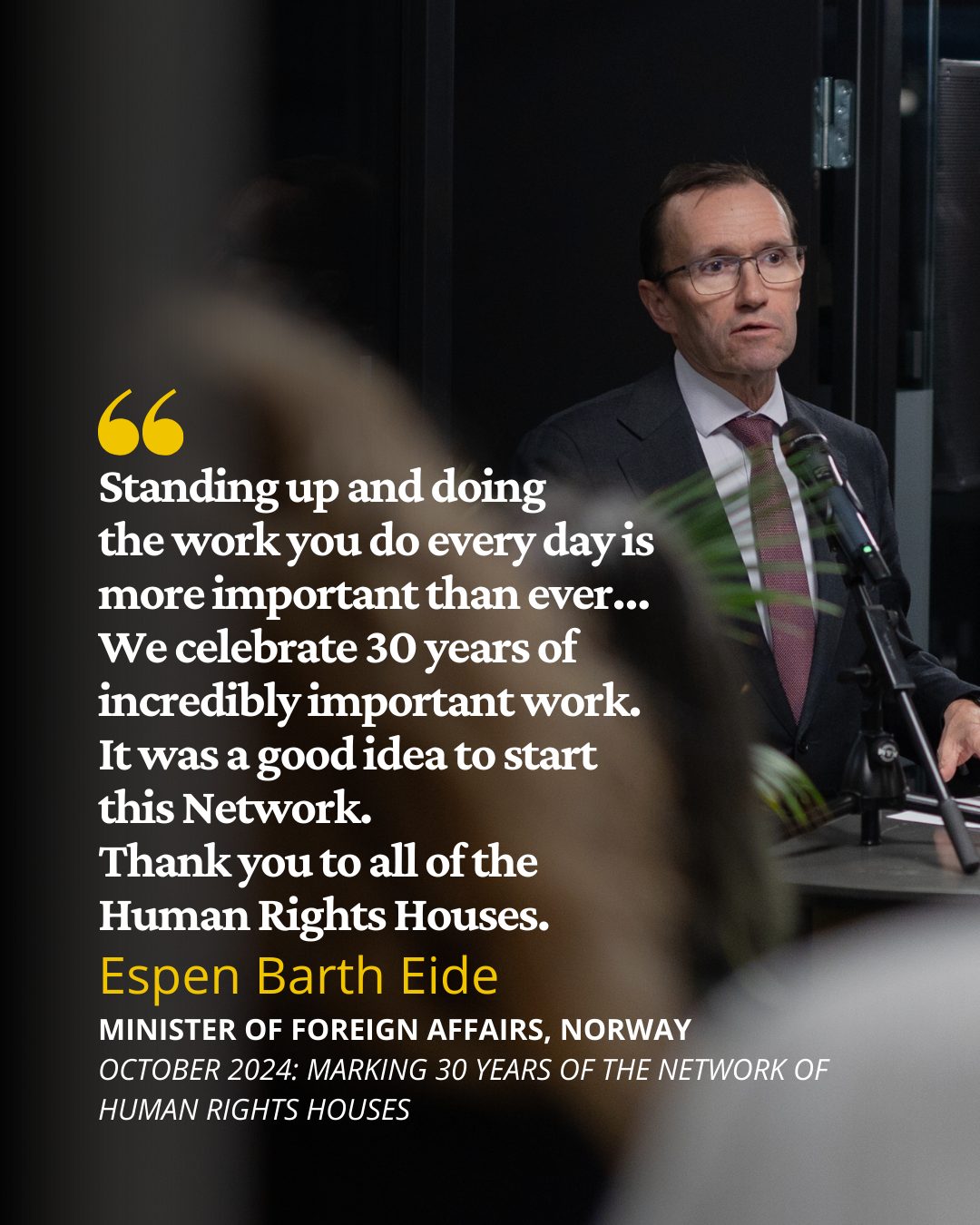
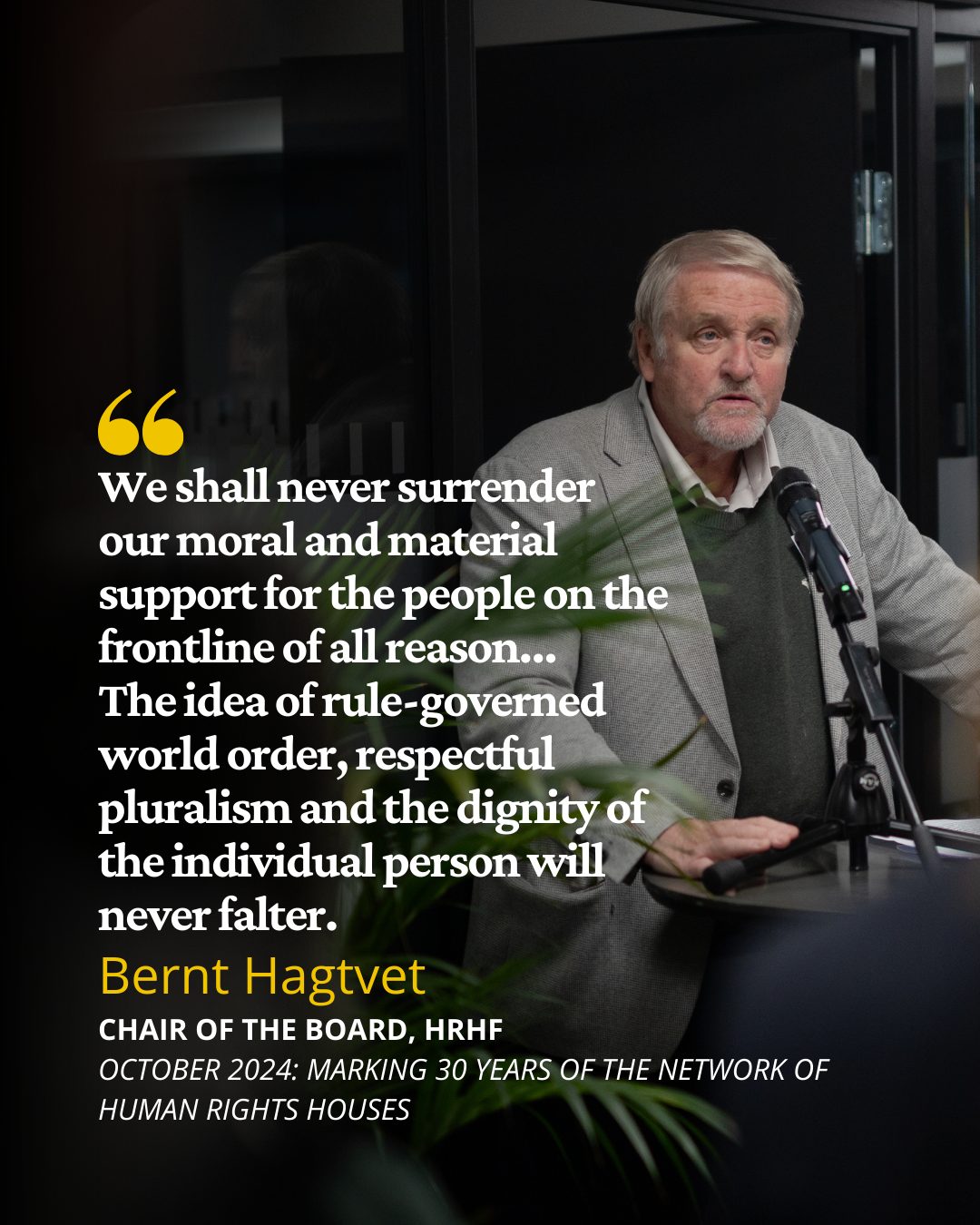
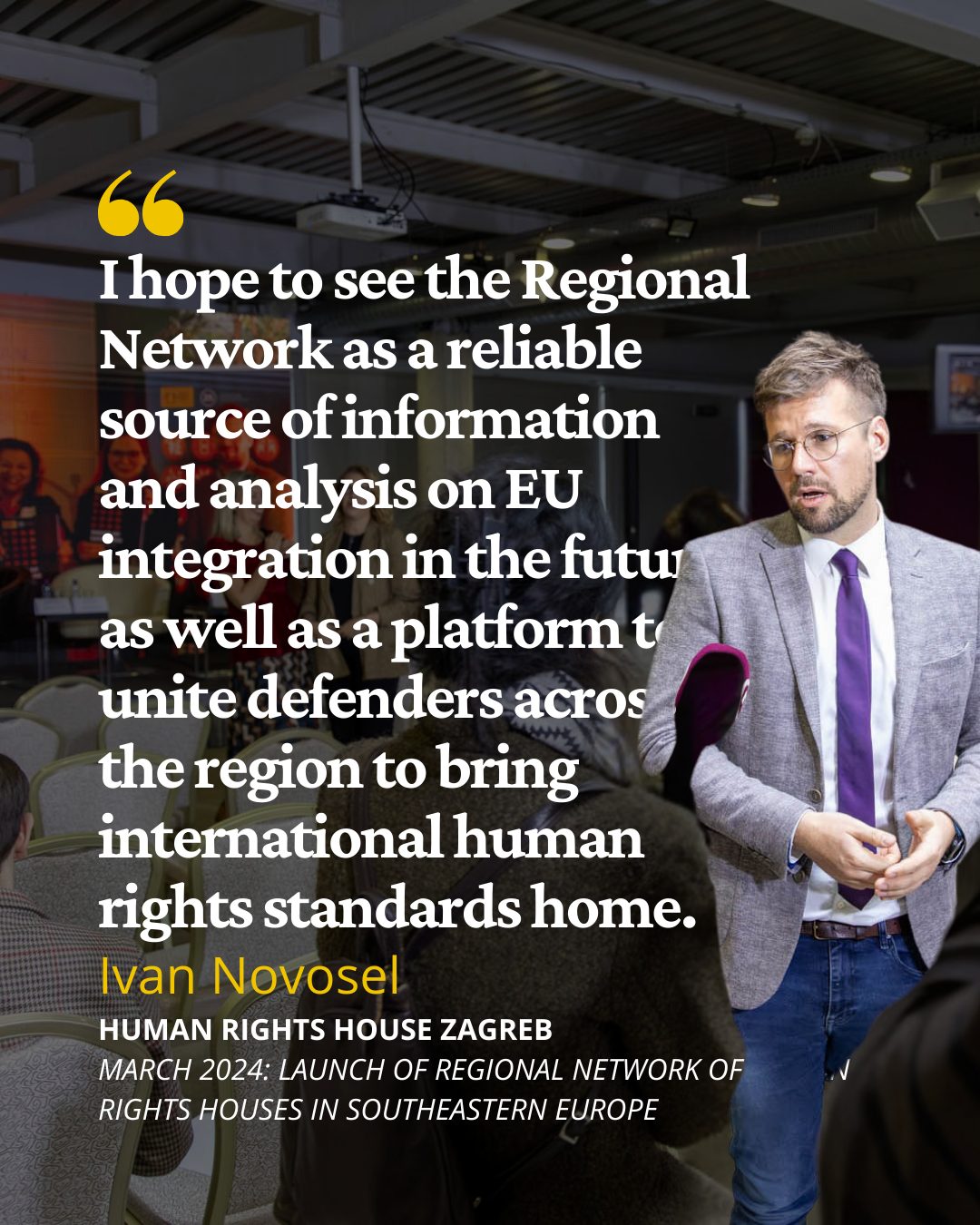
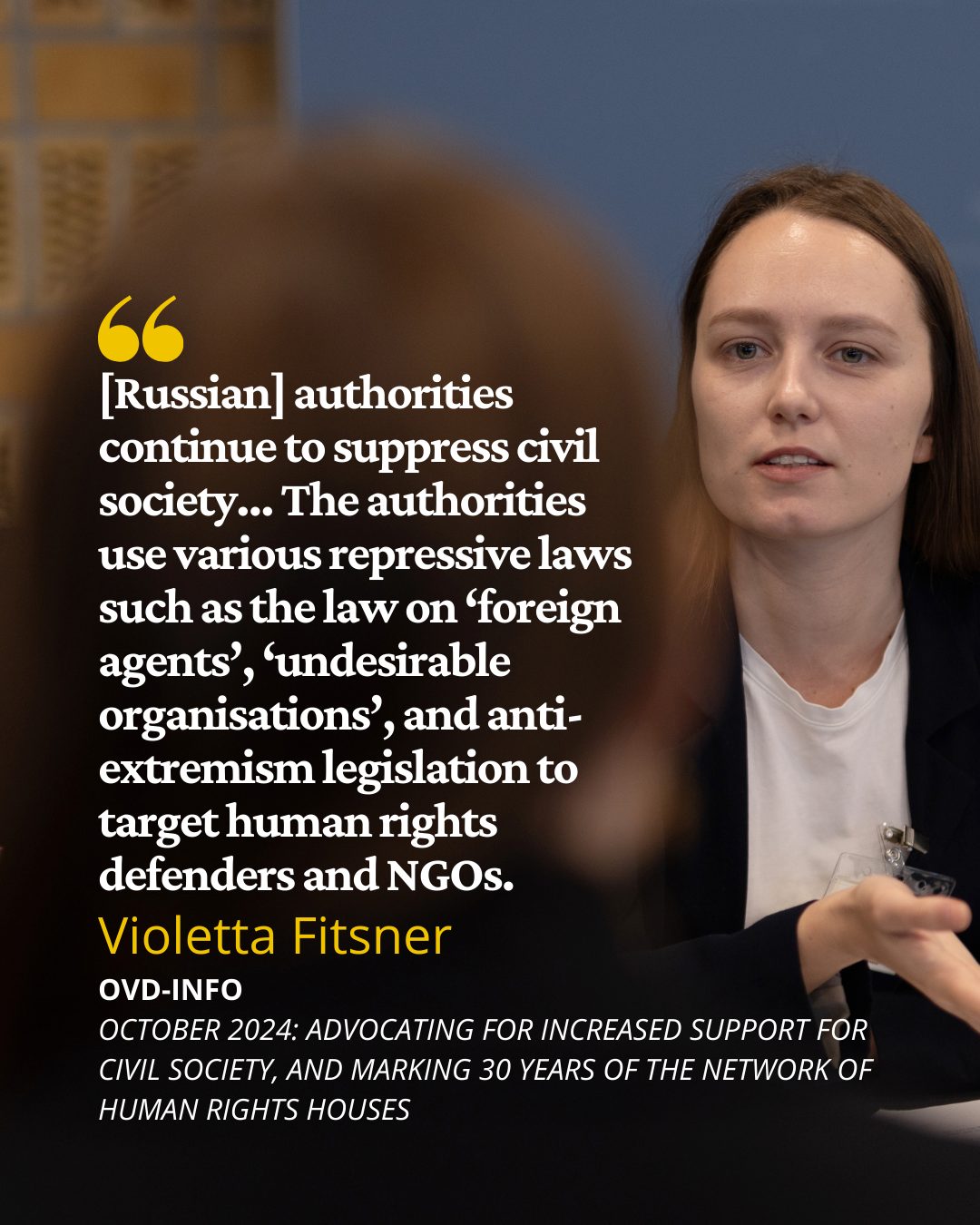
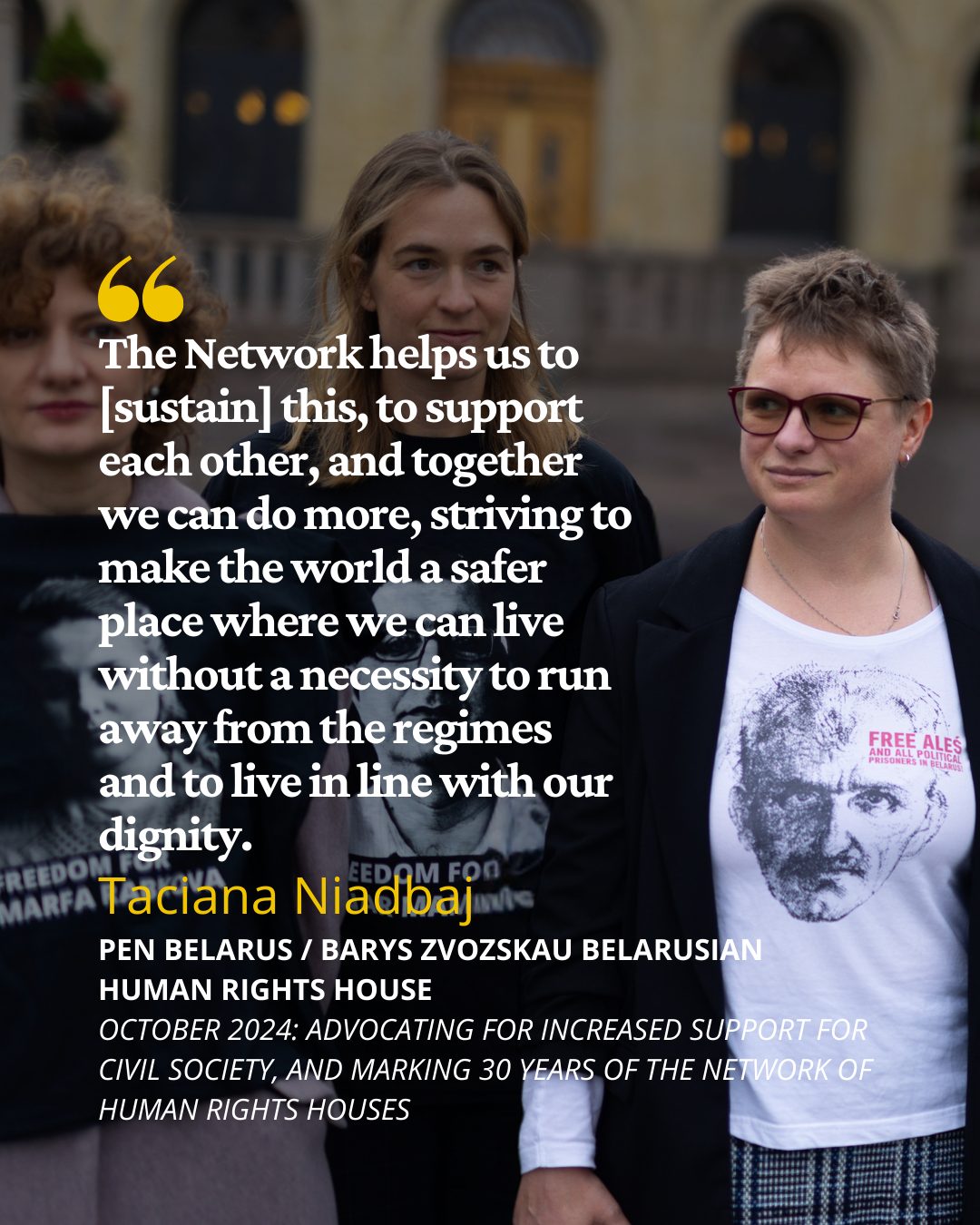
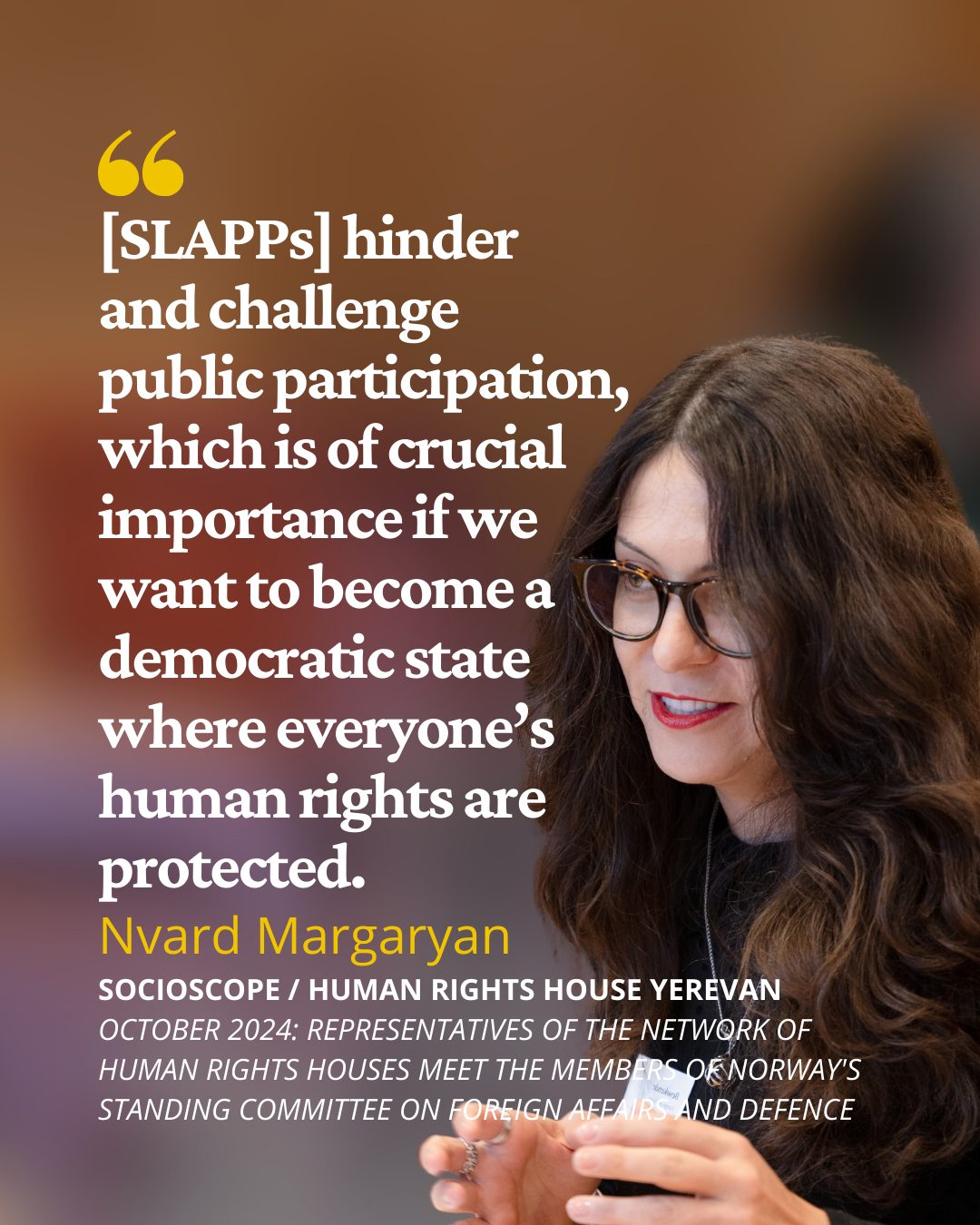
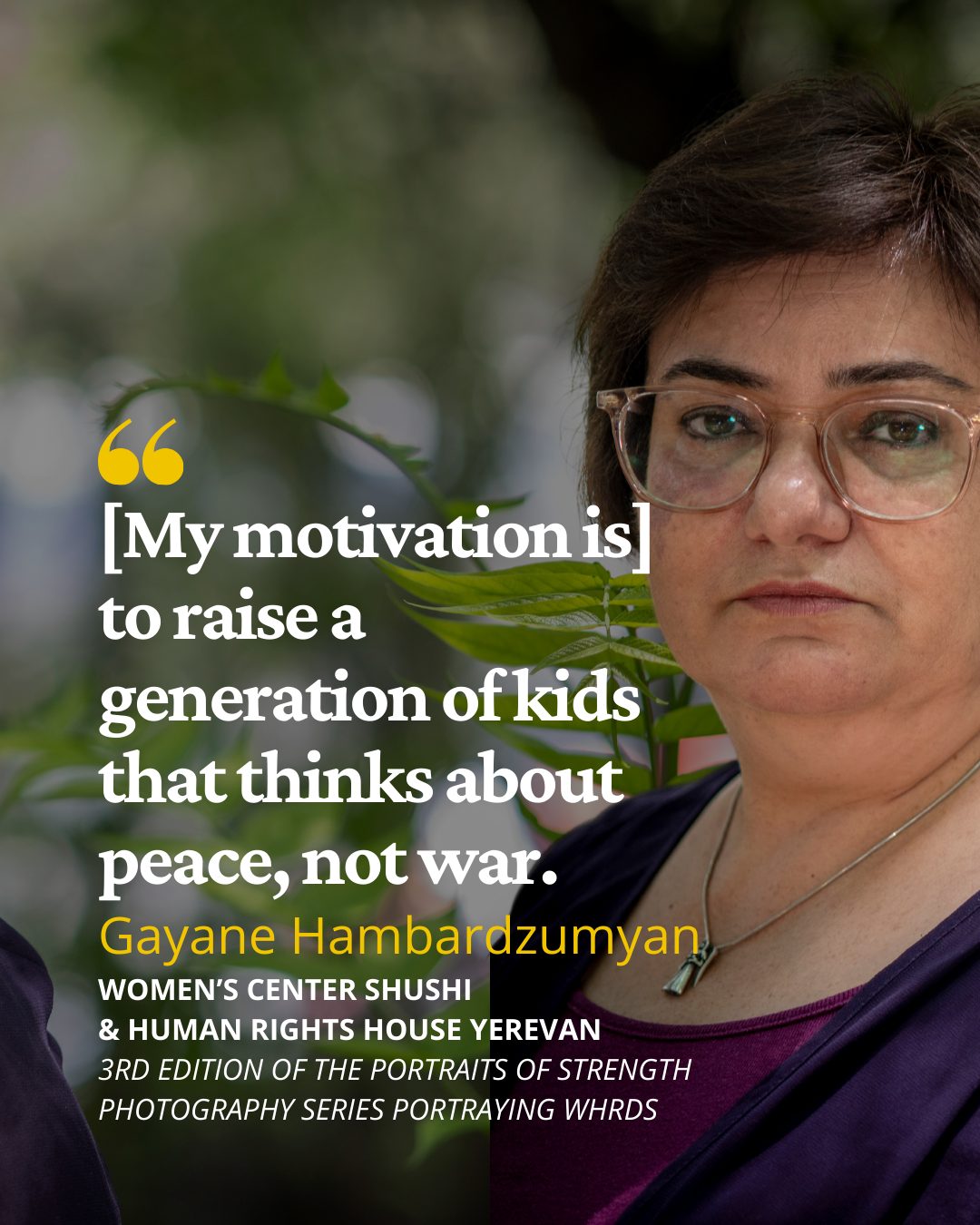

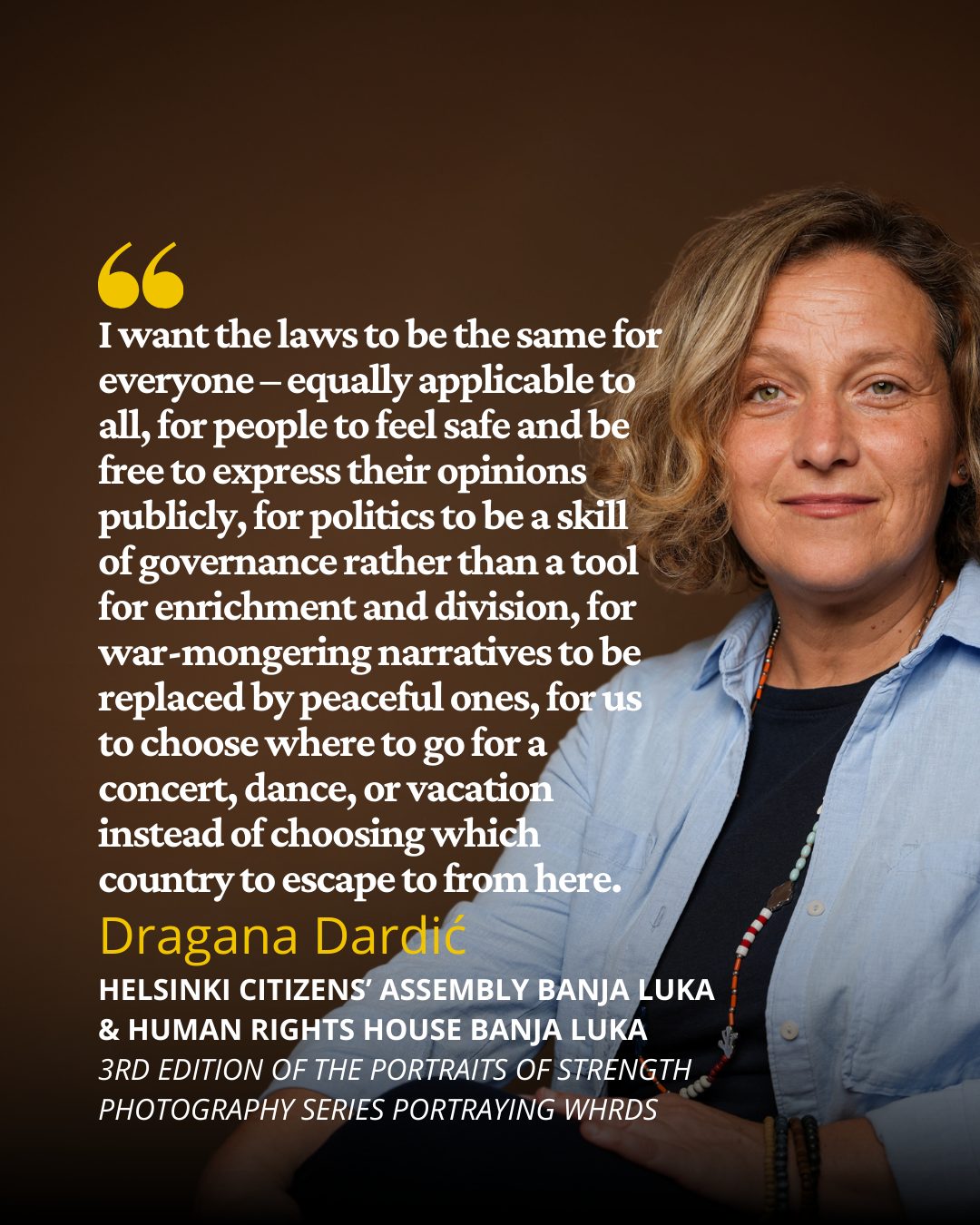
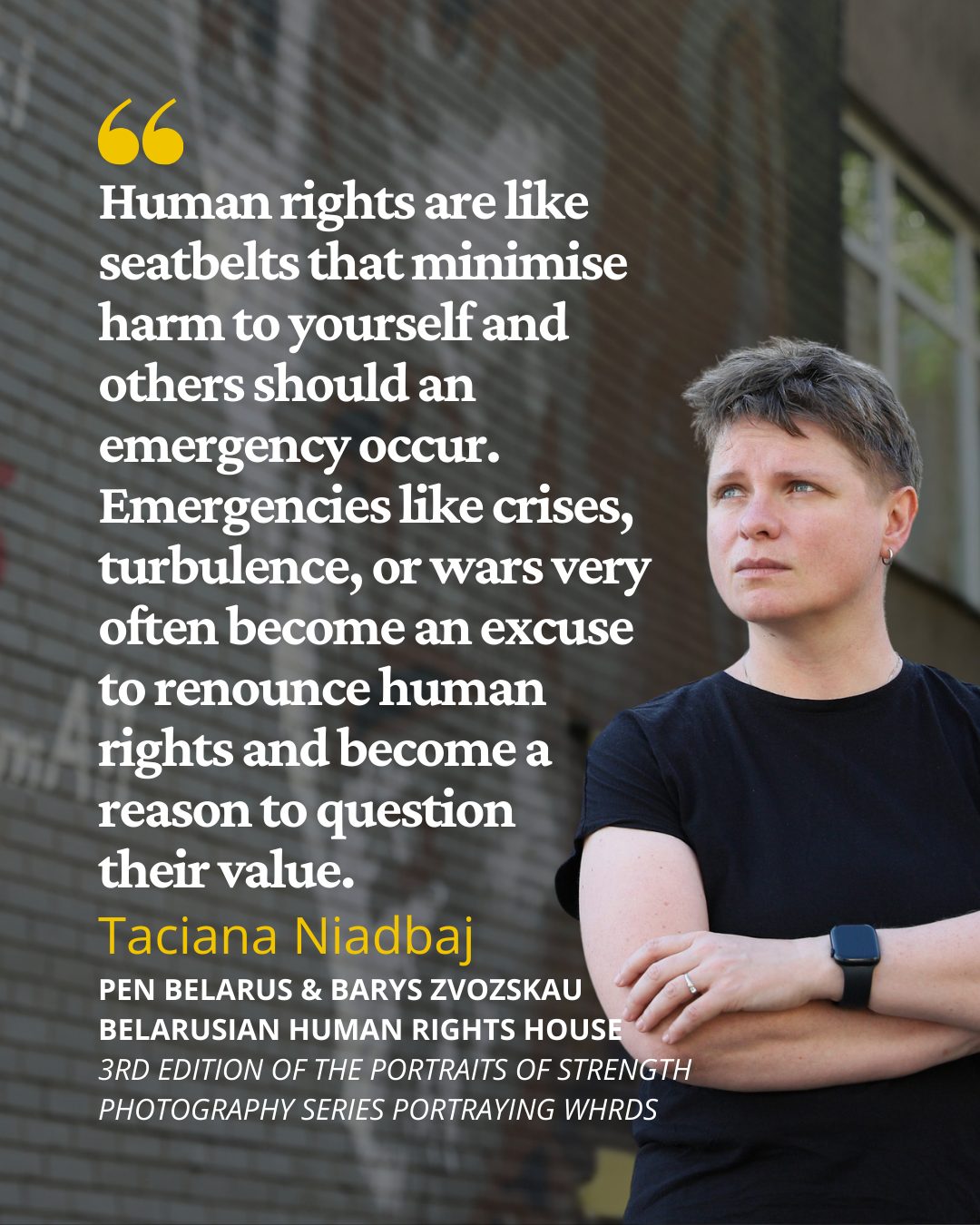
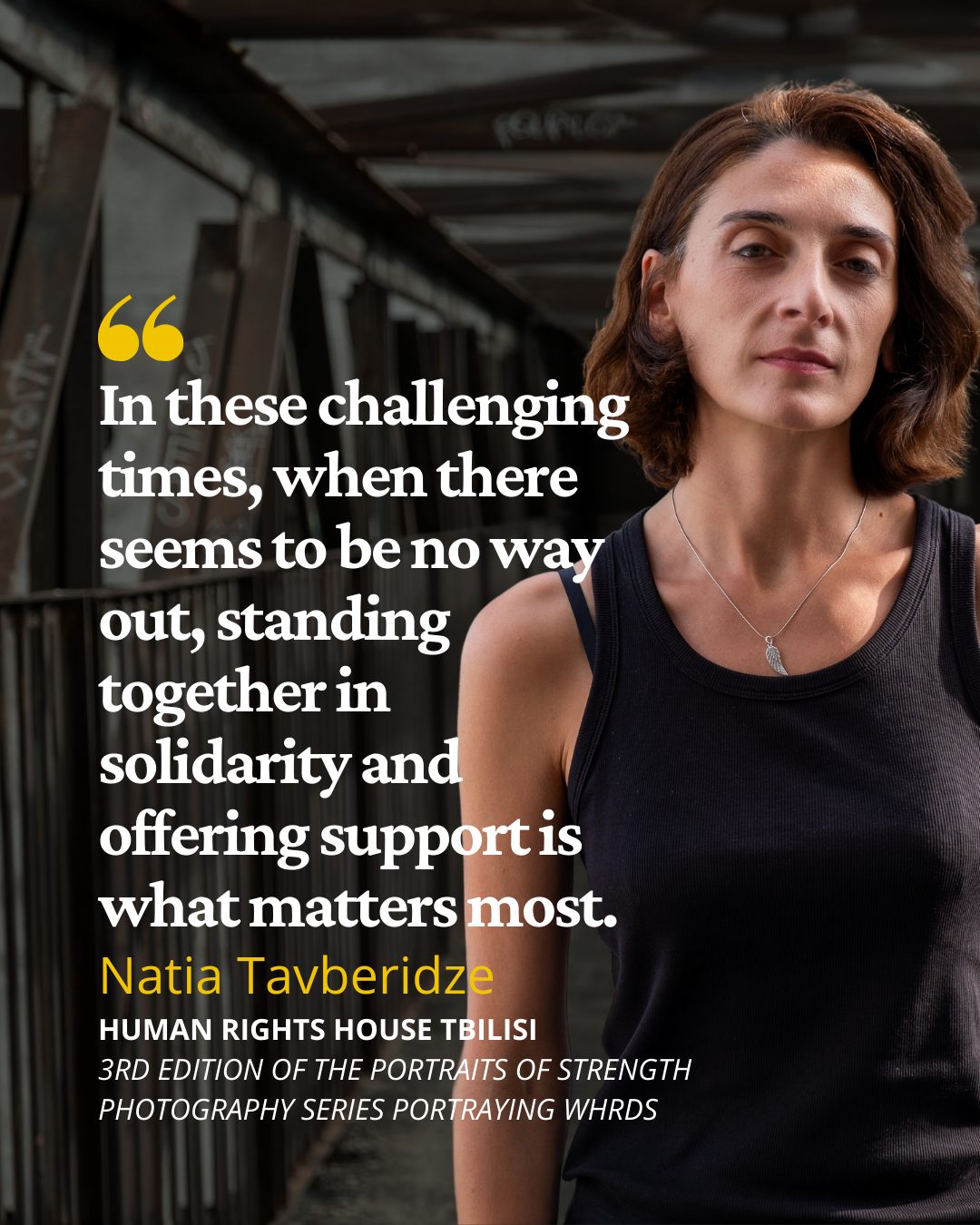
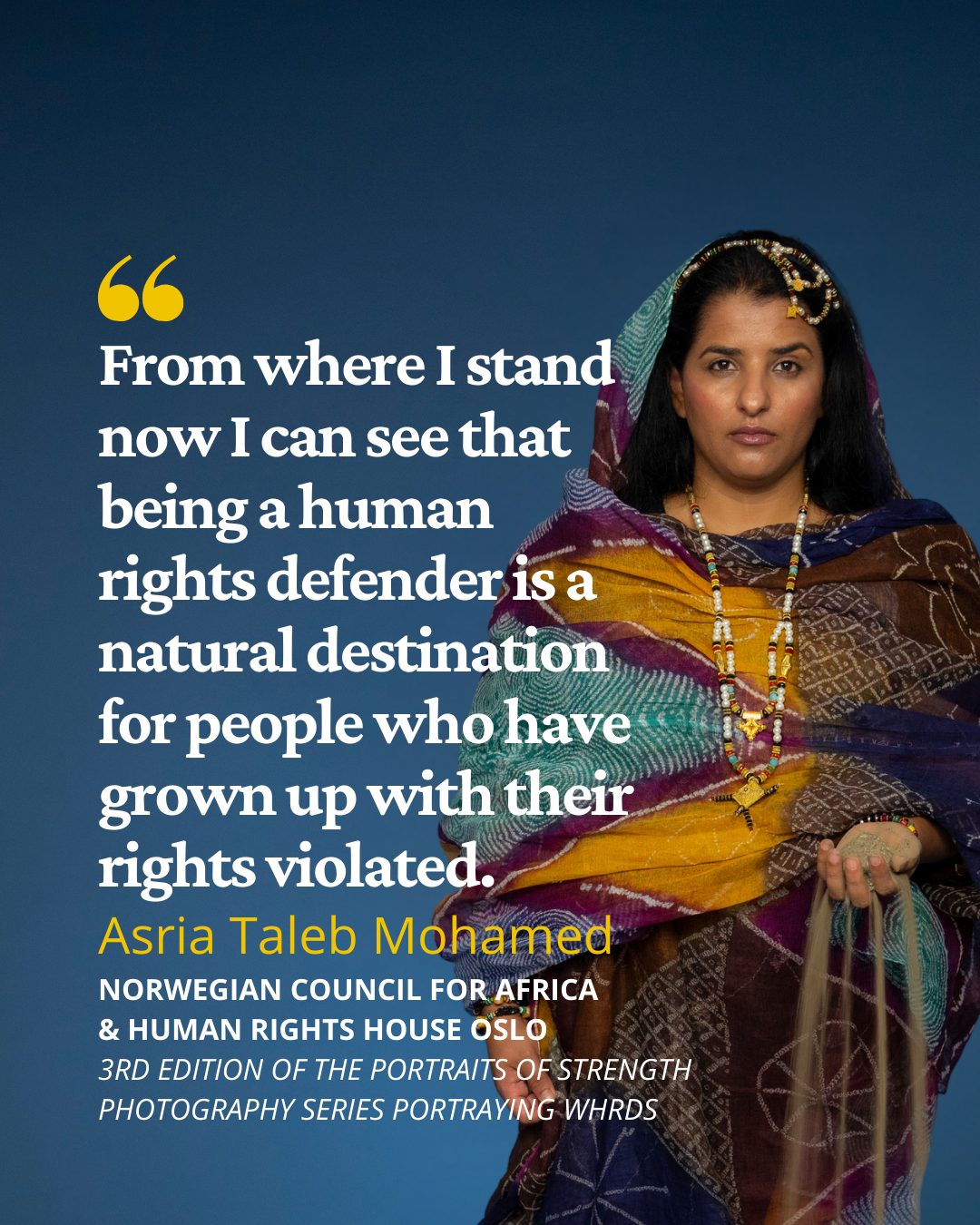
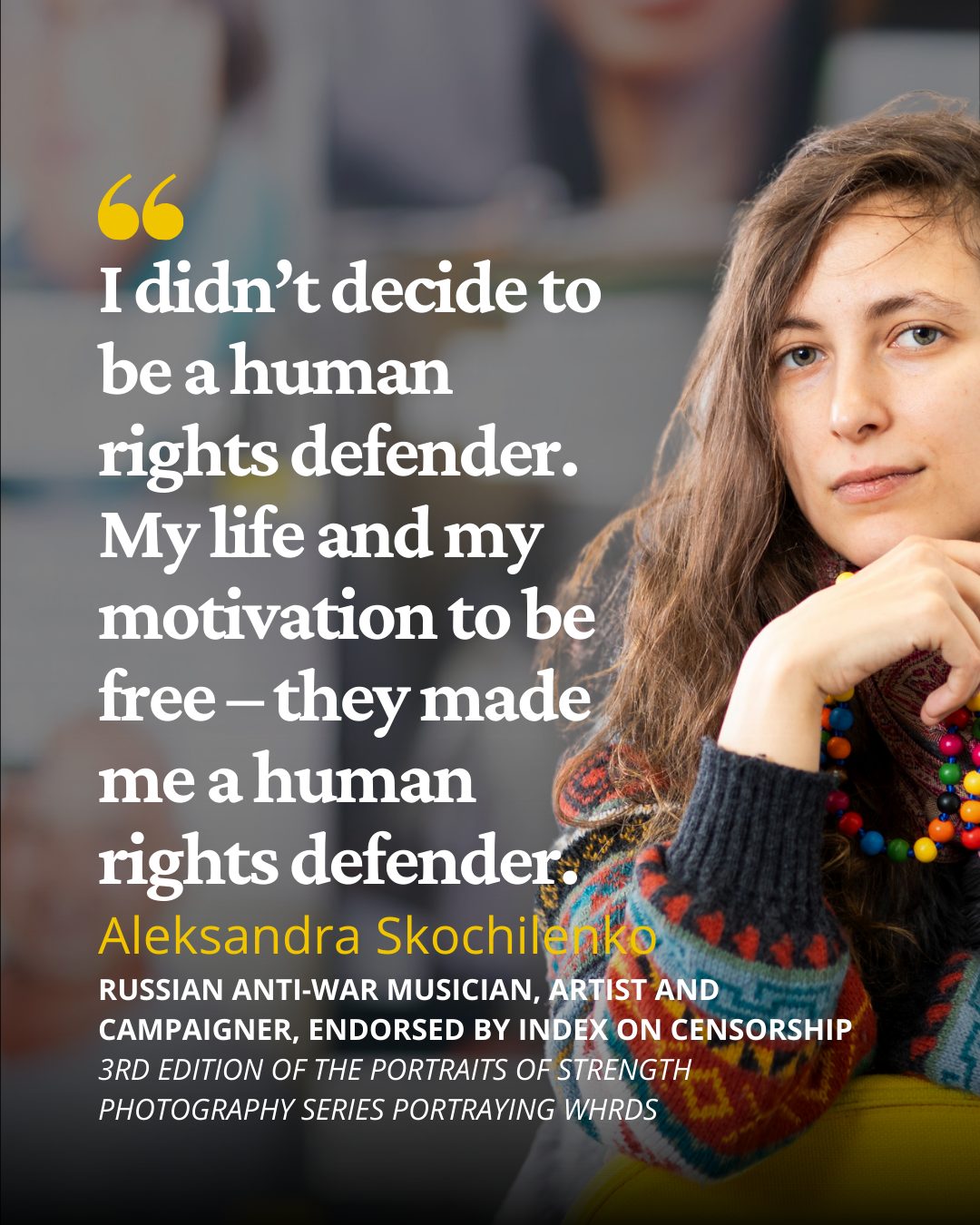
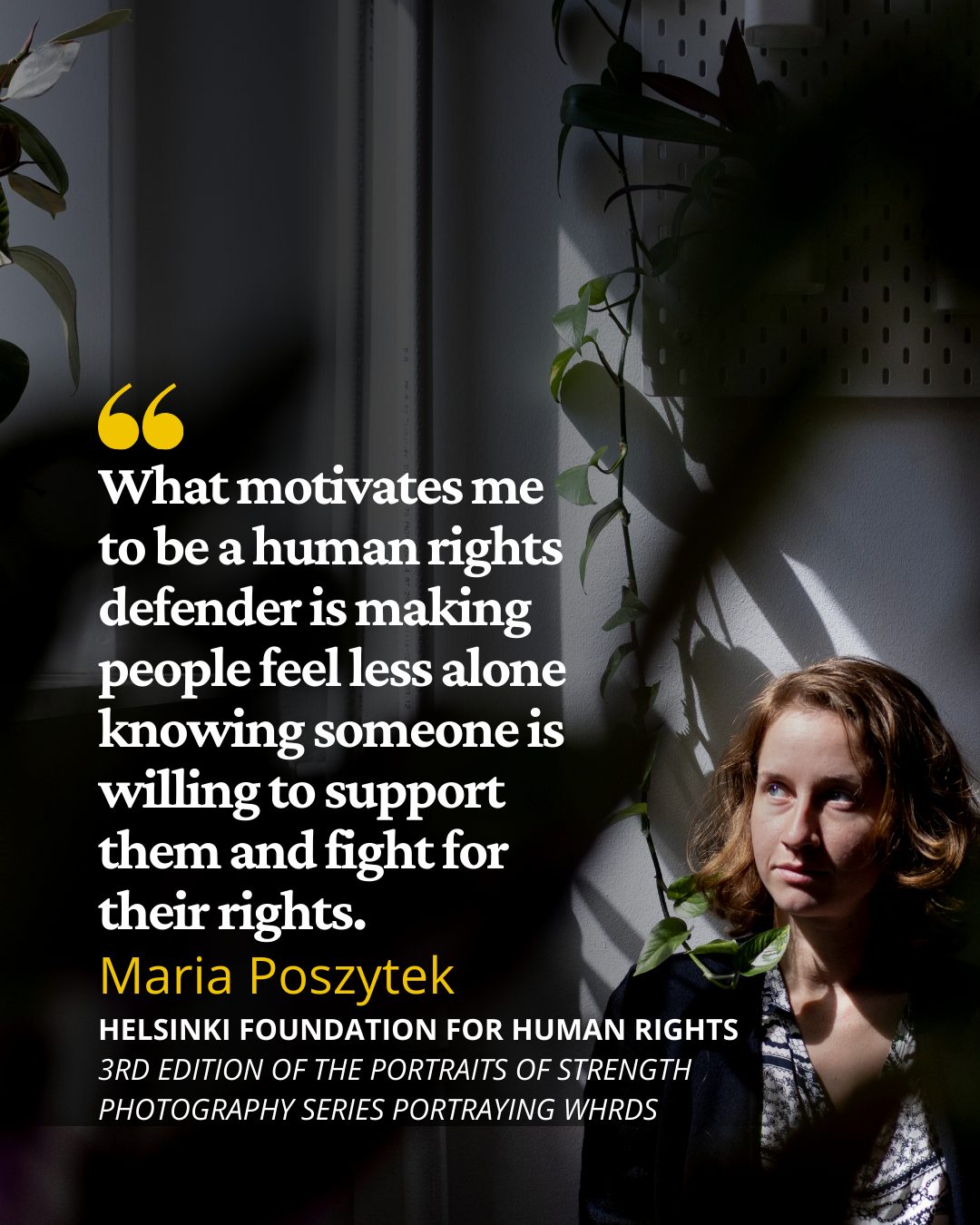
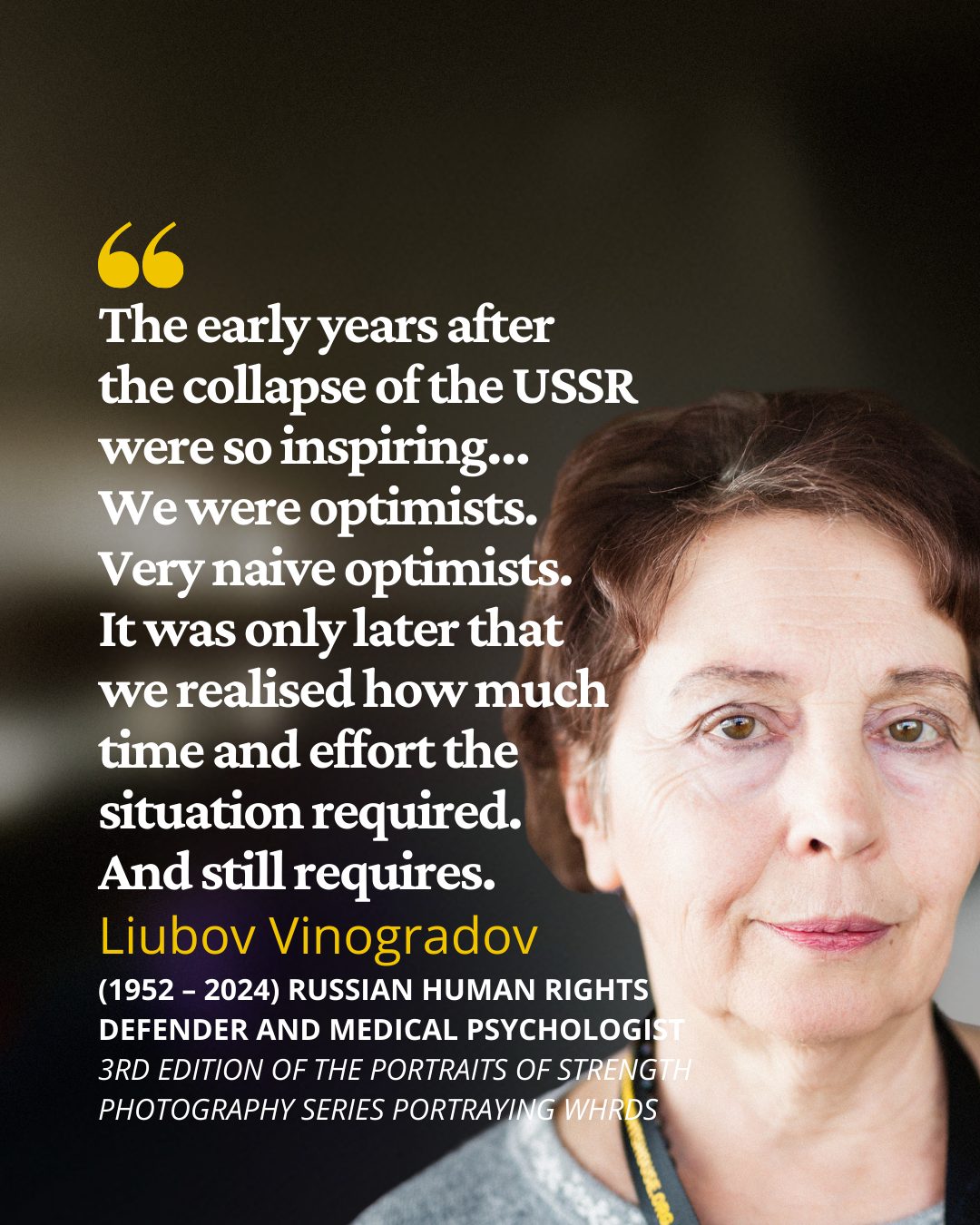
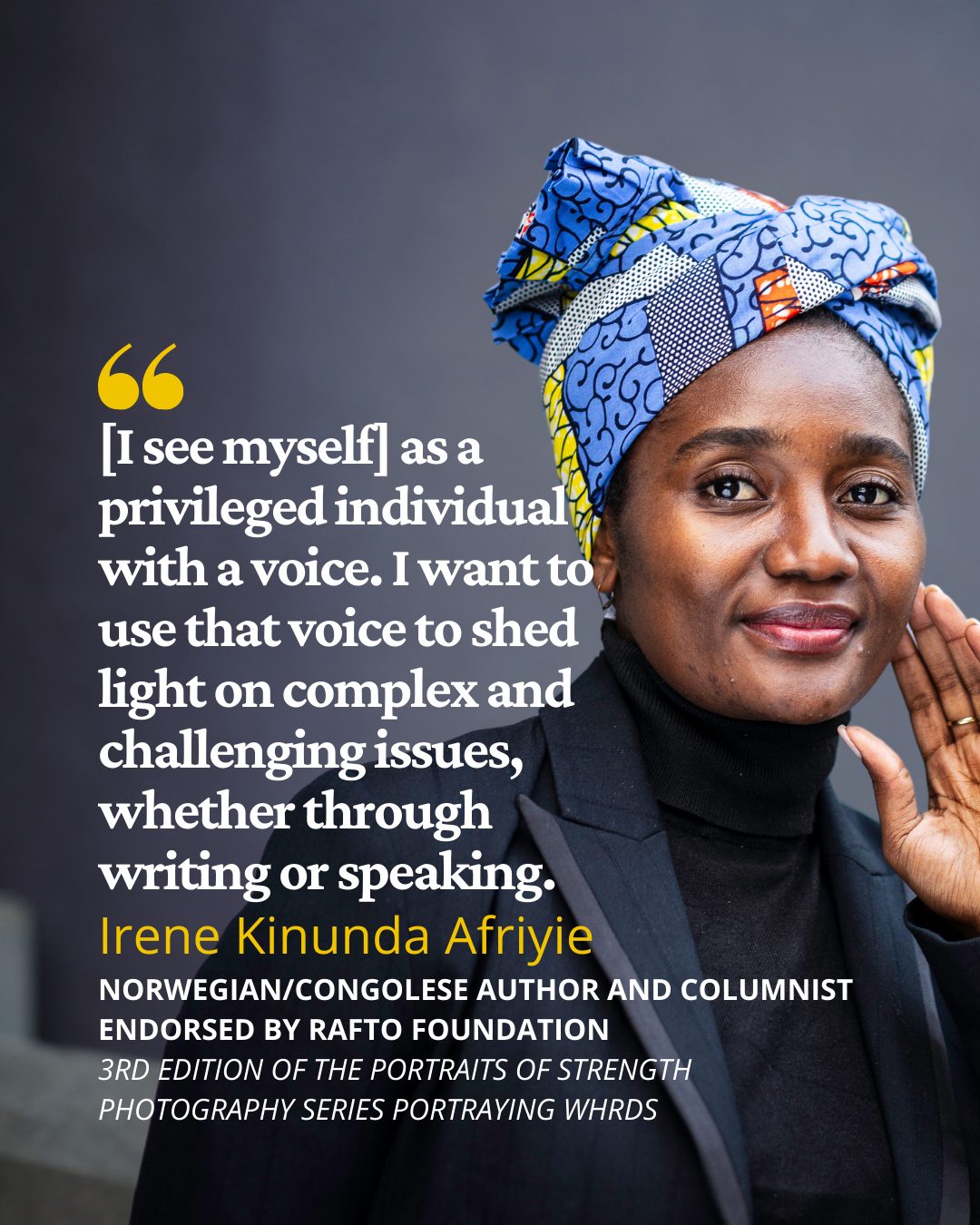
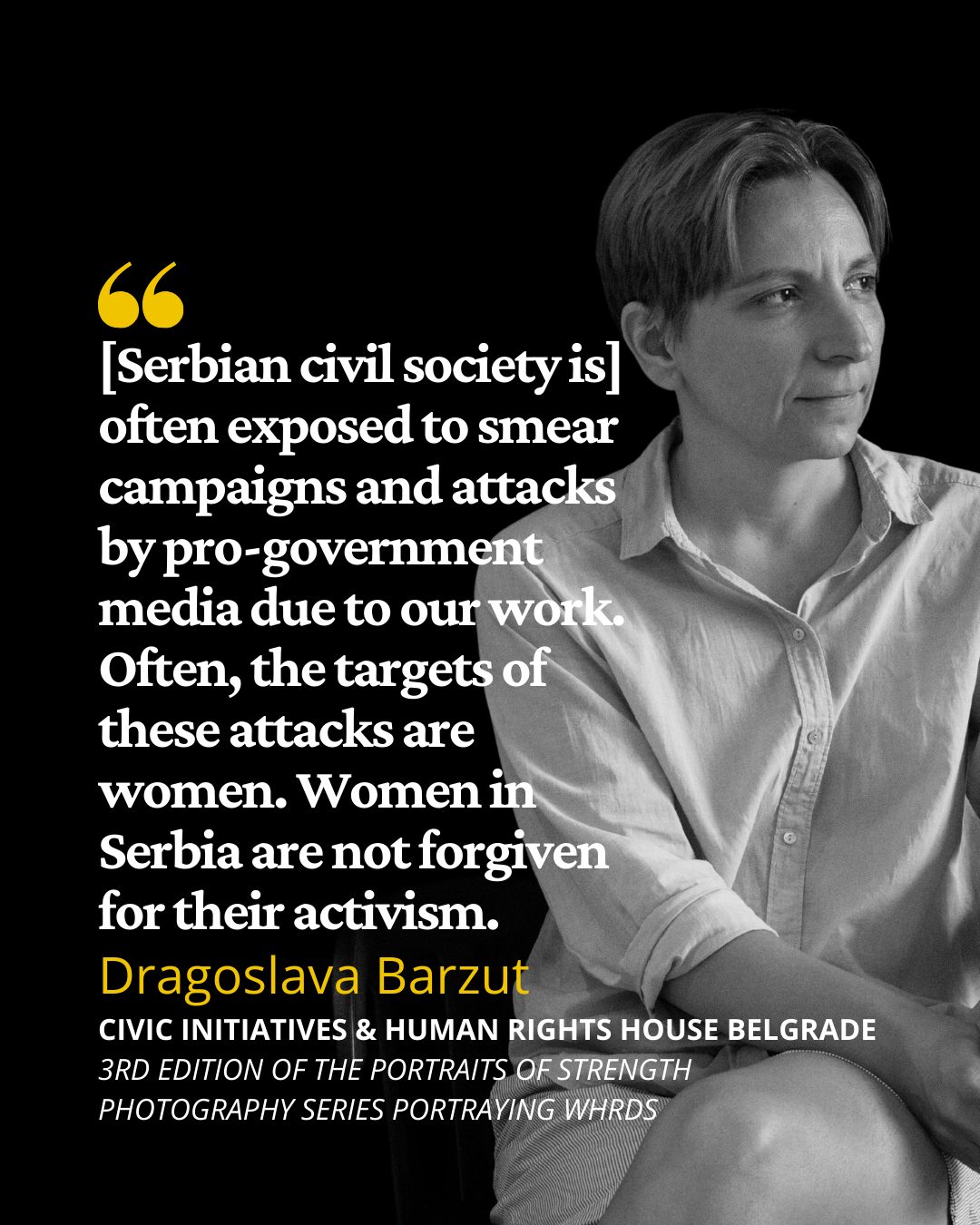

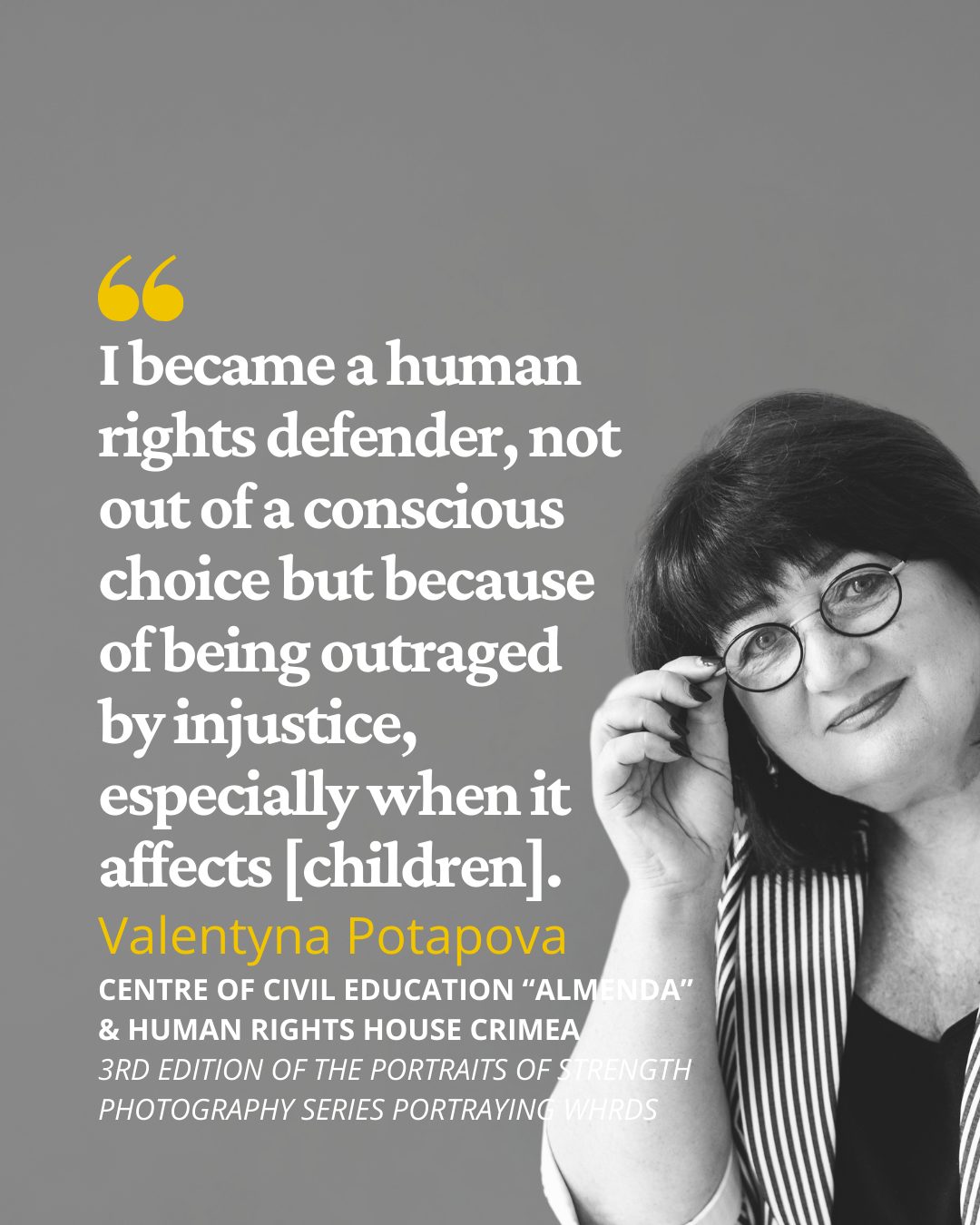
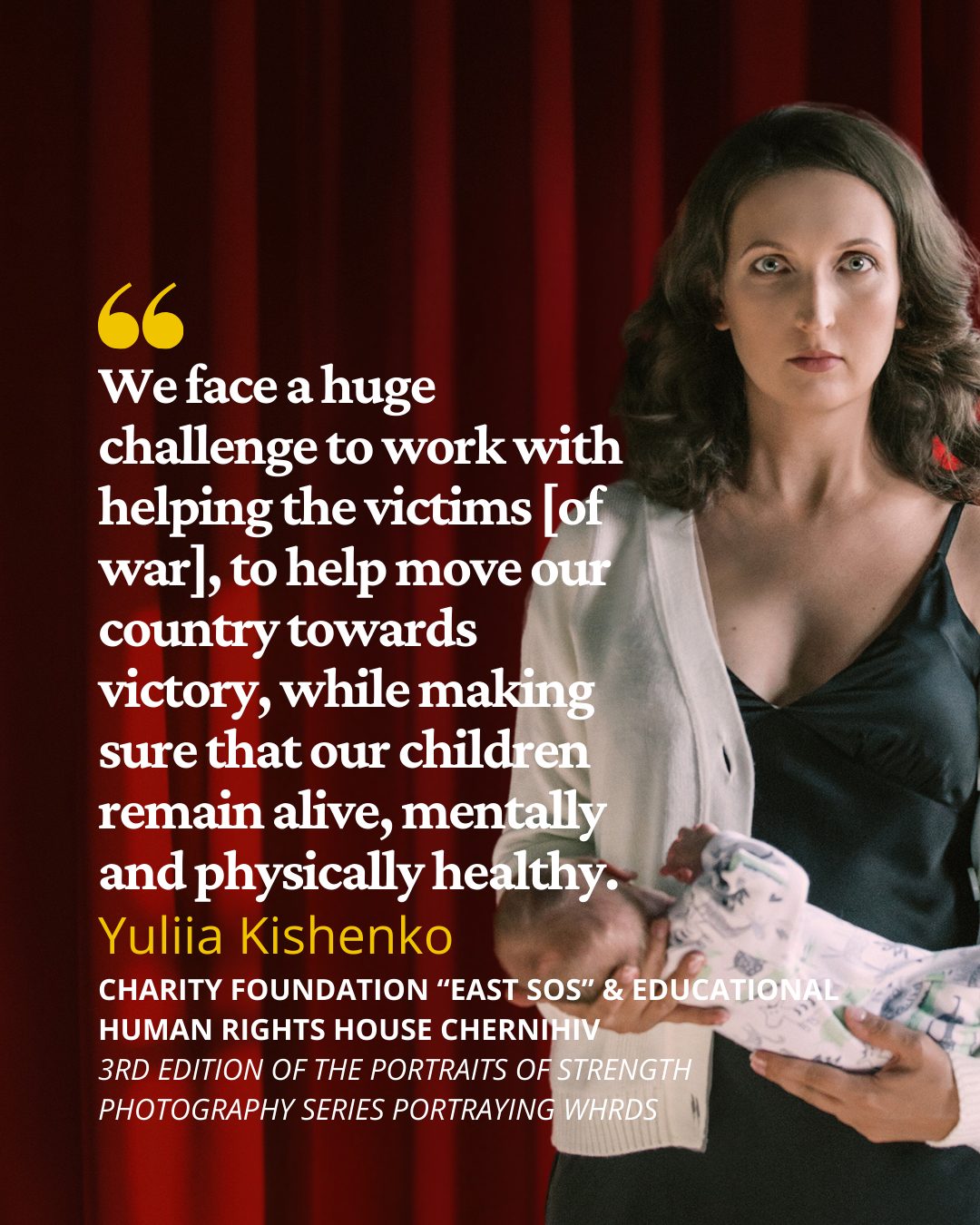
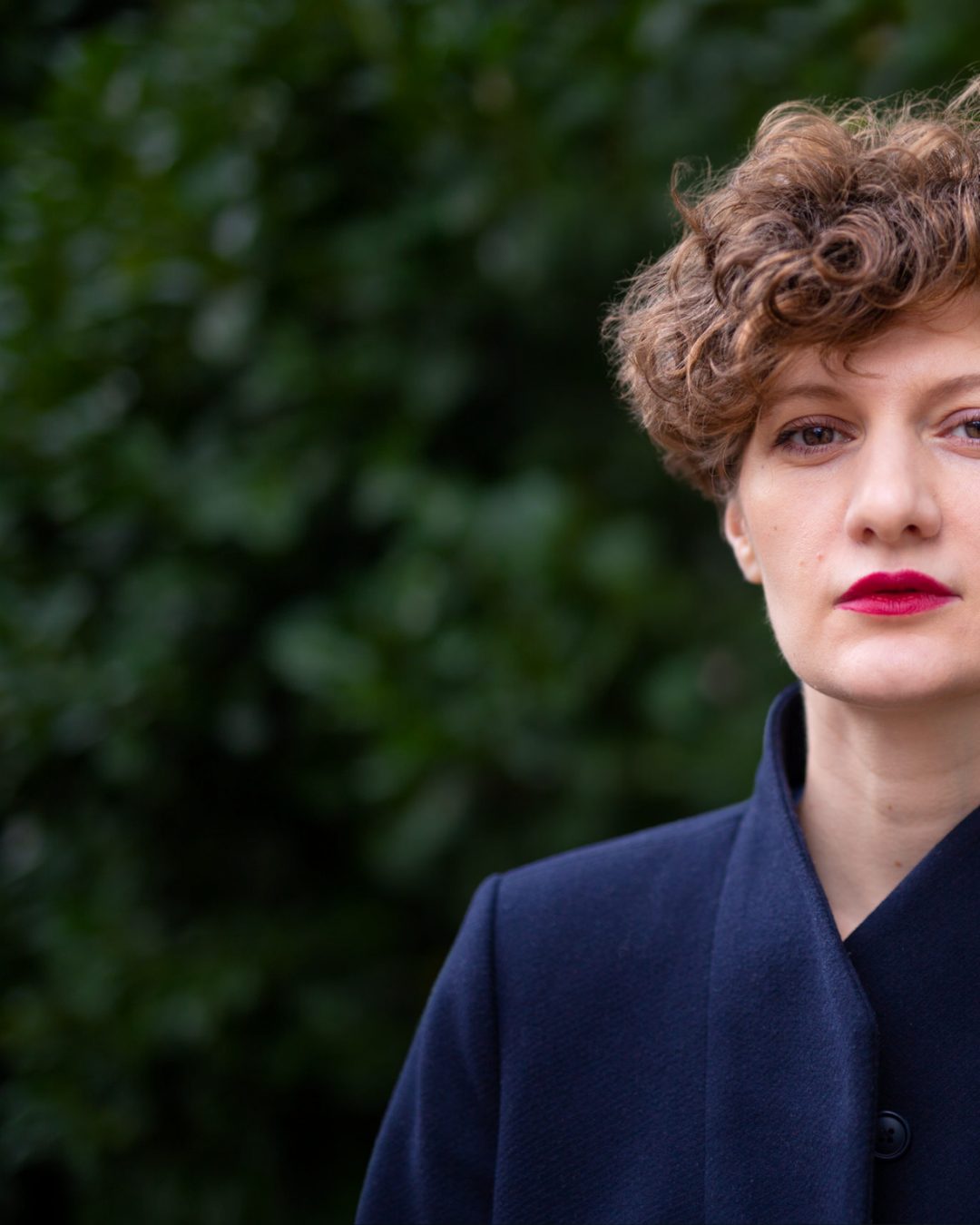
It’s not a problem for the authorities to make [Georgia’s ‘foreign agent’ law] more strict - closer to what Russia has now.
Baia Pataraia
Sapari /
Human Rights House Tbilisi
Excerpt from a July 2024 interview focused on unprecedented develops in Georgia.

It’s not a problem for the authorities to make [Georgia’s ‘foreign agent’ law] more strict - closer to what Russia has now.
Baia Pataraia
Sapari /
Human Rights House Tbilisi
Excerpt from a July 2024 interview focused on unprecedented develops in Georgia.

It’s not a problem for the authorities to make [Georgia’s ‘foreign agent’ law] more strict - closer to what Russia has now.
Baia Pataraia
Sapari /
Human Rights House Tbilisi
Excerpt from a July 2024 interview focused on unprecedented develops in Georgia.
The year in pictures
February: Ukrainian civil society including representatives from Human Rights House Crimea meet with Pam Damoff, Parliamentary Secretary to the Minister of Foreign Affairs of Canada, at HRC55.
July: Supported by HRHF, Human Rights House Zagreb participates in the UN Human Rights Committee’s review of Croatia. Left-right: Kety Abashidze and Matthew Jones (HRHF), and Ivan Novosel (Human Rights House Zagreb).
November: Members of the Regional Network of Human Rights Houses in Southeastern Europe briefed CoE Ambassadors s part of their report launch on the situation of HRDs in the region. Left-right: Tina Đaković and Ivan Novosel (Human Rights House Zagreb), Dragana Dardić (Helsinki Citizens’ Assembly Banja Luka & Human Rights House Banja Luka), and Daiva Petkevičiūtė (HRHF).
HRHF-organised side events gave Network members a platform to share their expertise and advocacy calls with States. A side event with the UN Special Rapporteur on freedom of association and assembly at HRC55 pictured. Left-right: Gina Romero (UN Special Rapporteur on freedom of association & assembly), Kety Abashidze (HRHF), Arzu Geybulla (Azerbaijani journalist & HRD), Baia Pataraia (Sapari & Human Rights House Tbilisi), Ivana Korajlić (Transparency International BiH, Human Rights House Banja Luka)
April: Belarusian partners, HRHF, and People In Need conducted an advocacy round with EU member states to push for the creation of the Independent Group of Experts on Belarus. Left-right:Kanstantin Staradubets (Viasna), Darya Rubleuskaya (human rights defender, Belarus), Maria Pavlovec (People in Need), Nora Wehofsits (HRHF).
Educational Human Rights House Chernihiv’s famous cat poses for the camera.
November: Partners from HRH Banja Luka participated in the 2024 UPR of Bosnia & Herzegovina.
March: Anar Mammadli (pictured with HRHF’s Kety Abashidze), head of EMDS in Azerbaijan, in Geneva to speak at an HRHF-organised side event at the UNHRC. He was arrested the following month and remains in pre-trial detention.
September: At HRC57, HRHF hosted a side event on Russia with LGBT+ and Indigenous rights defenders, among others, and called for the renewal of the mandate of the Special Rapporteur on Russia.
April: In Brussels, as part of the One World International Human Rights Film Festival, HRHF co-hosted a screening of Who, If Not Us? The Fight for Democracy in Belarus, followed by a panel with Viasna’s Darya Rubleuskaya and Kanstantsin Staradubets, and MEP Juozas Olekas. The event spotlighted human rights and political prisoners in Belarus, reinforcing calls for their release.
September: The Regional Network of Human Rights Houses in Southeastern Europe held a round table in Banja Luka on human rights within European integration, focusing on Bosnia and Herzegovina’s EU accession. Left-right: Marija Maljan (YUCOM / Human Rights House Belgrade), Ivan Novosel (Human Rights House Zagreb), Tea Pokrajčić (Human Rights House Banja Luka).
May: Representatives of Human Rights House Tbilisi meet with Bergljot Hovland, the Norwegian Ambassador to Georgia and Armenia.
November: HRHF’s Kateryna Oleinikova and Craig Jackson send postcards to political prisoners in Belarus and Azerbaijan written by members of the Network of Human Rights Houses
The third edition of the Portraits of Strength photo exhibition–featuring WHRDs from the Network of Human Rights Houses–was launched with events in Oslo, Kyiv, and Banja Luka marking the 30th anniversary of the Network of Human Rights Houses, International Women Human Rights Defenders Day, and Human Rights Day. These events were hosted by Human Rights House Foundation, as well as Human Rights Houses Banja Luka, Chernihiv, and Crimea. The series continues to be exhibited at events in 2025.
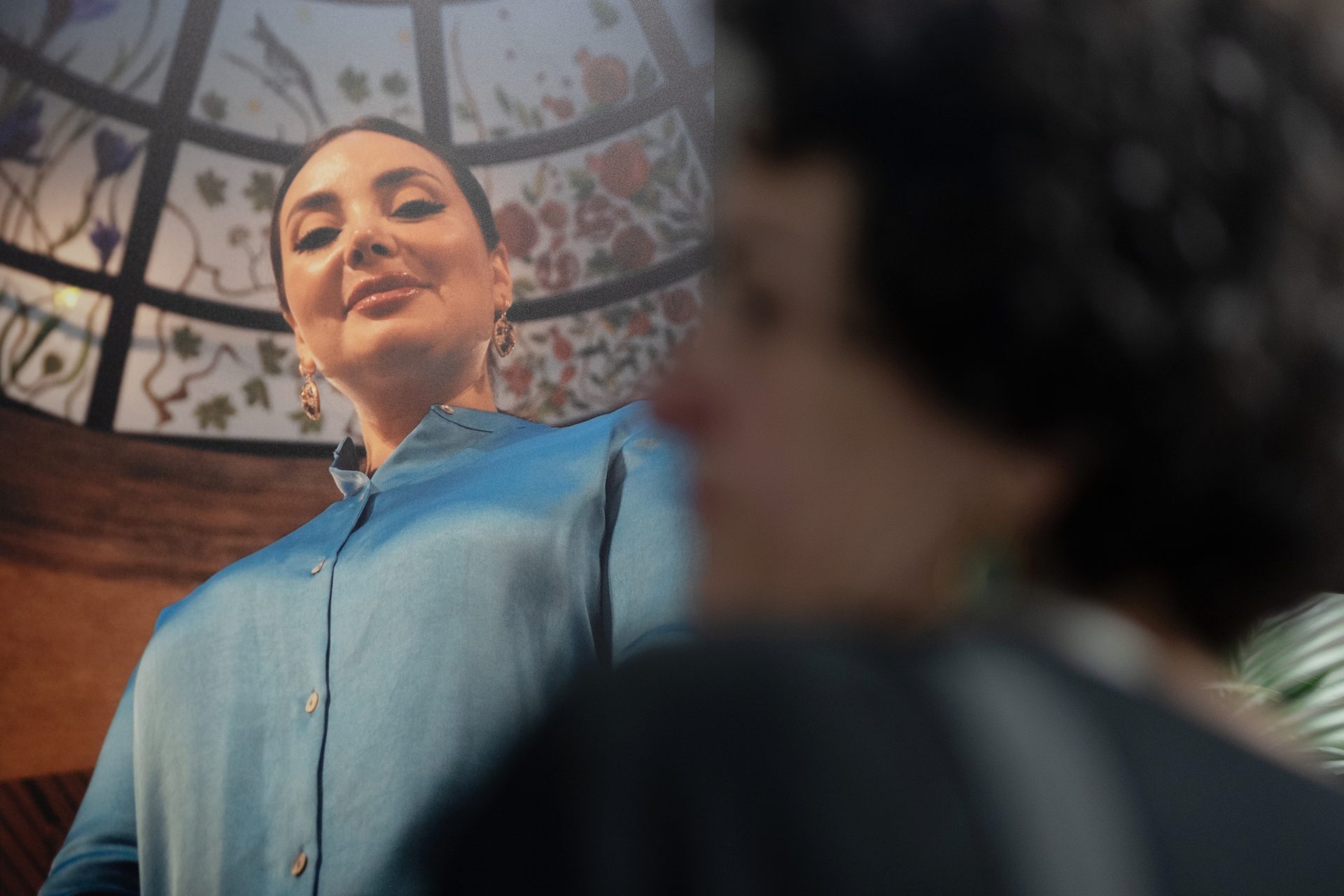

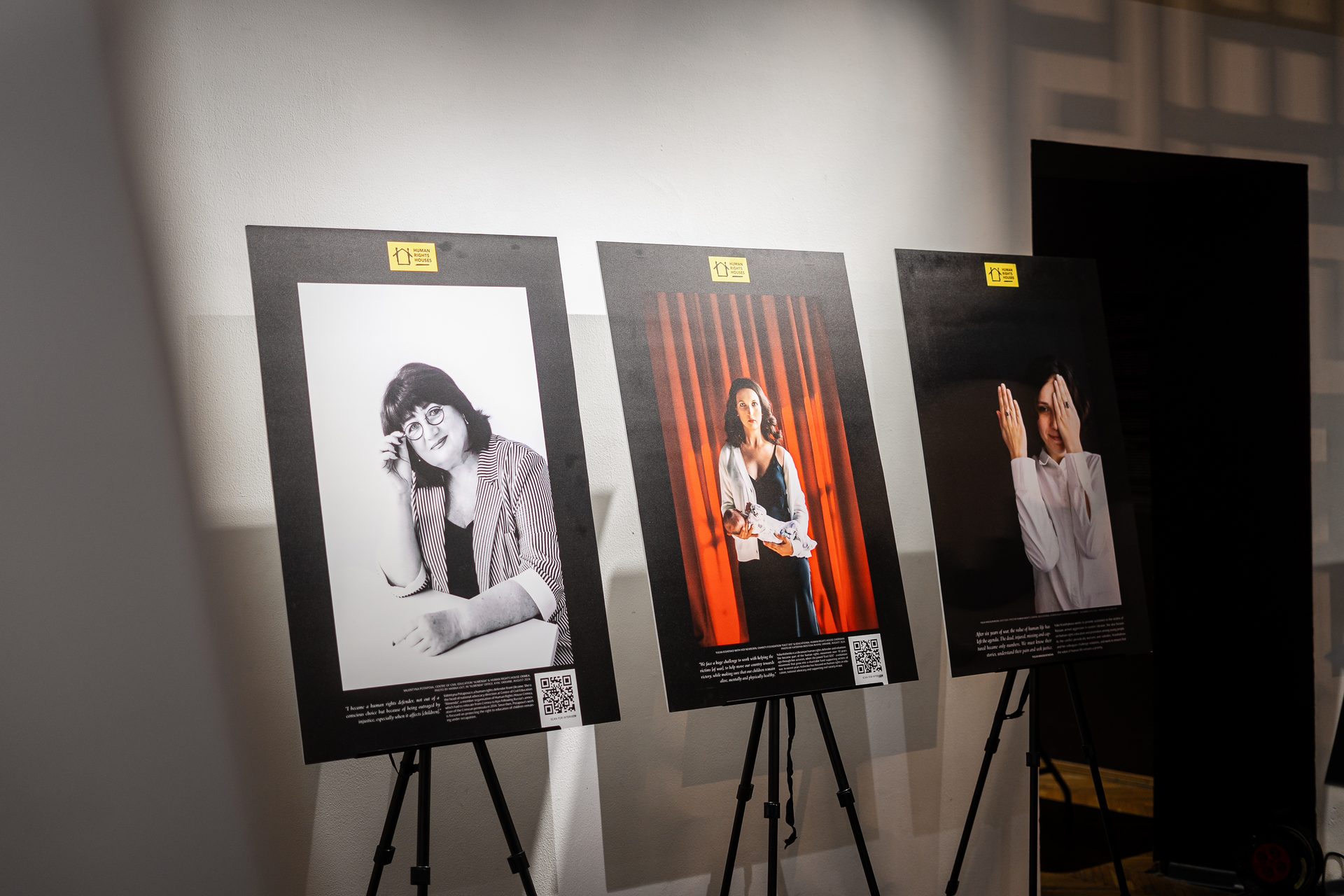
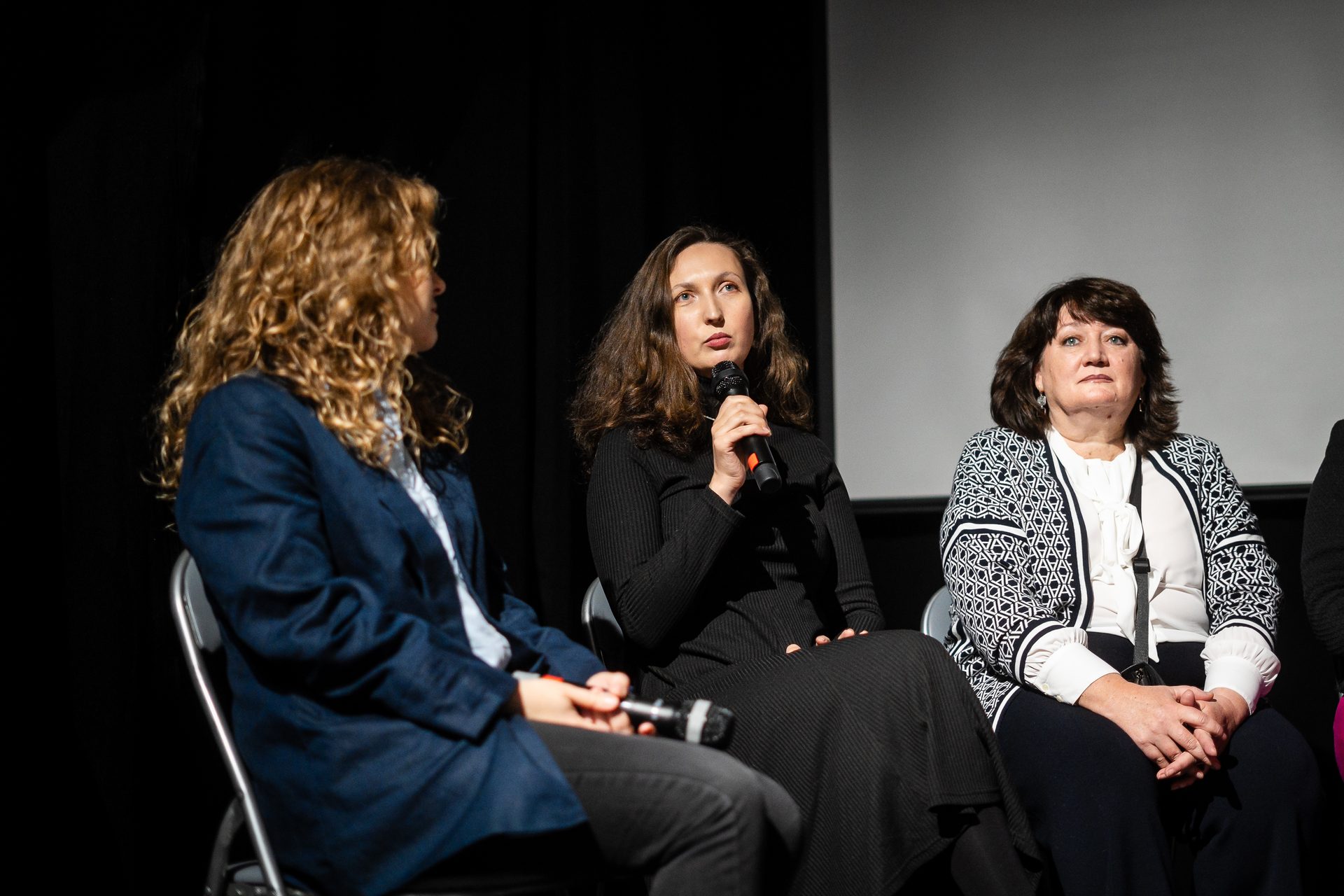
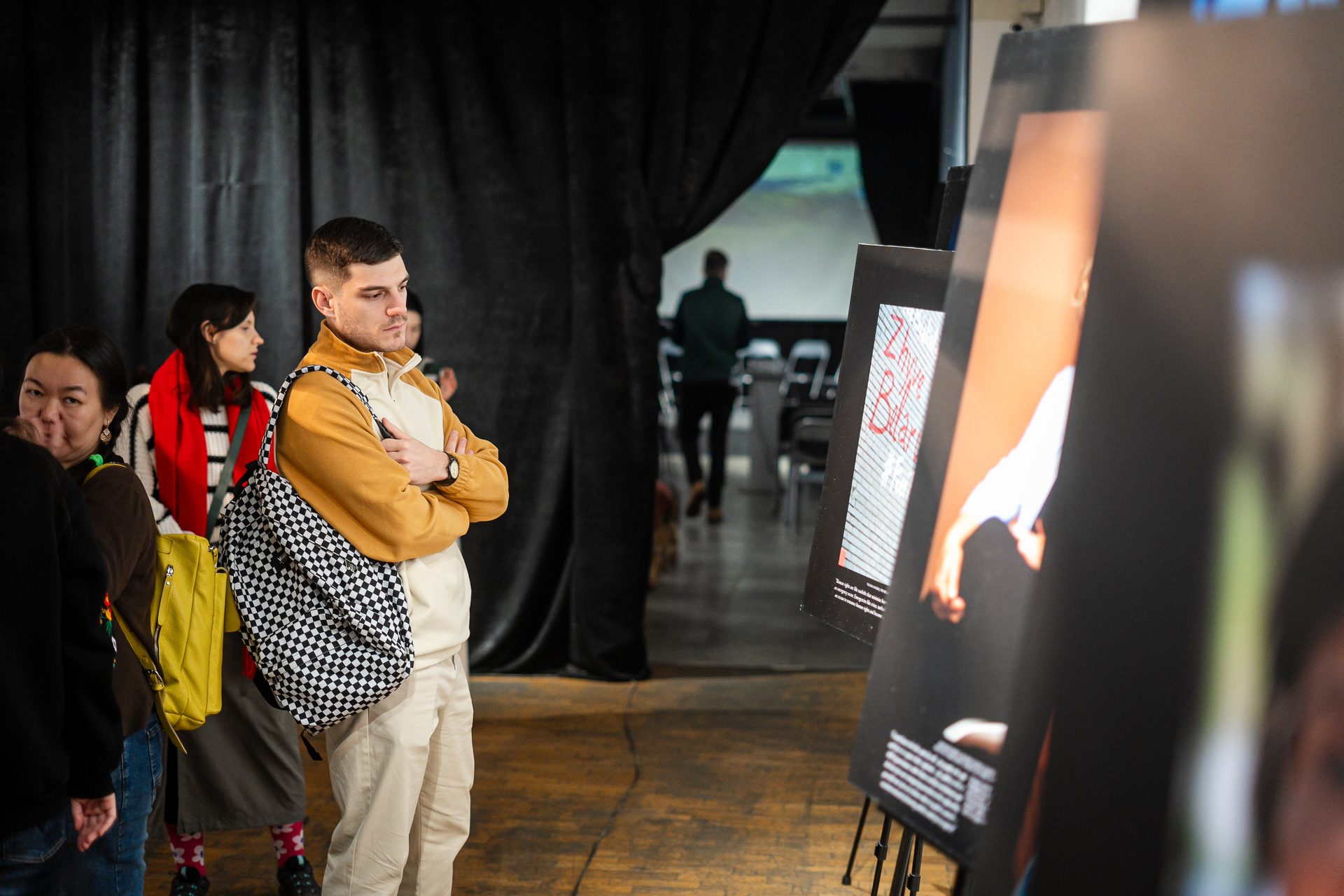

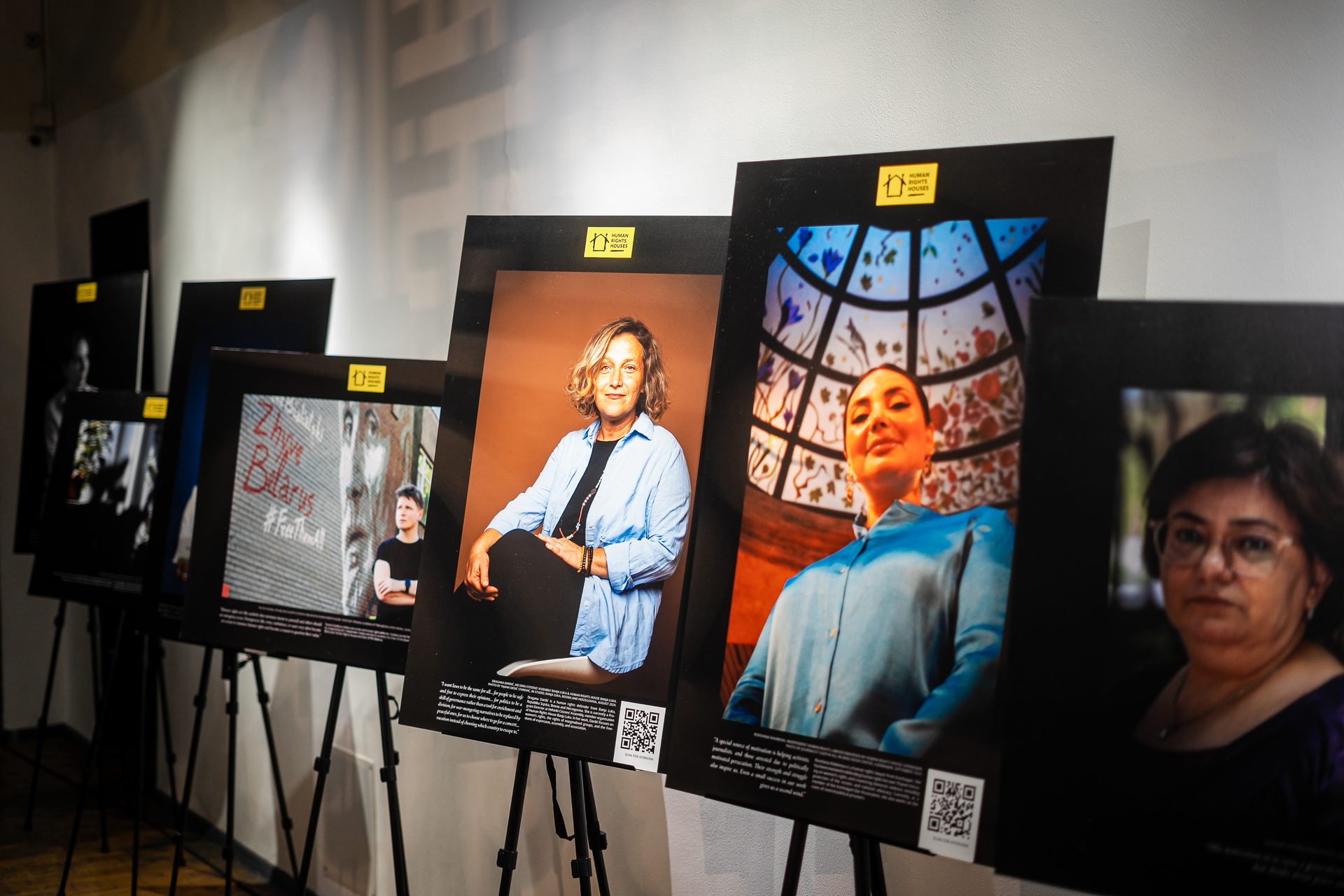
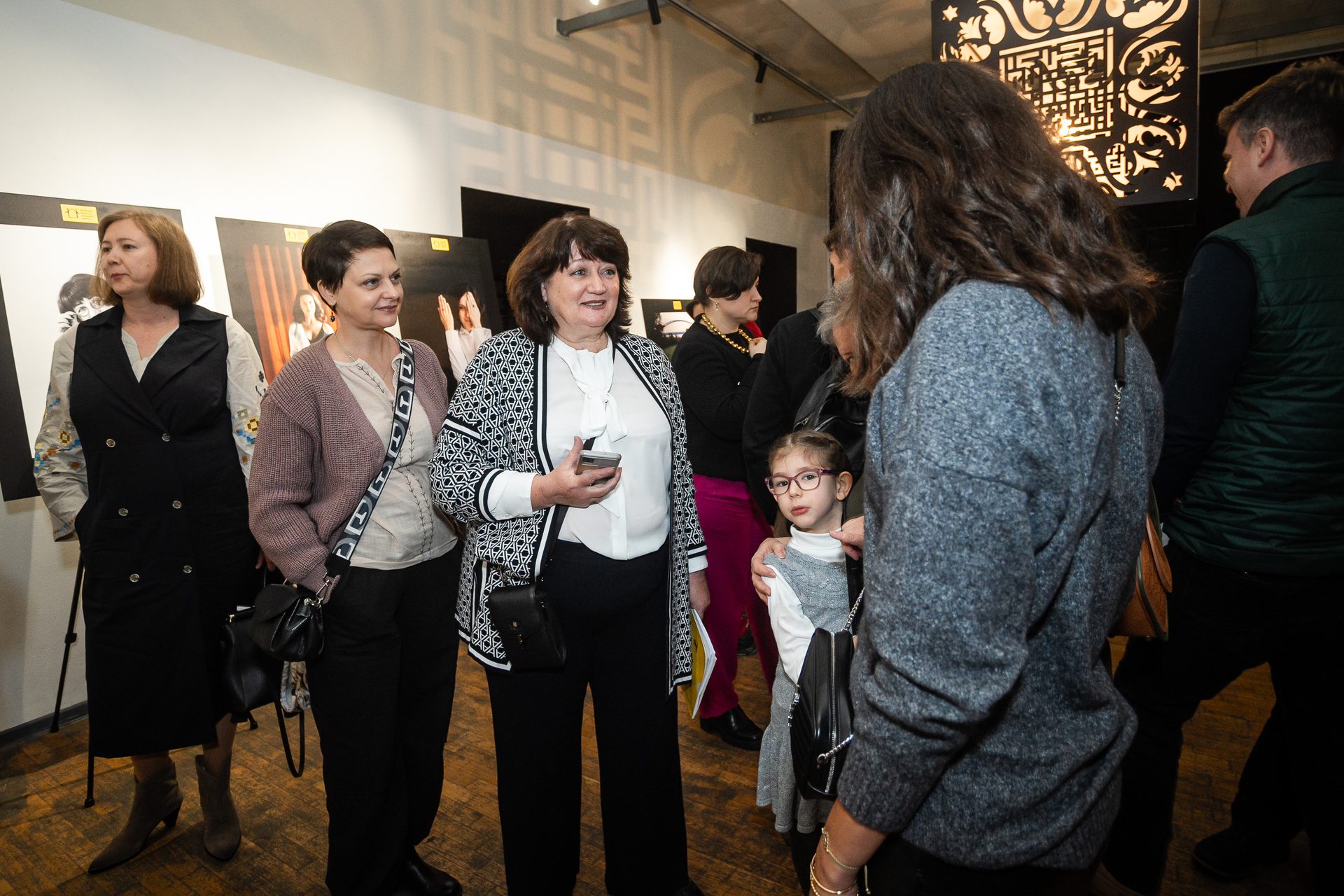

July: HRHF celebrated Nariman Dzhelal’s release and supported his advocacy at the UNHRC (pictured) and OSCE, where he shared his story and urged continued international support for Ukraine and occupied Crimea.
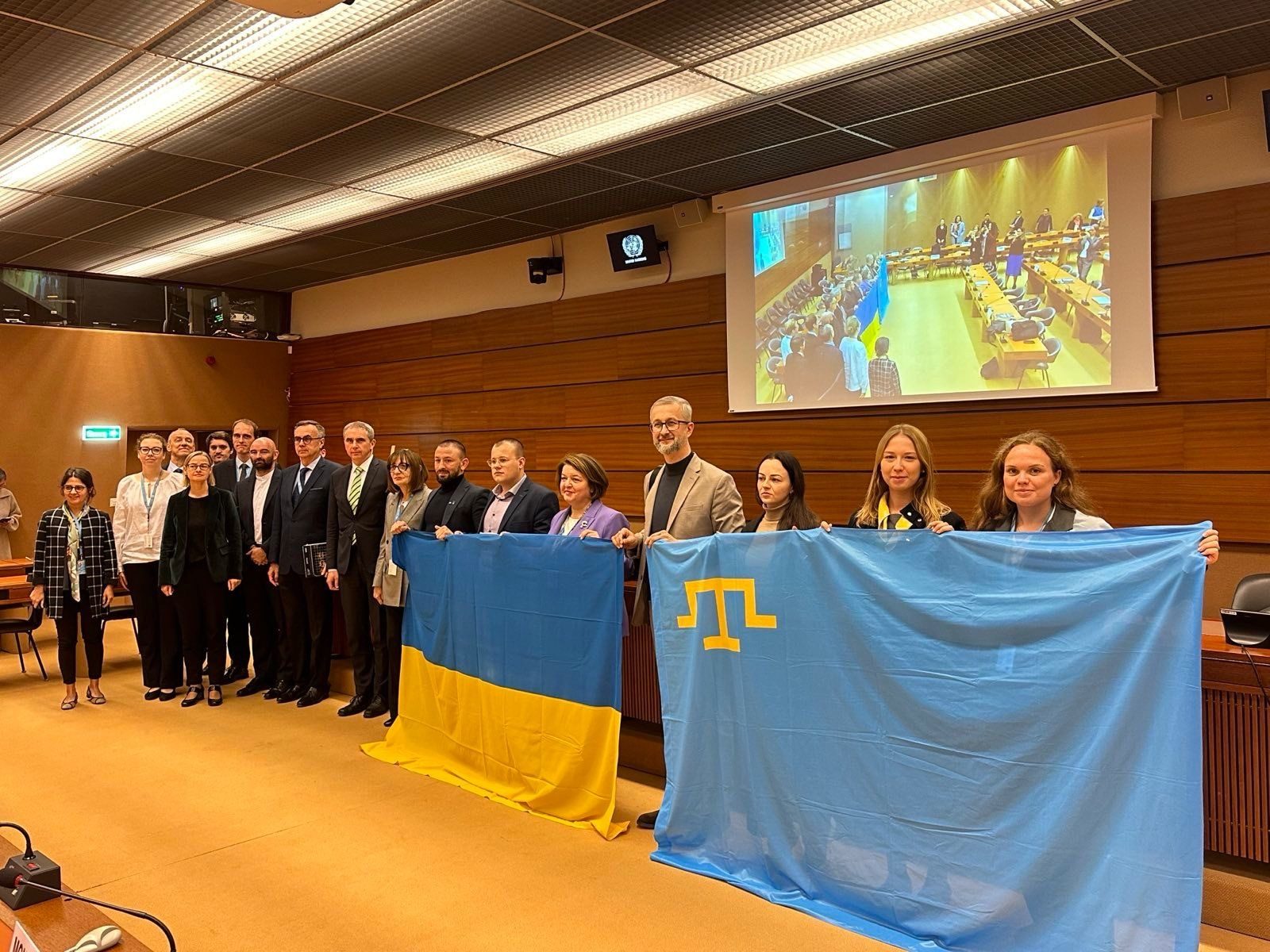
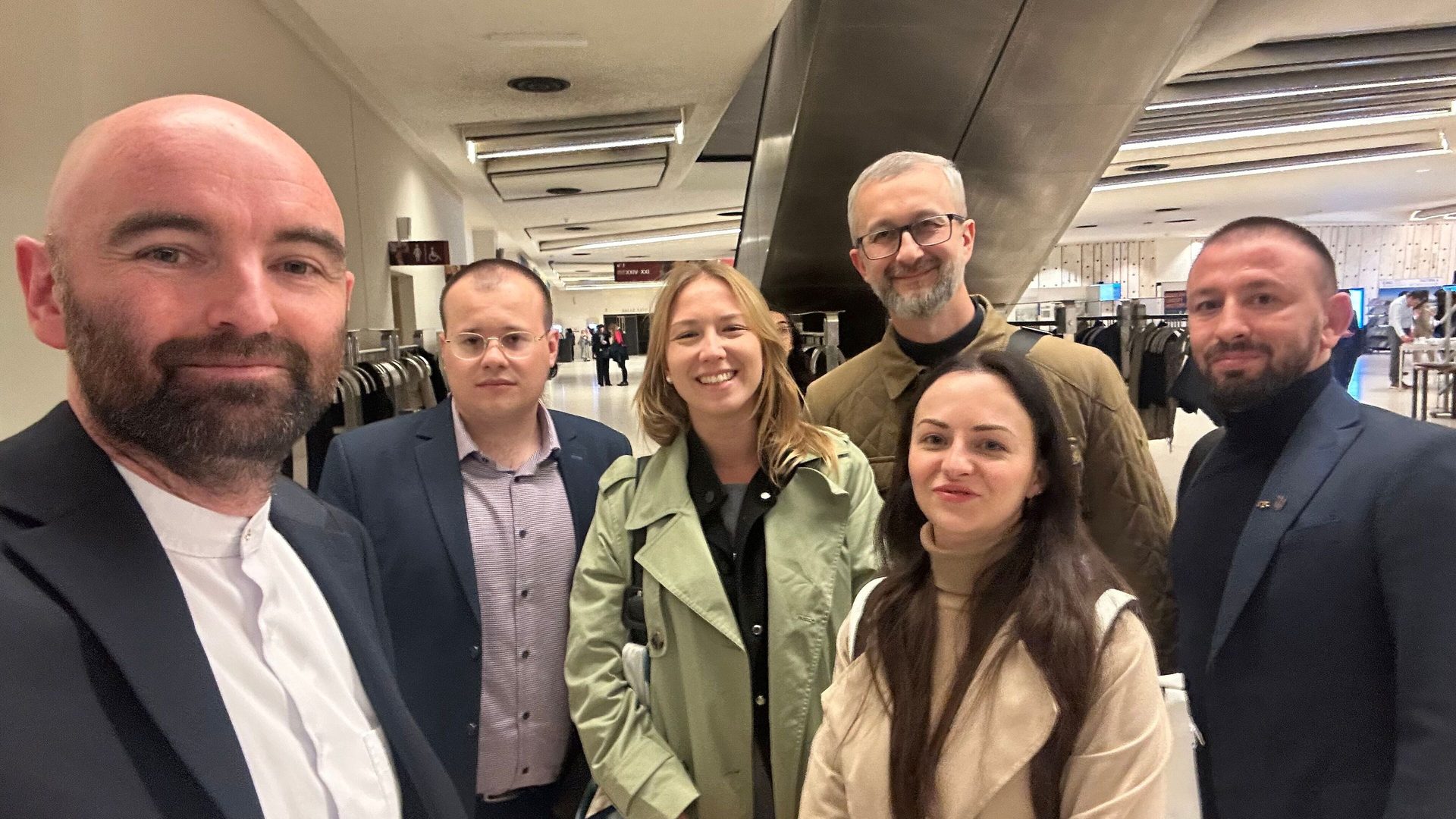
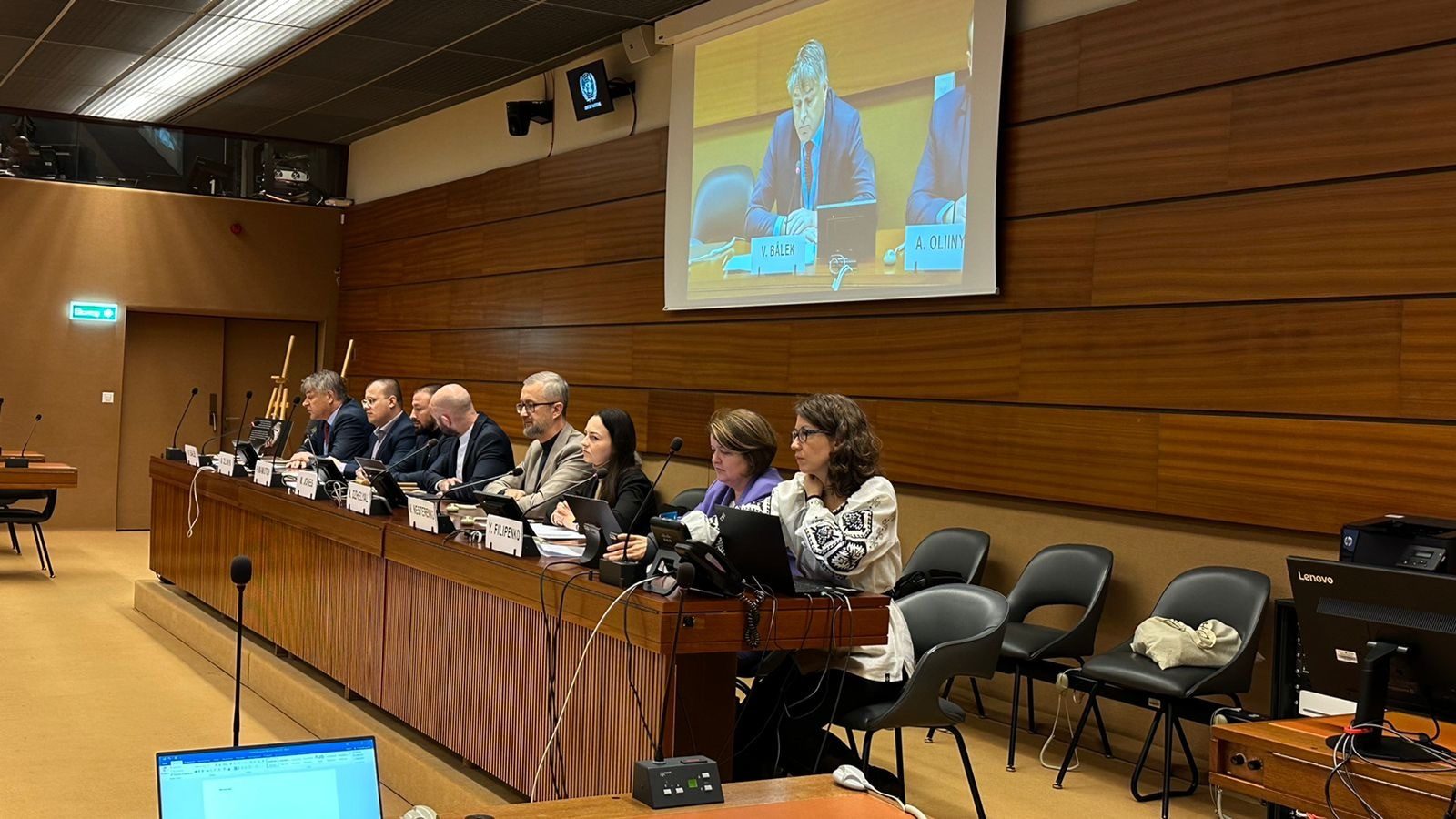
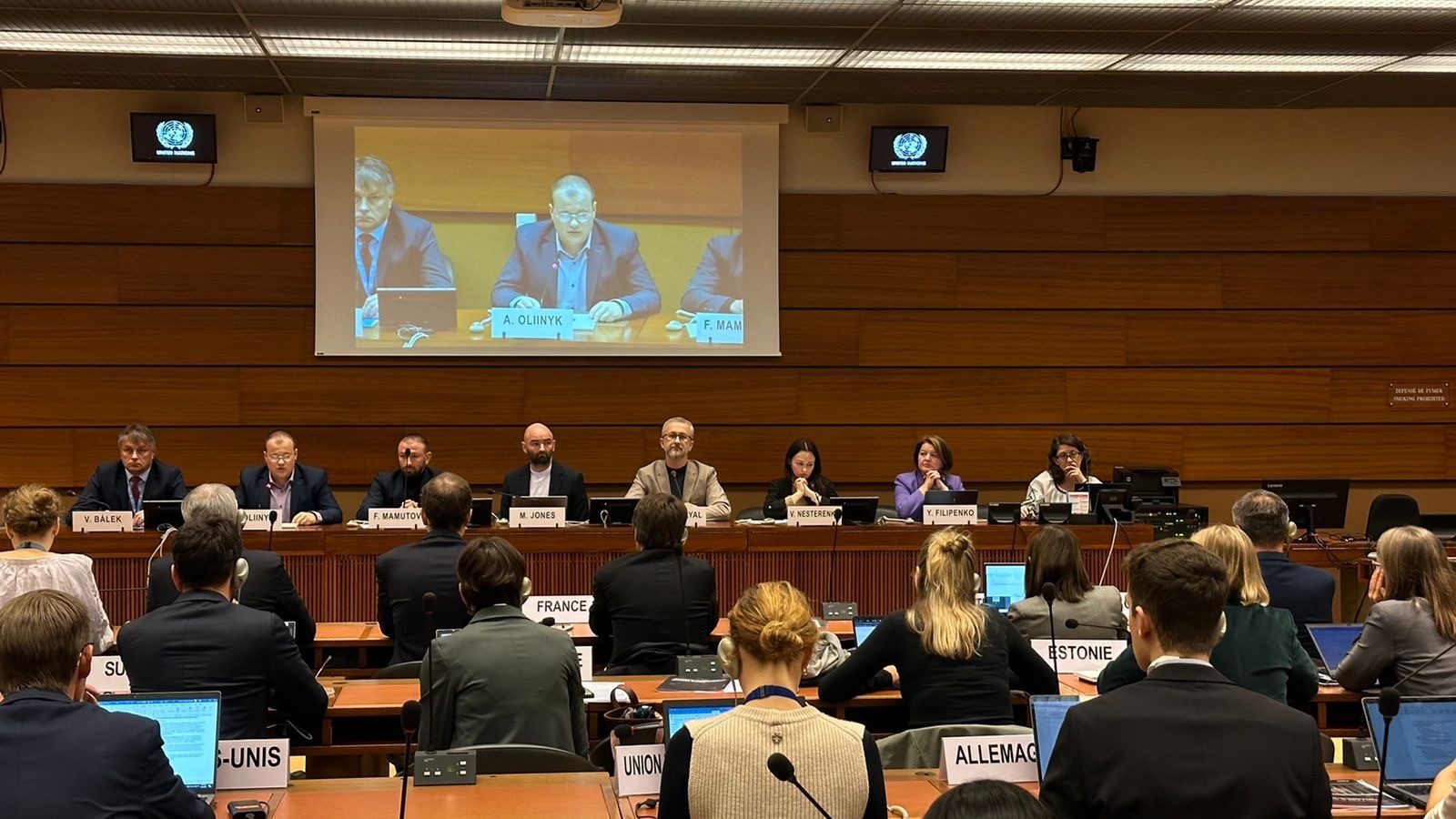
November: HRHF’s Maria Dahle speaks at the Václav Havel European Dialogue in Brussels, and meets with former Belarusian political prisoner Leanid Sudalenka.
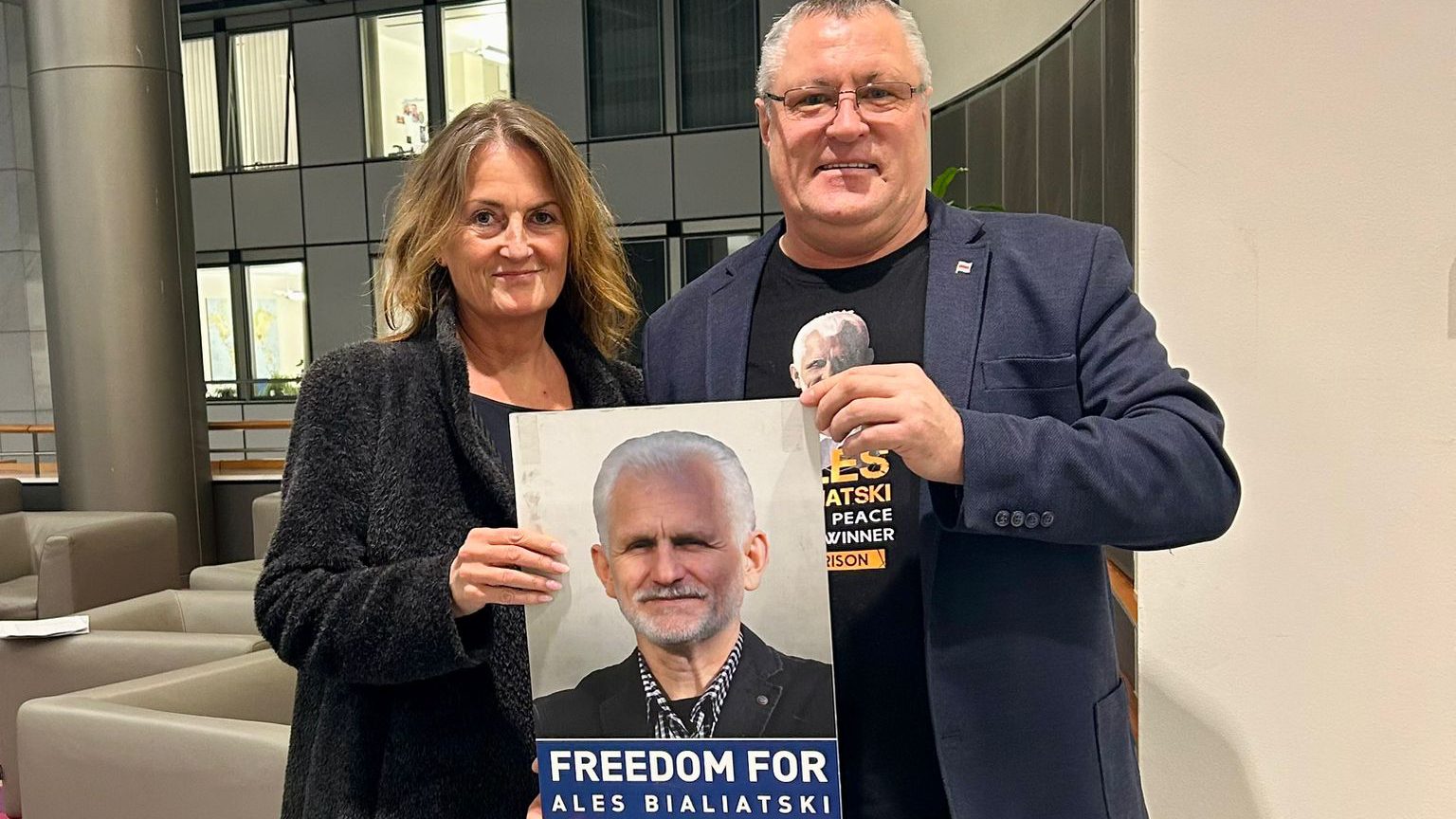
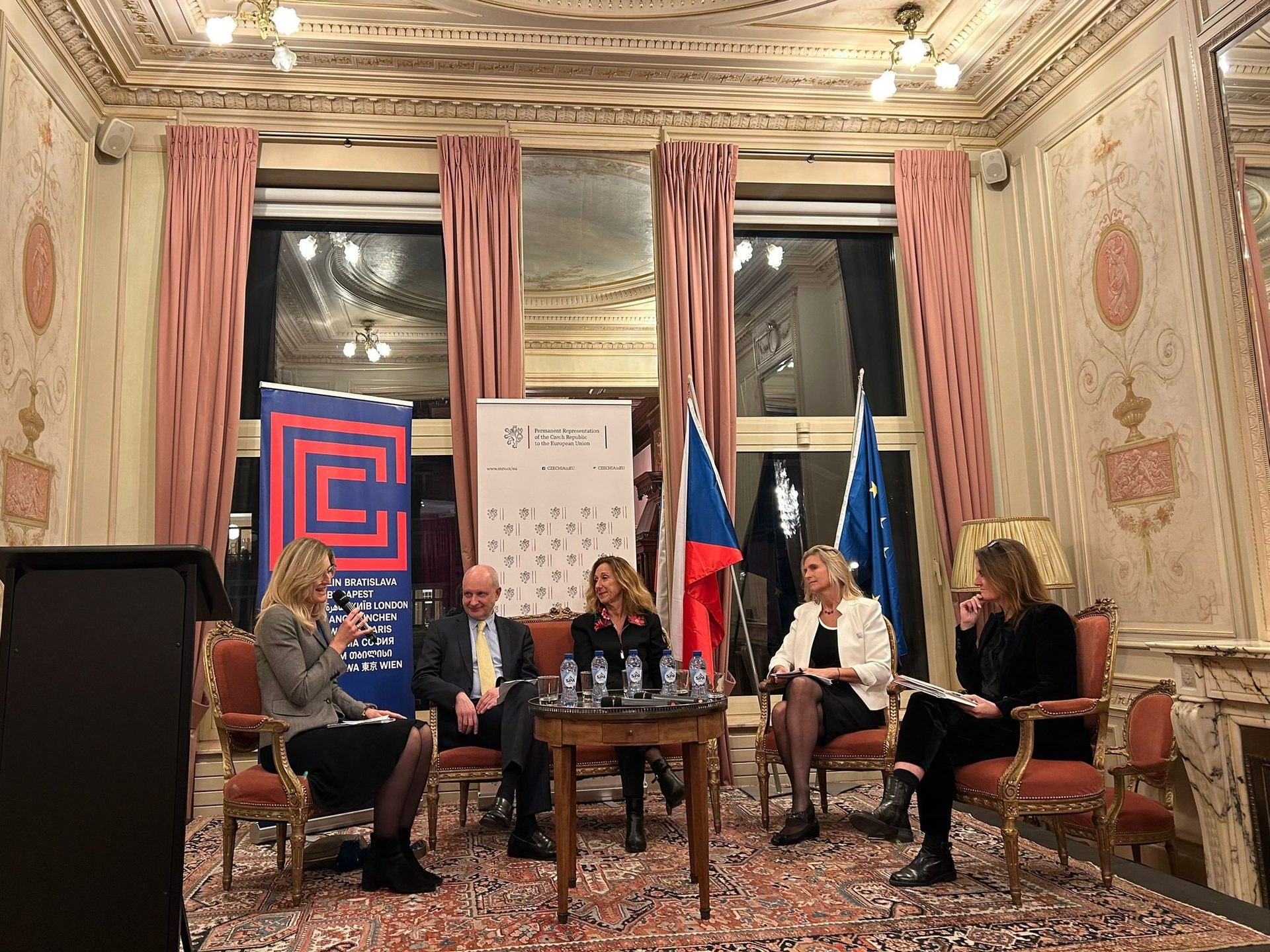
October: To mark the Network’s 30th anniversary, HRHF hosted a week of advocacy events in Oslo, engaging Norwegian policymakers — including meetings in Parliament — to highlight human rights priorities.
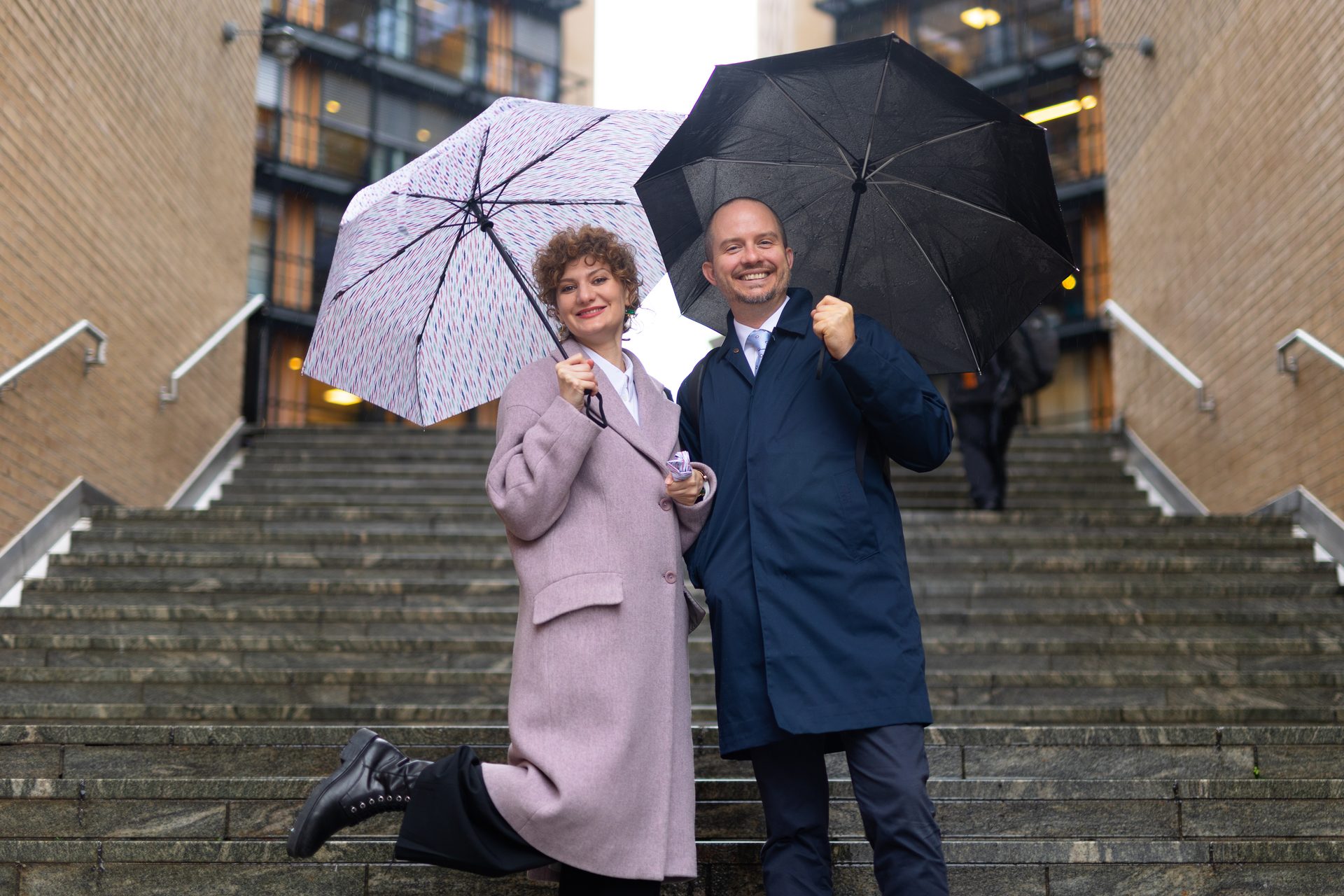
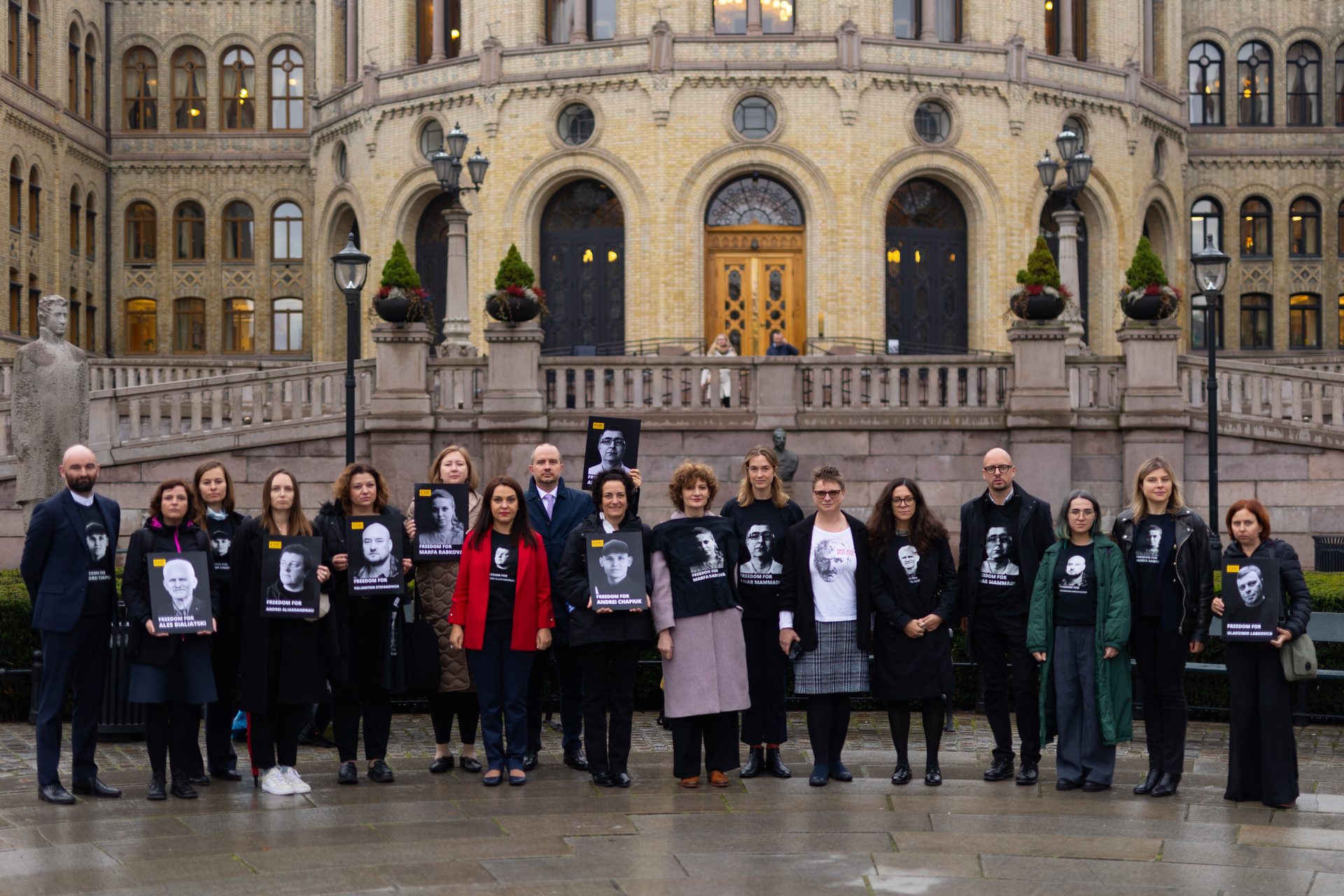
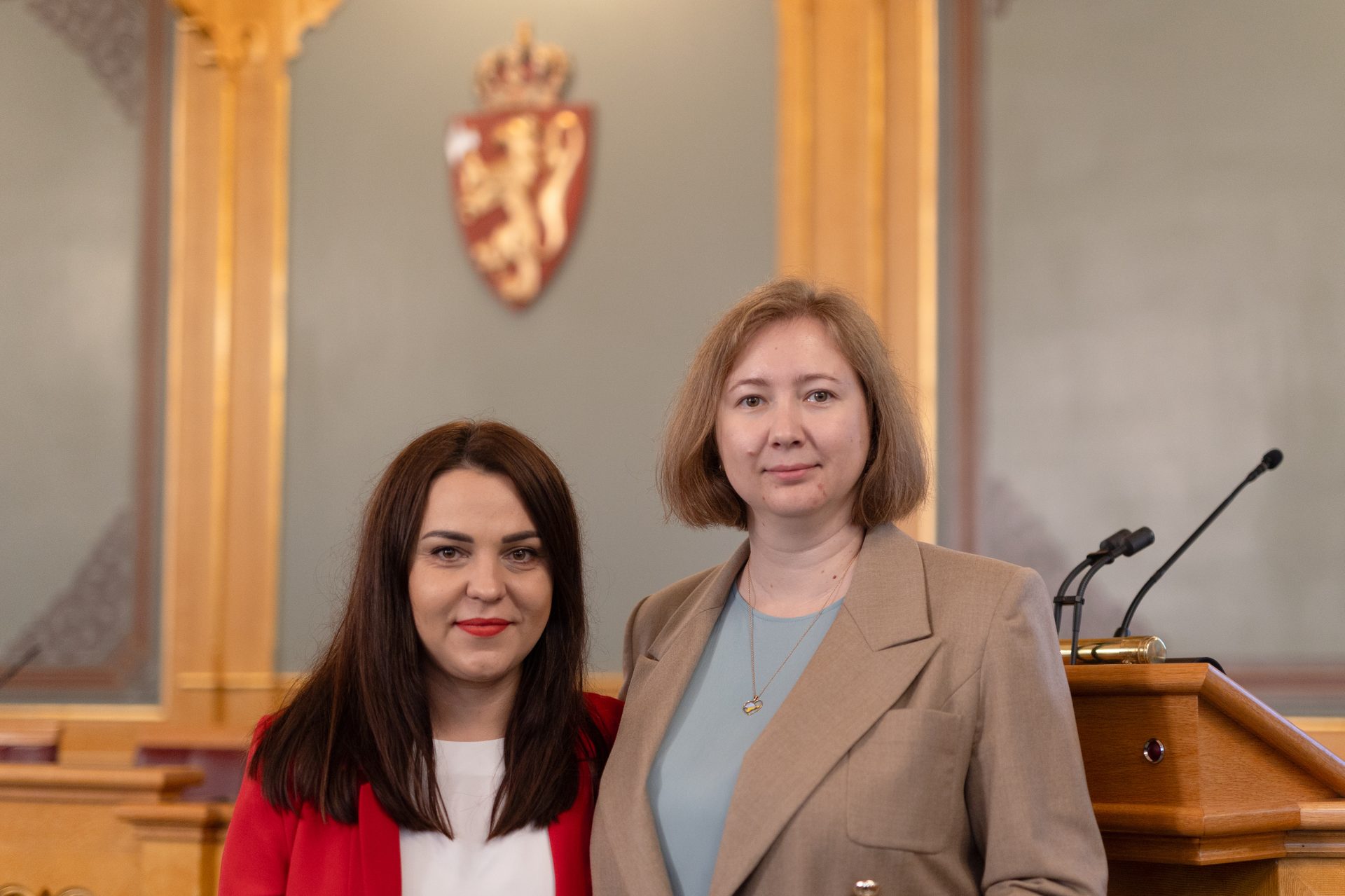
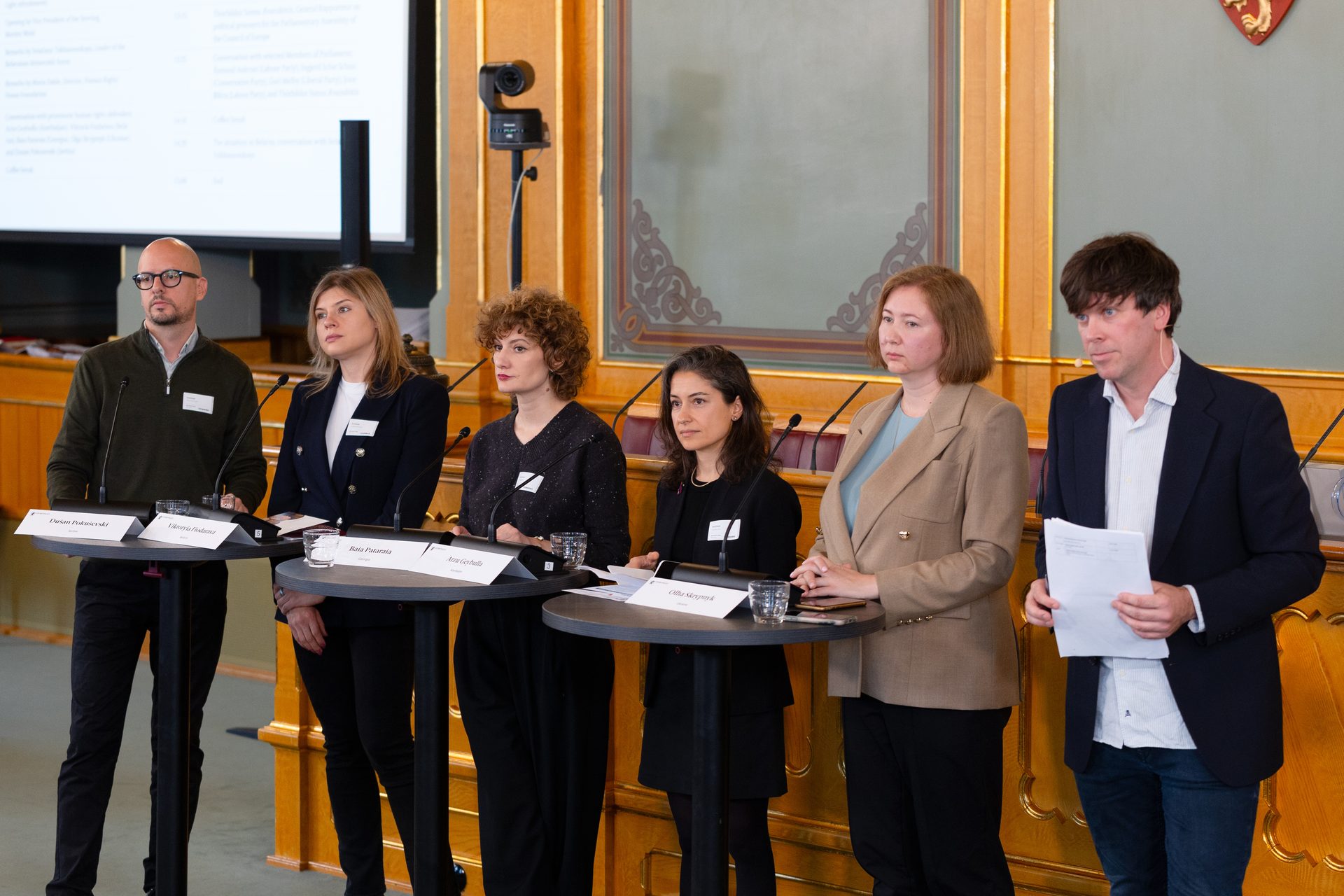

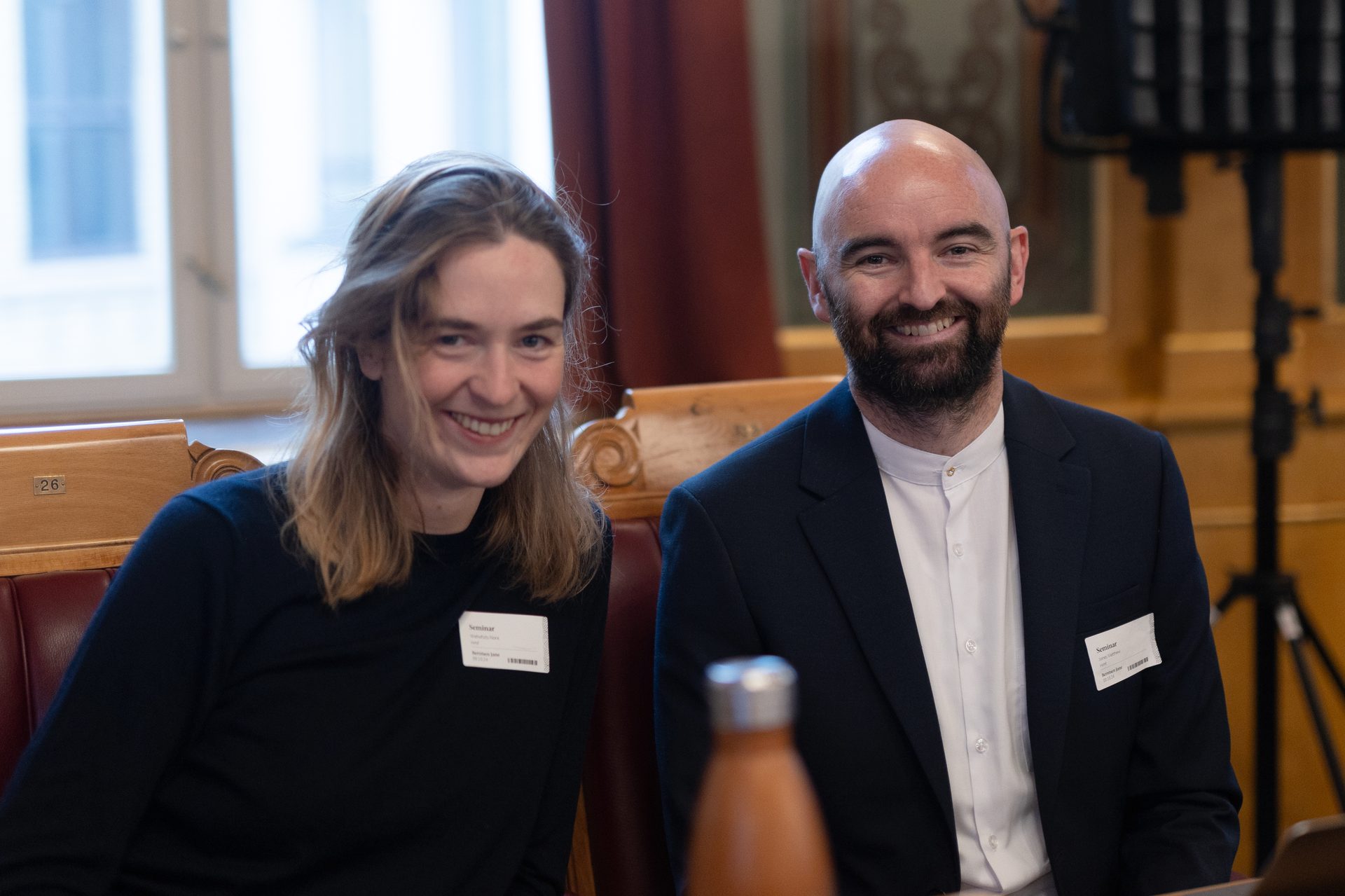

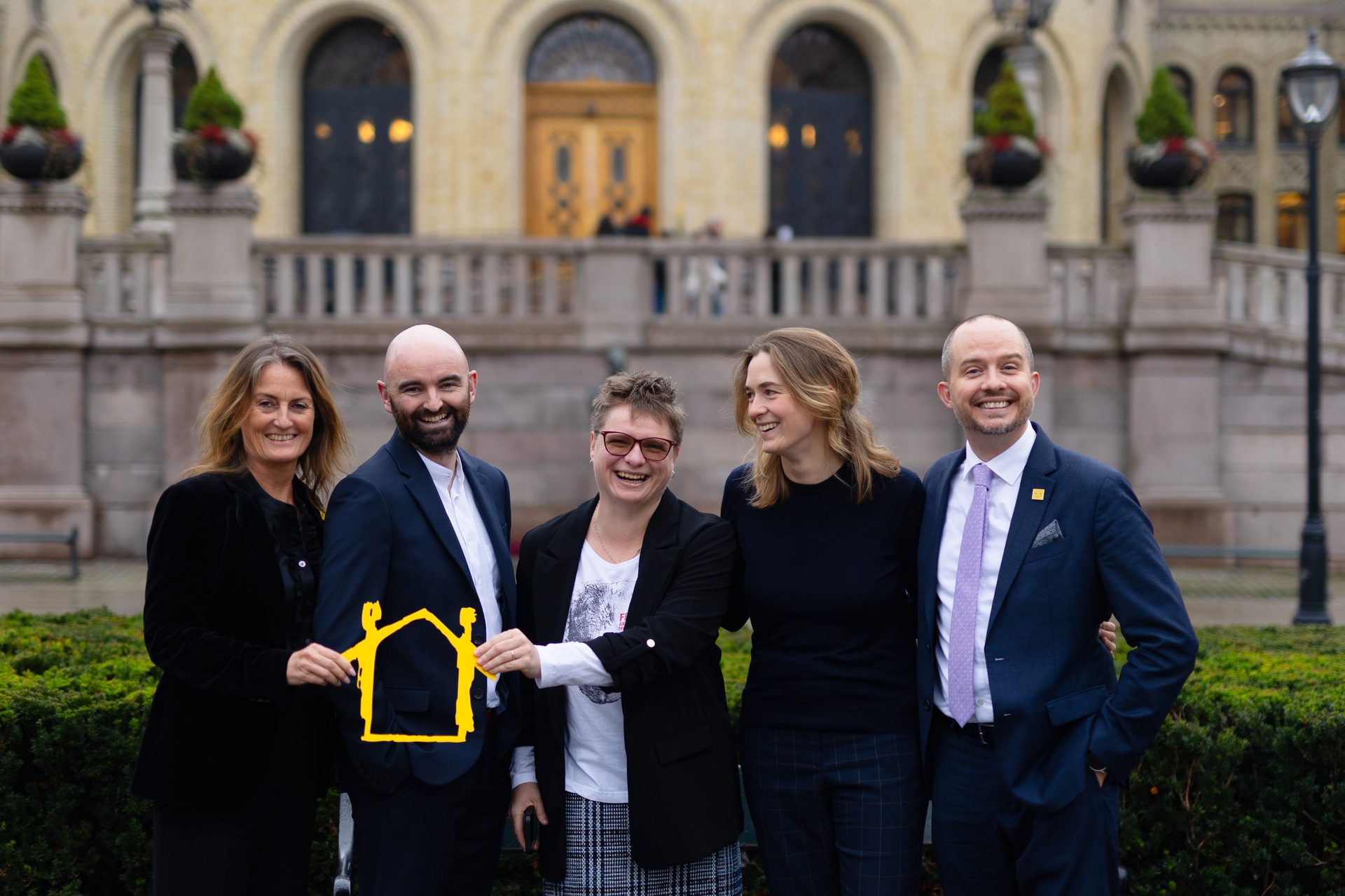

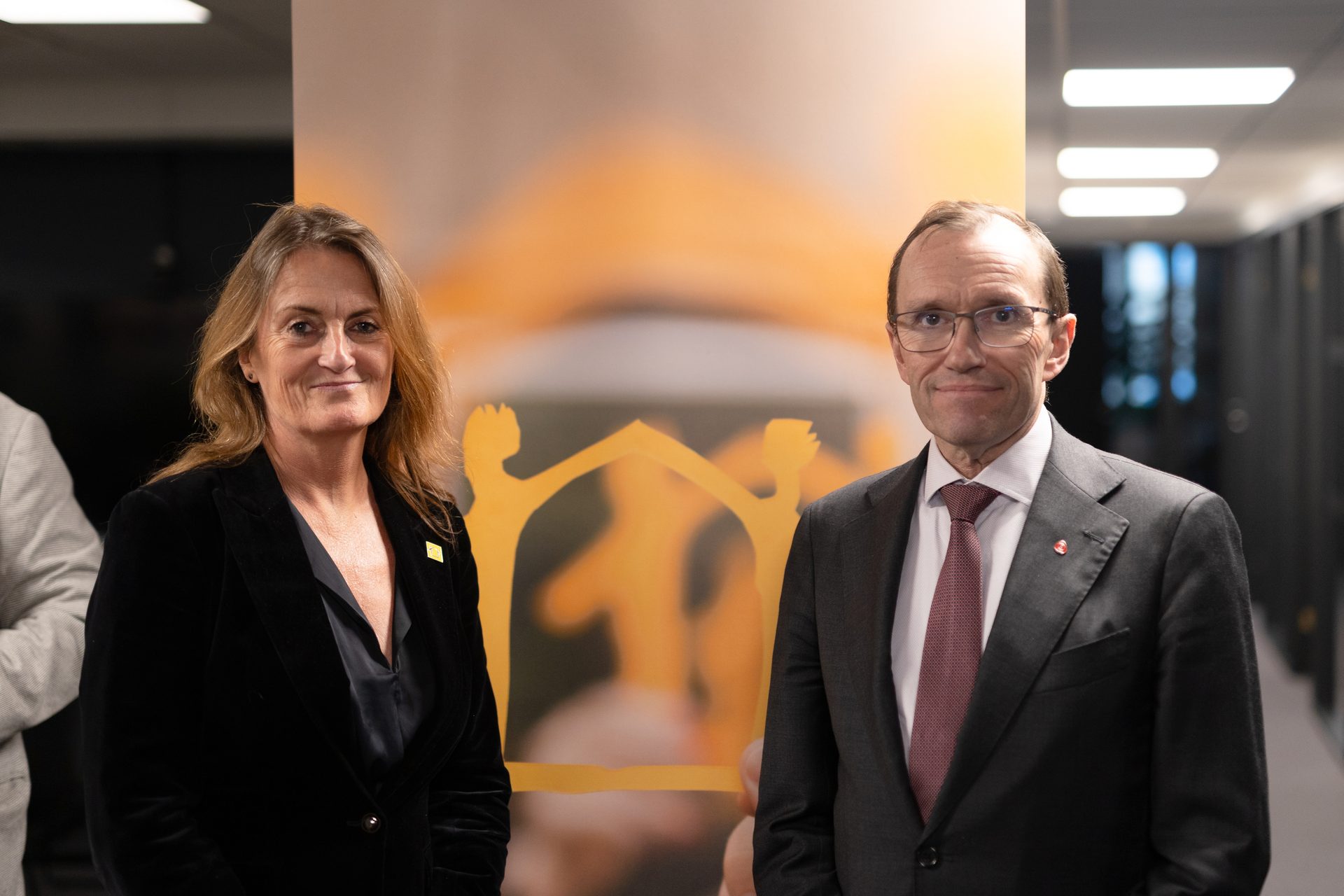

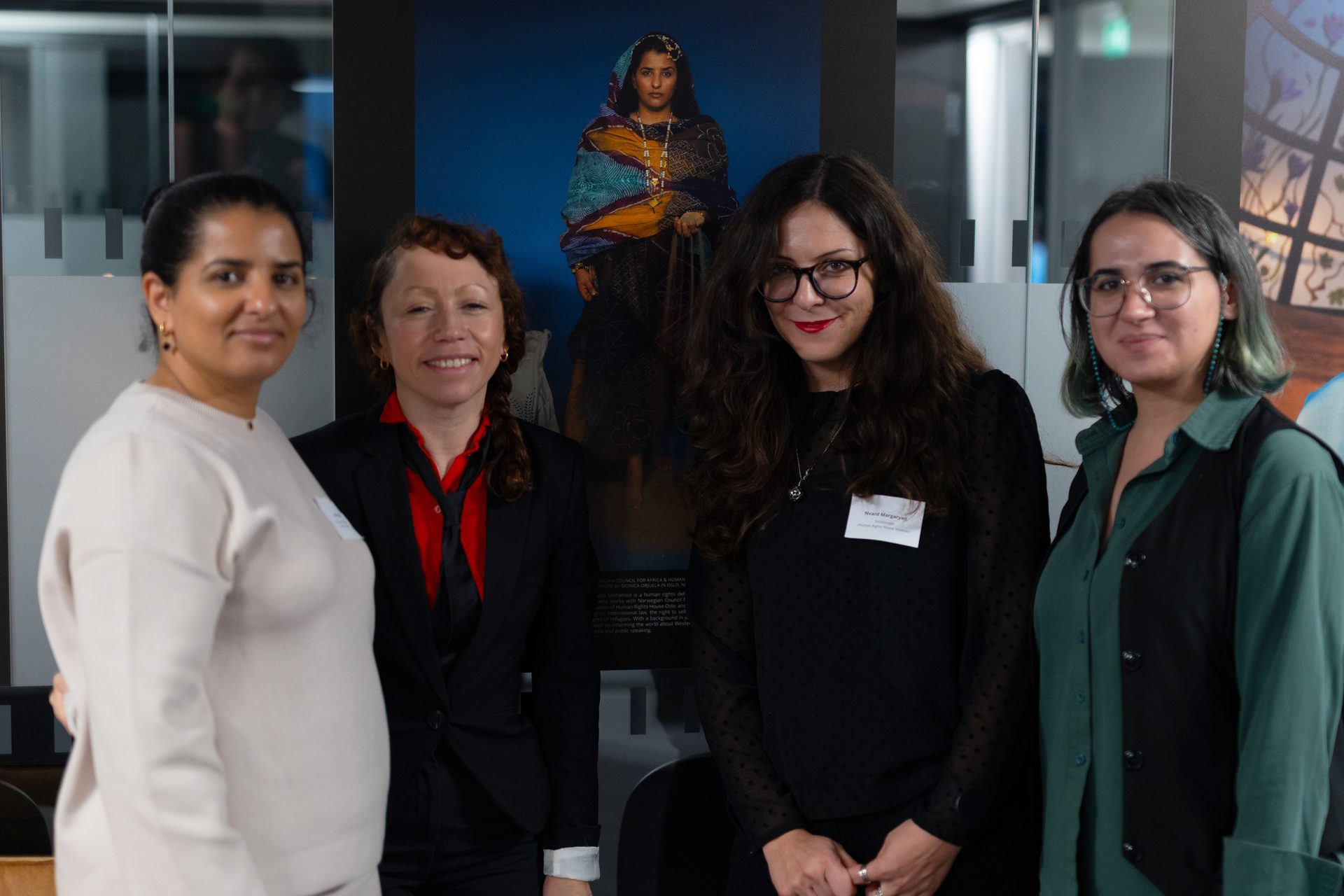
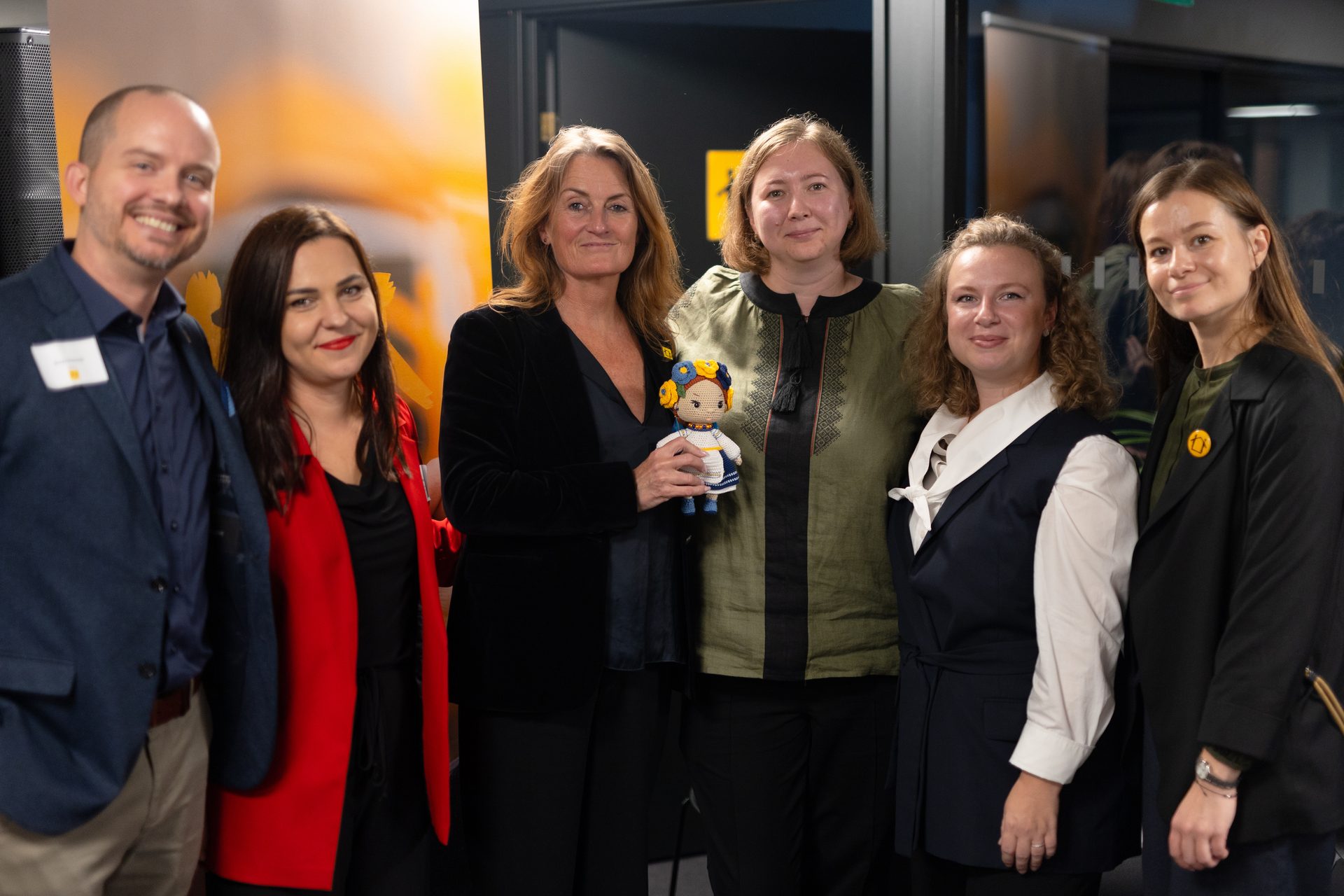
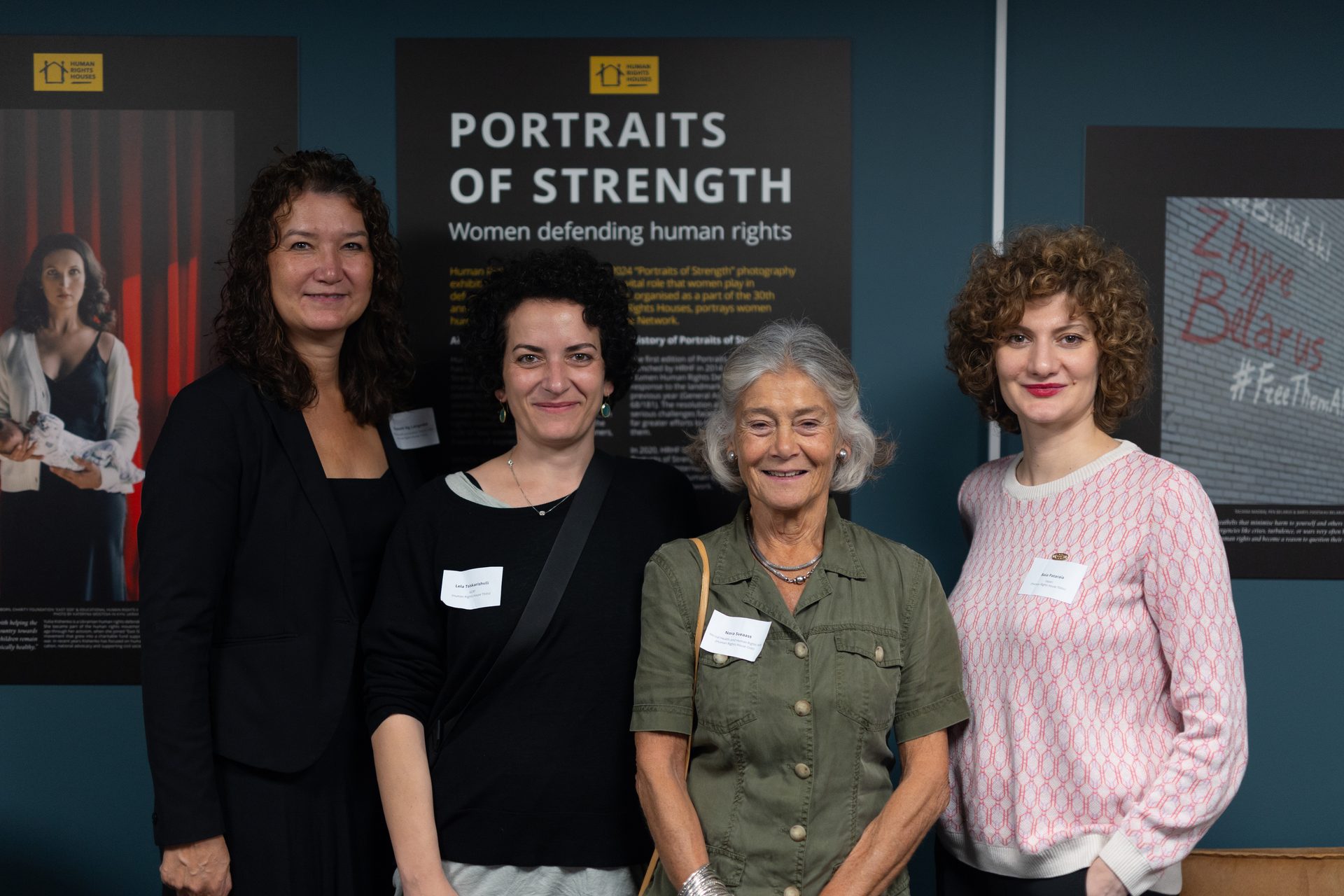
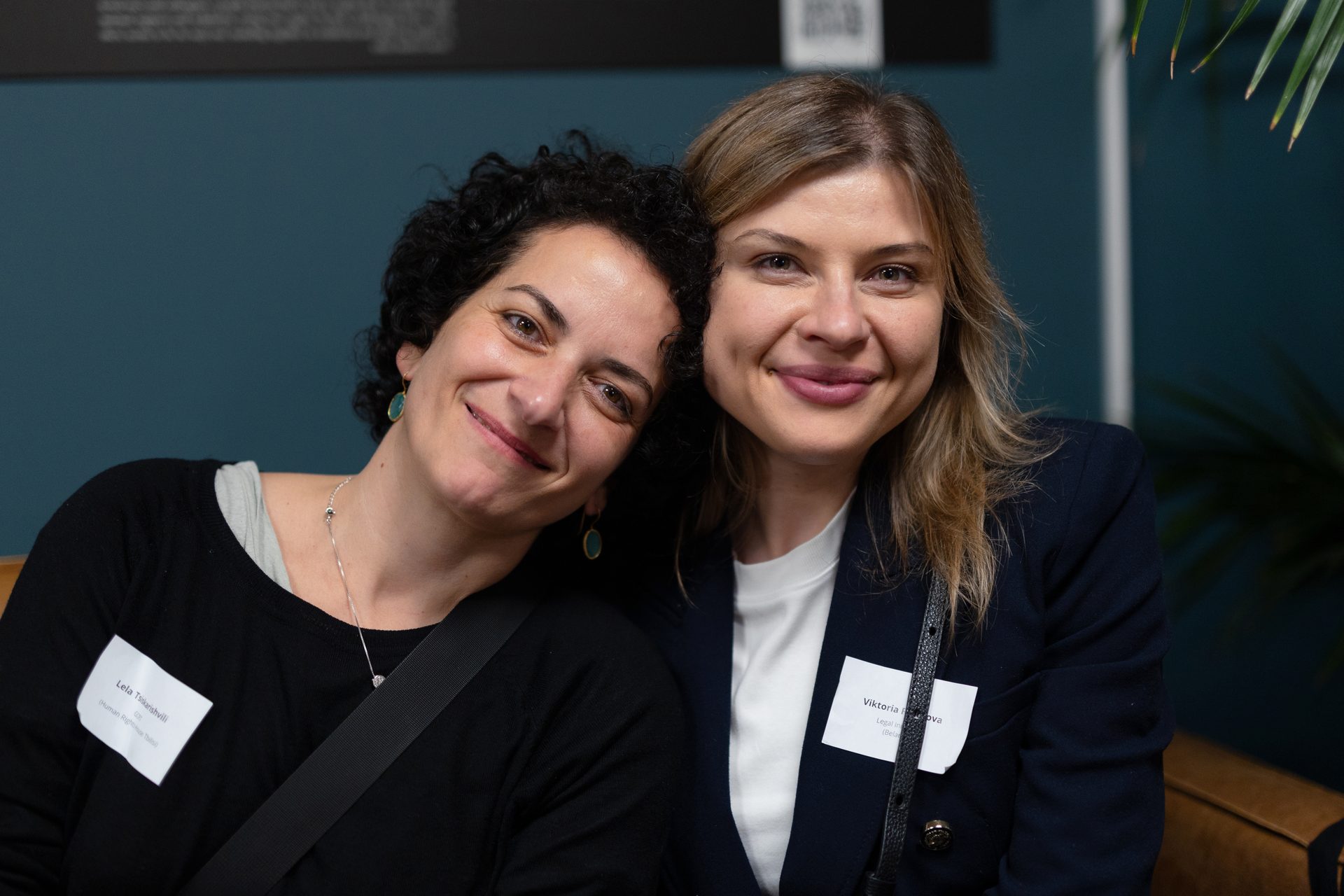
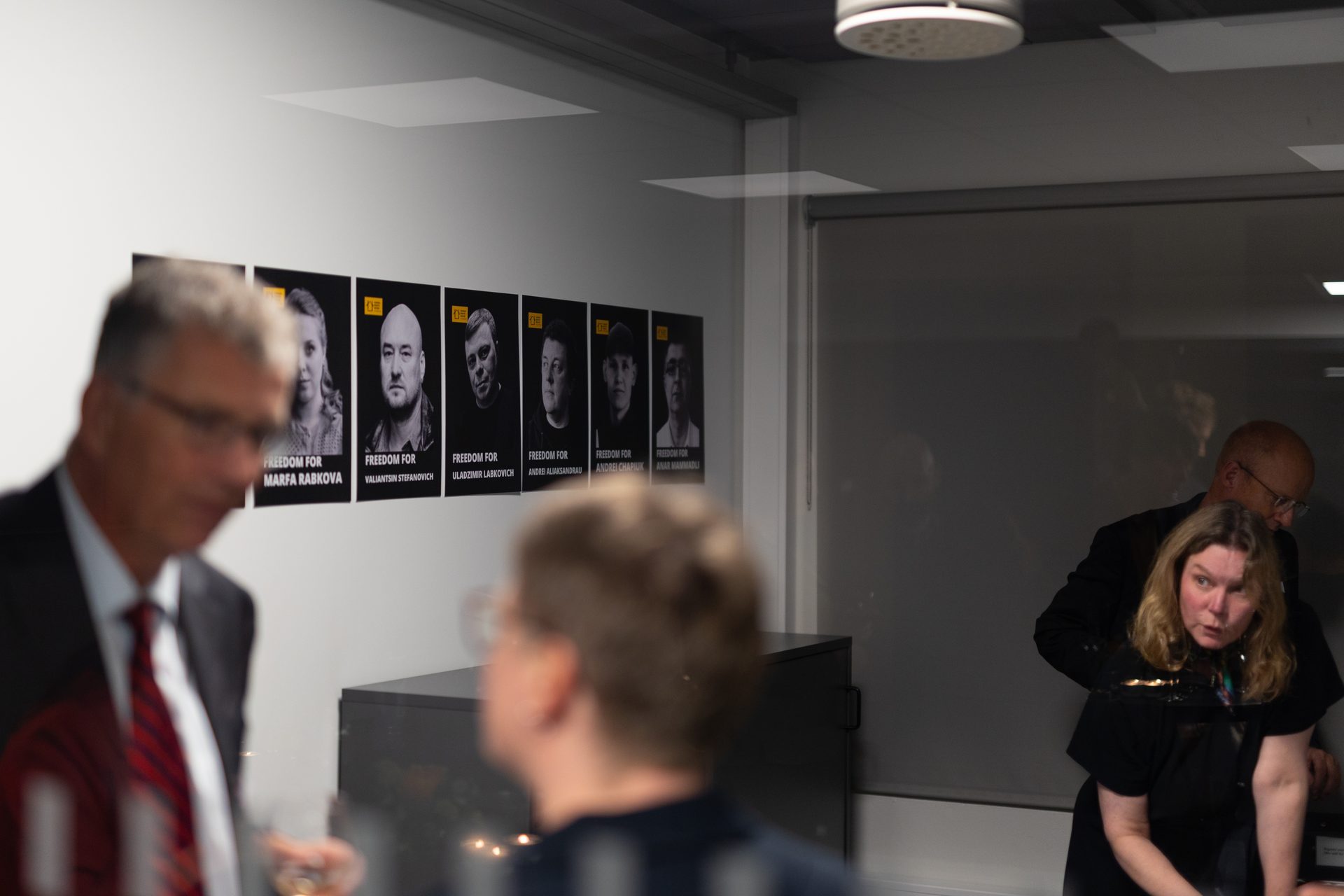
March: Educational Human Rights House Chernihiv’s photo exhibition Education Under Fire in Ukraine, documenting Russia’s destruction of schools in Kherson and Sumy, was held at Vega Scene in Oslo during the Human International Documentary Film Festival, with support from HRHF and Mental Health and Human Rights Info.
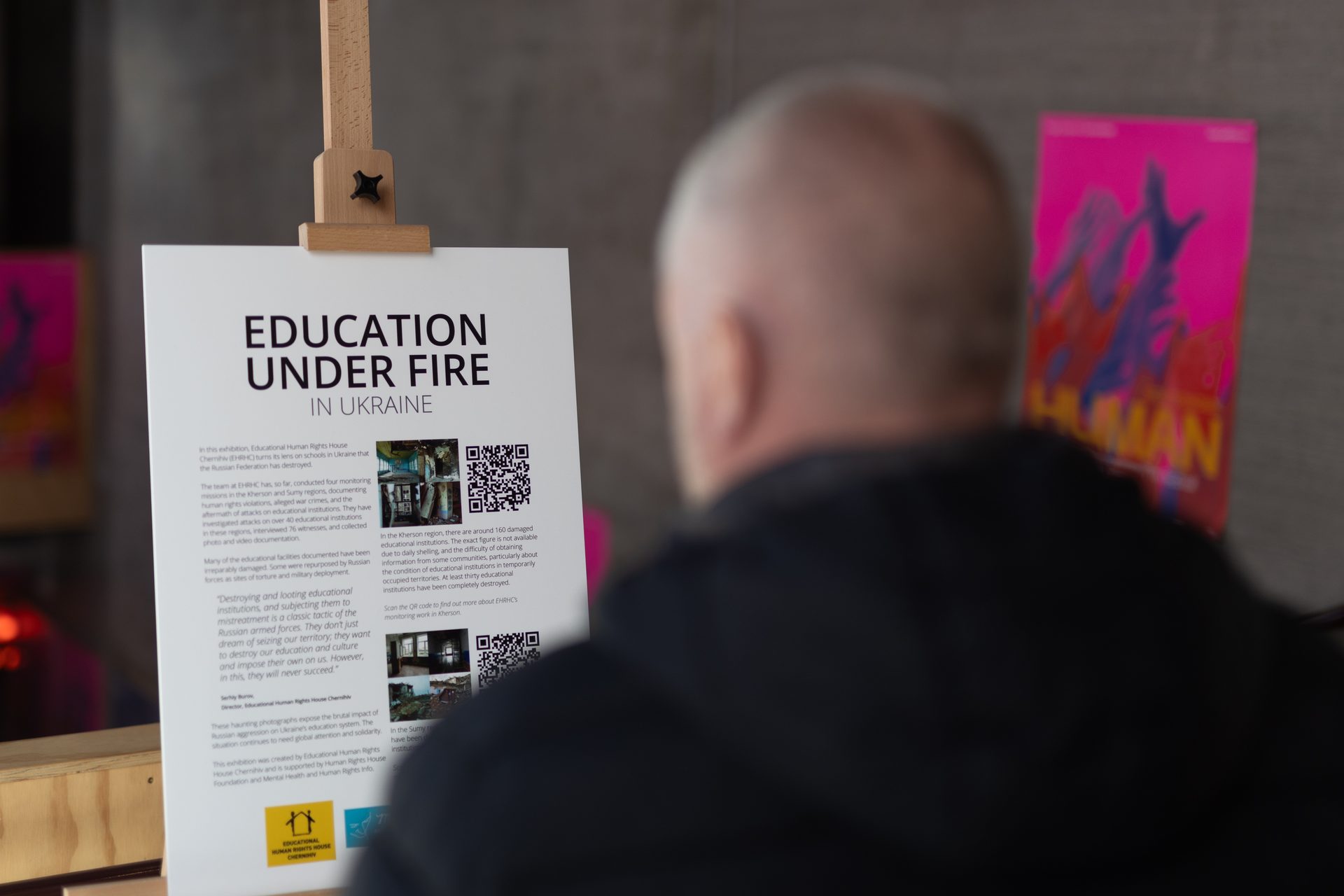
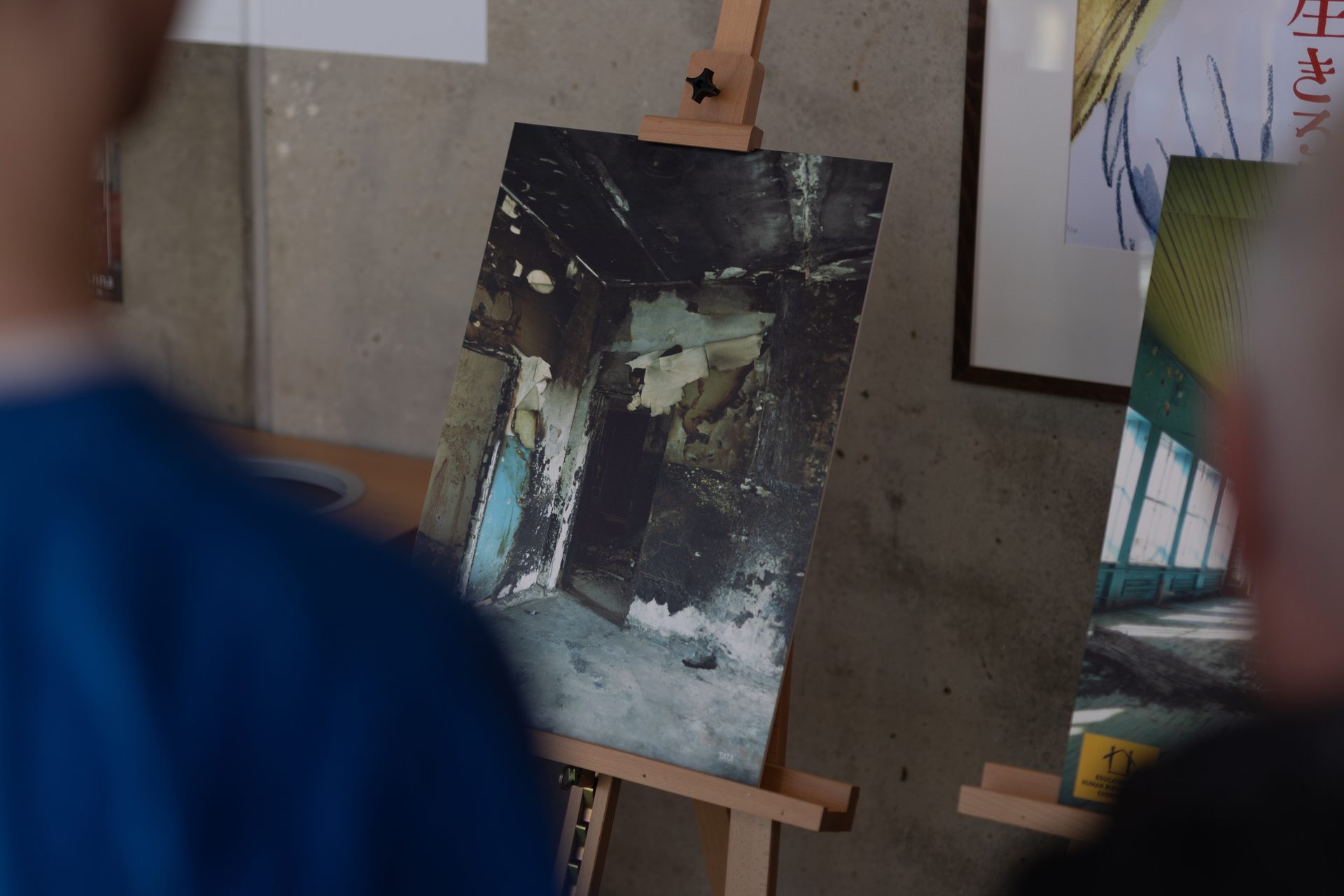


March 2024: Human Rights House Foundation and the Netherlands Helsinki Committee co-hosted a civil society Human Dimension event where OSCE State delegations could hear directly from human rights defenders from seven countries, including representatives from several Human Rights Houses in the region.
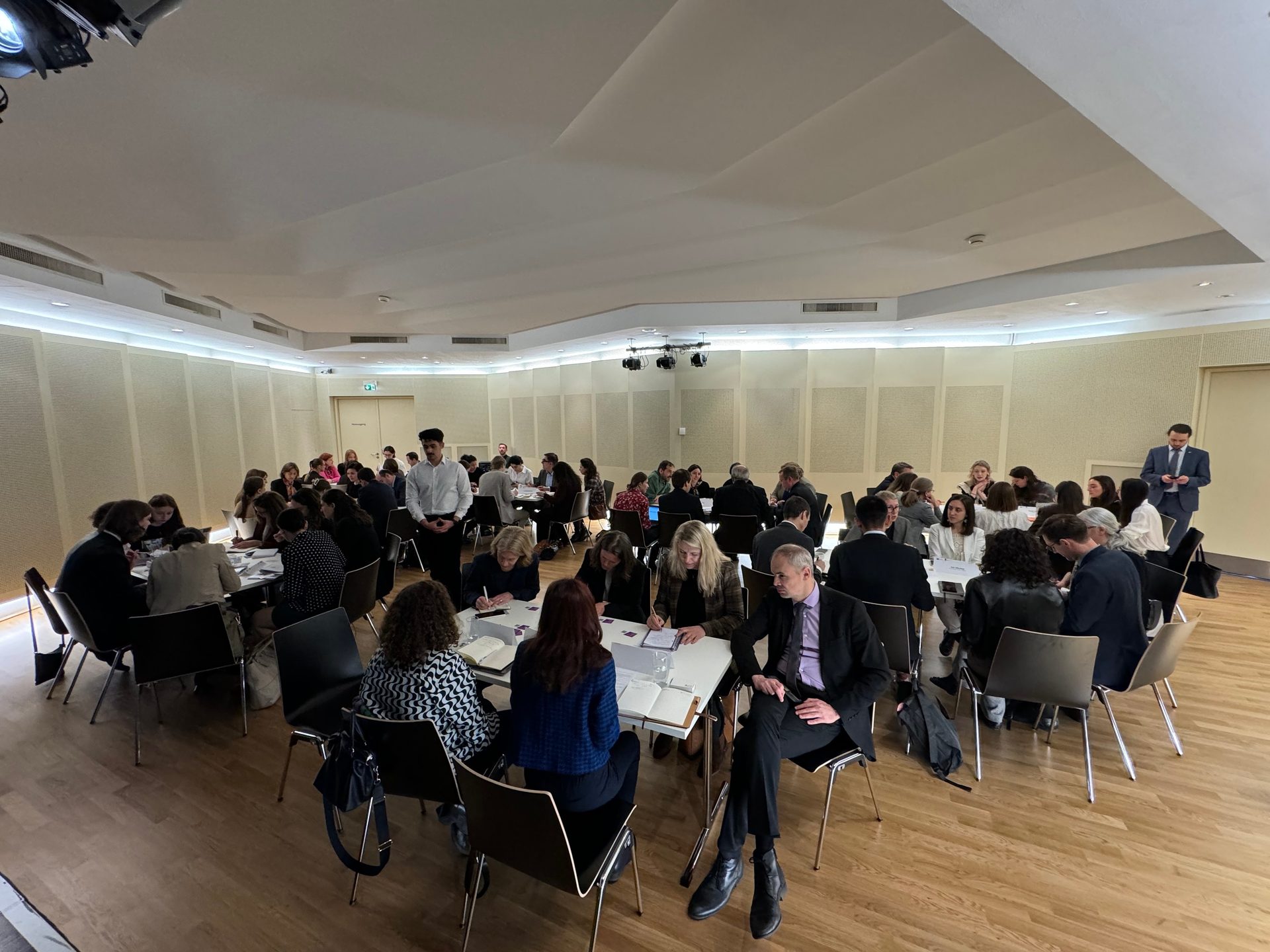
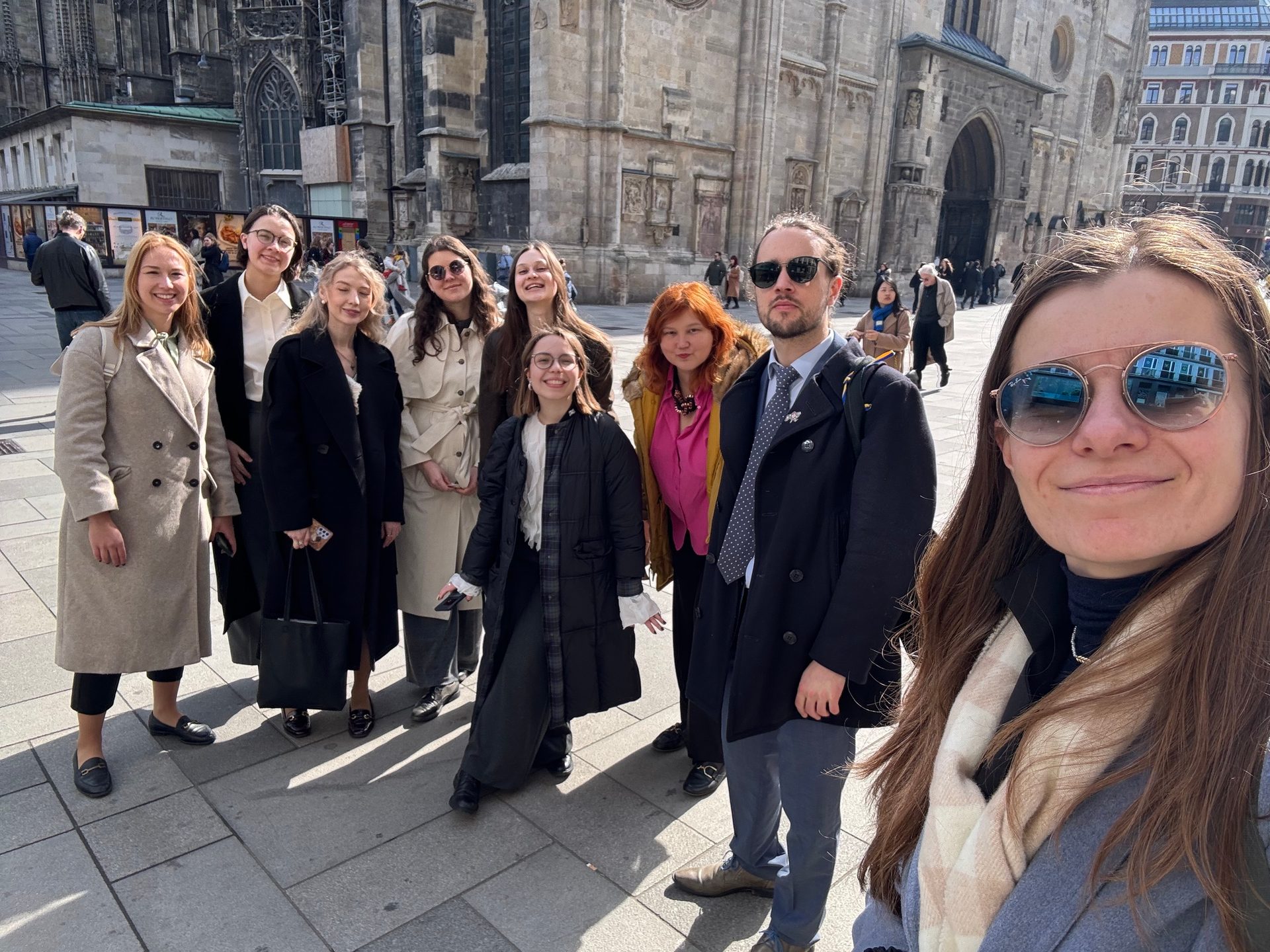
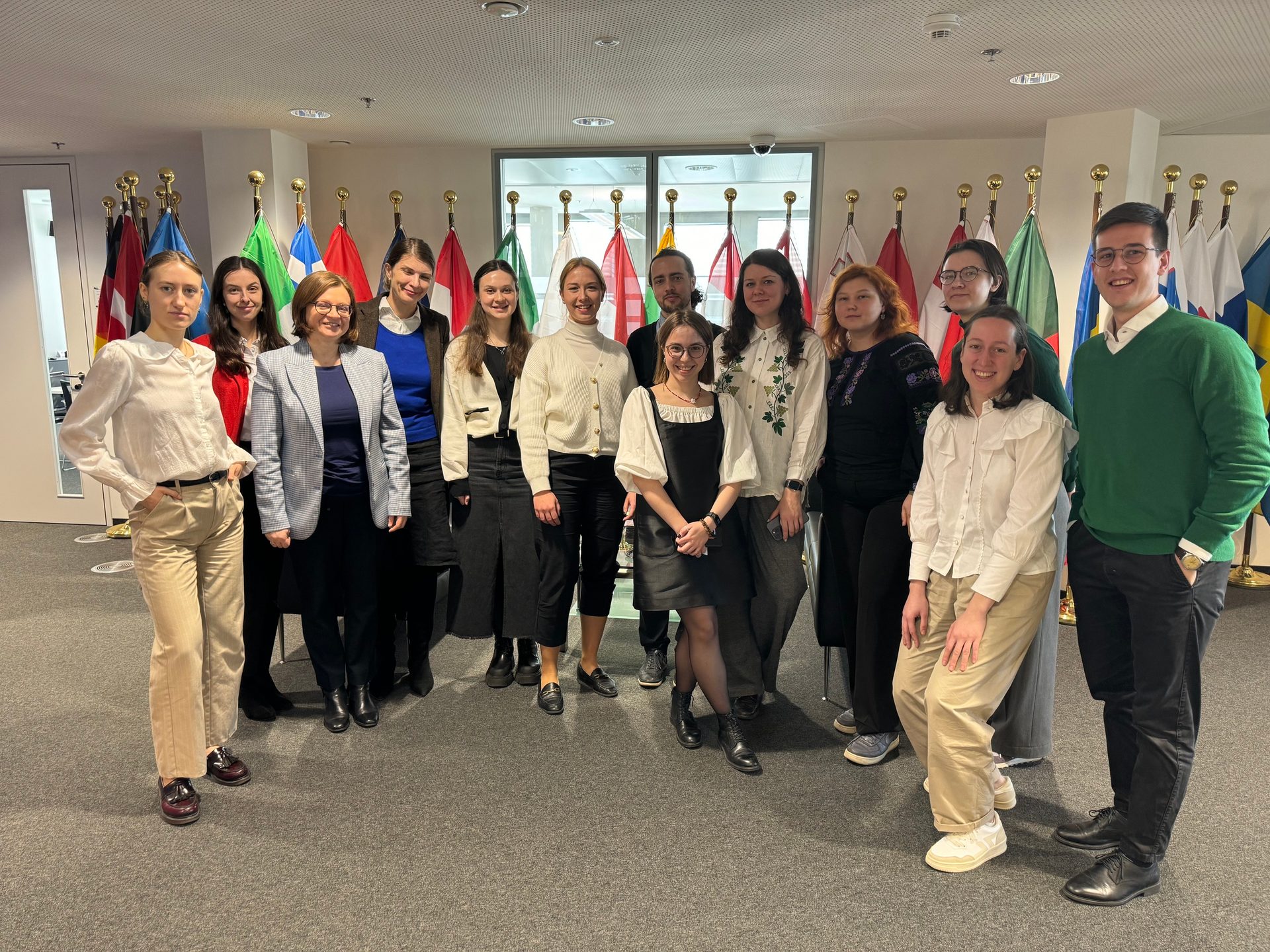
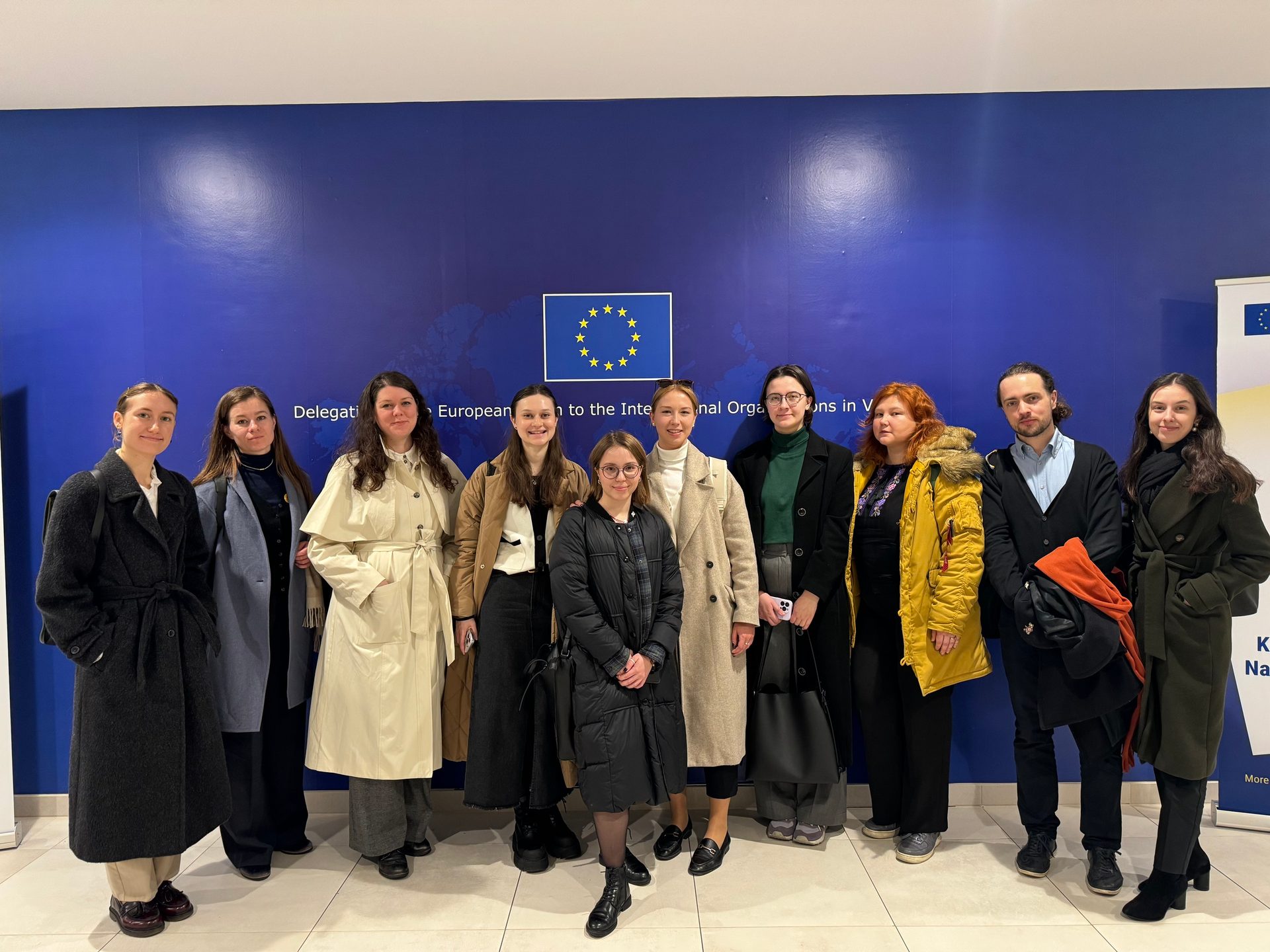
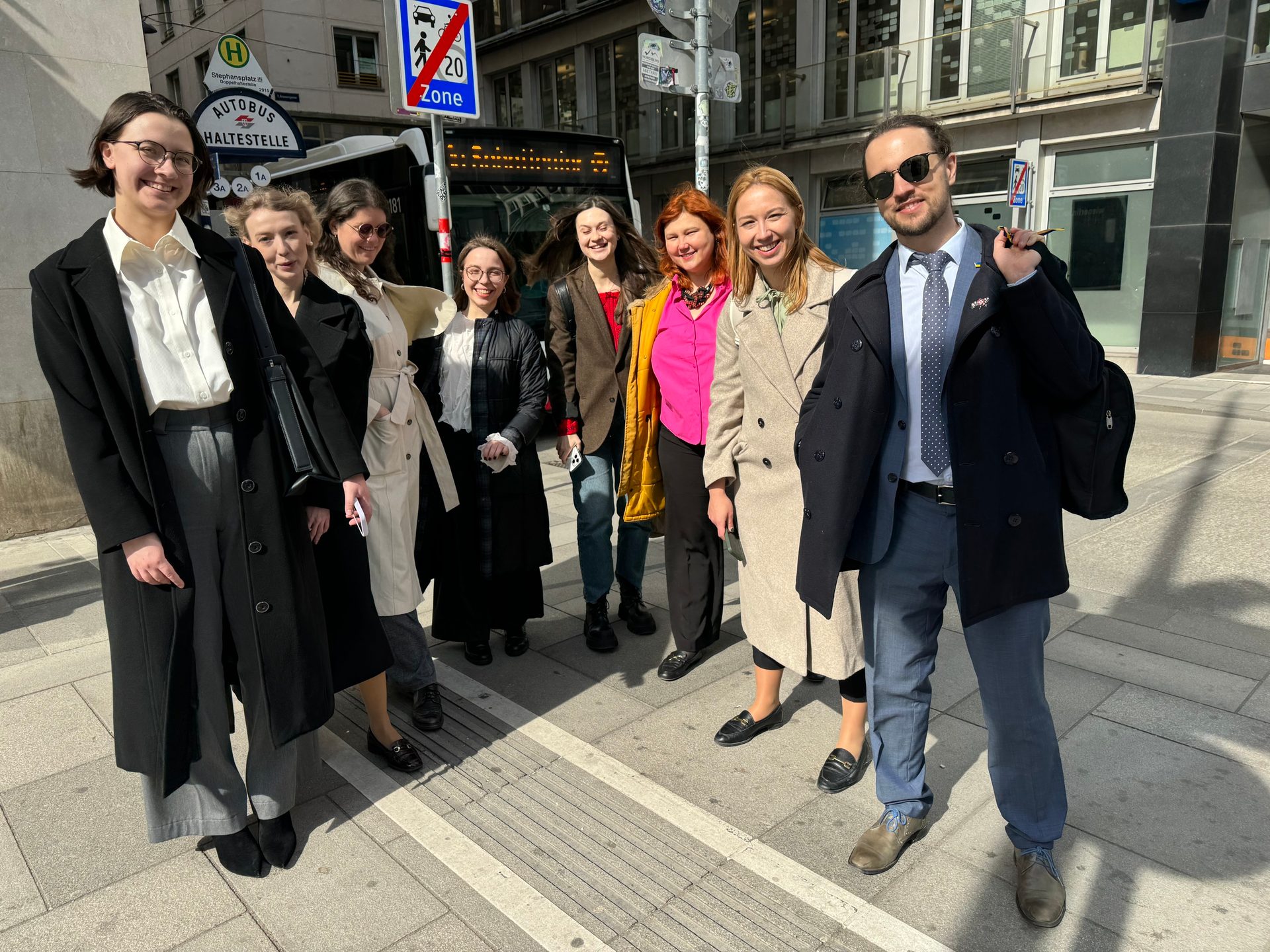
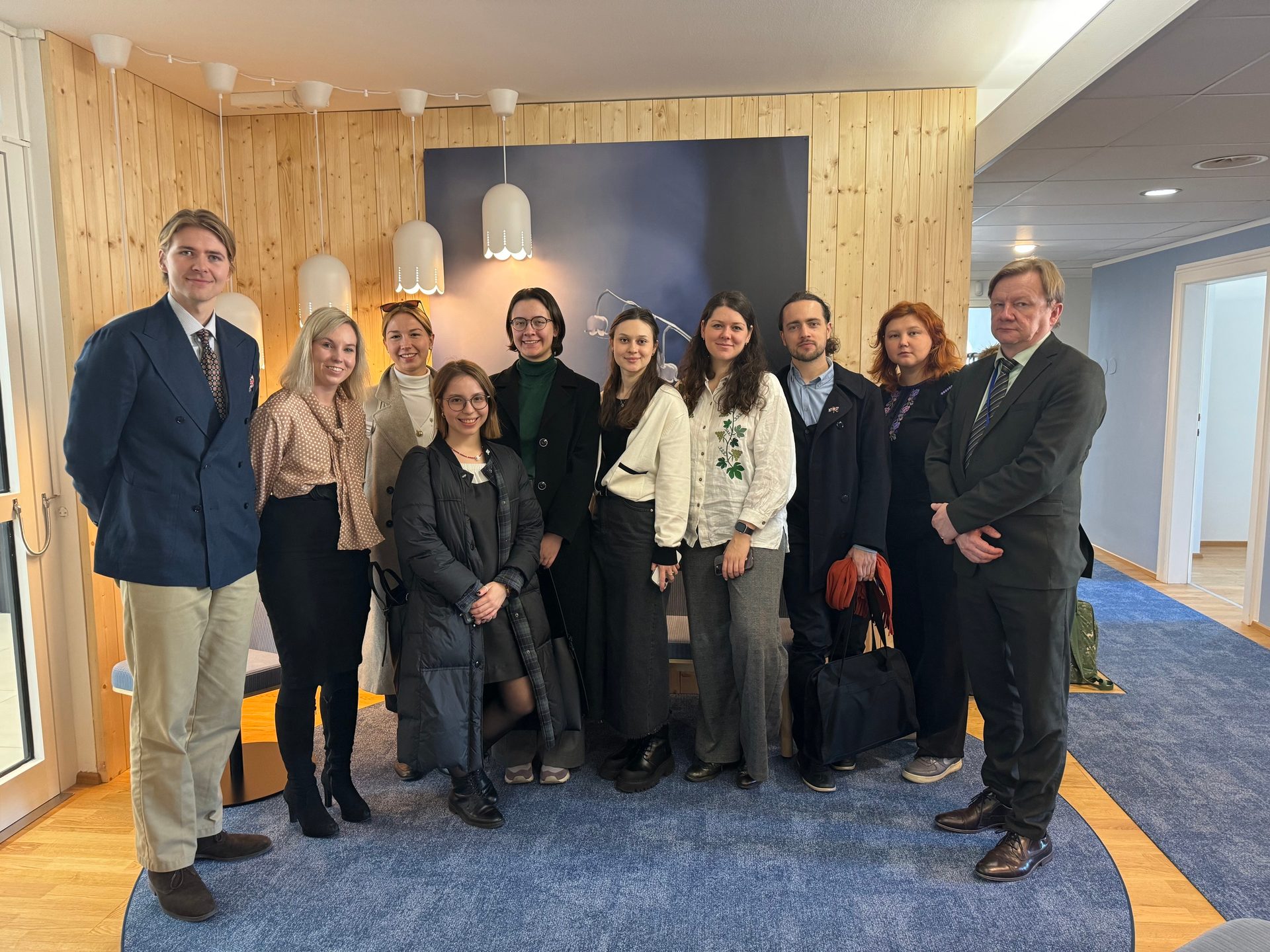
February: HRHF and representatives of HRH Crimea briefed the EU Committee of the Regions on the human rights situation in Crimea.
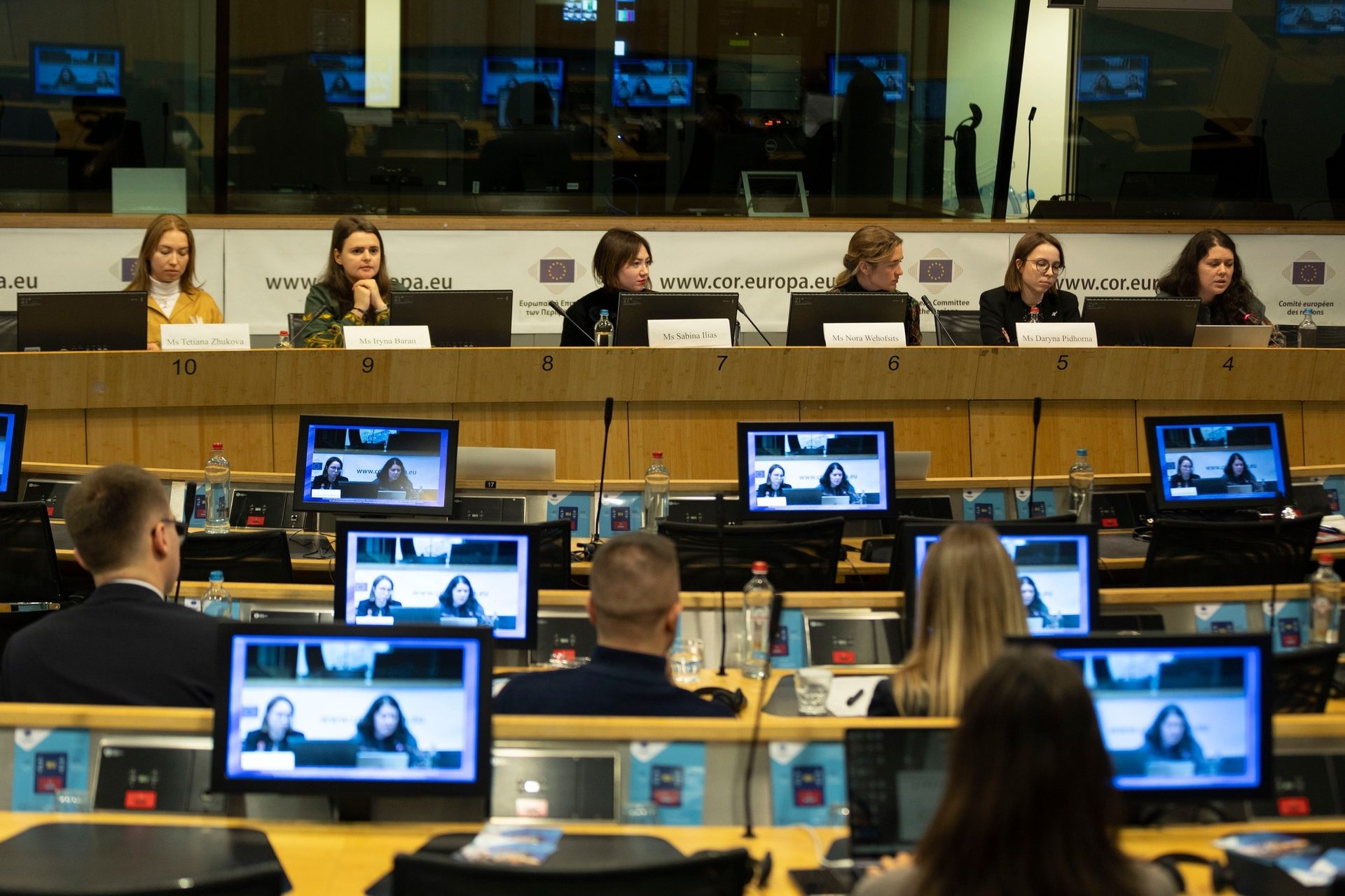
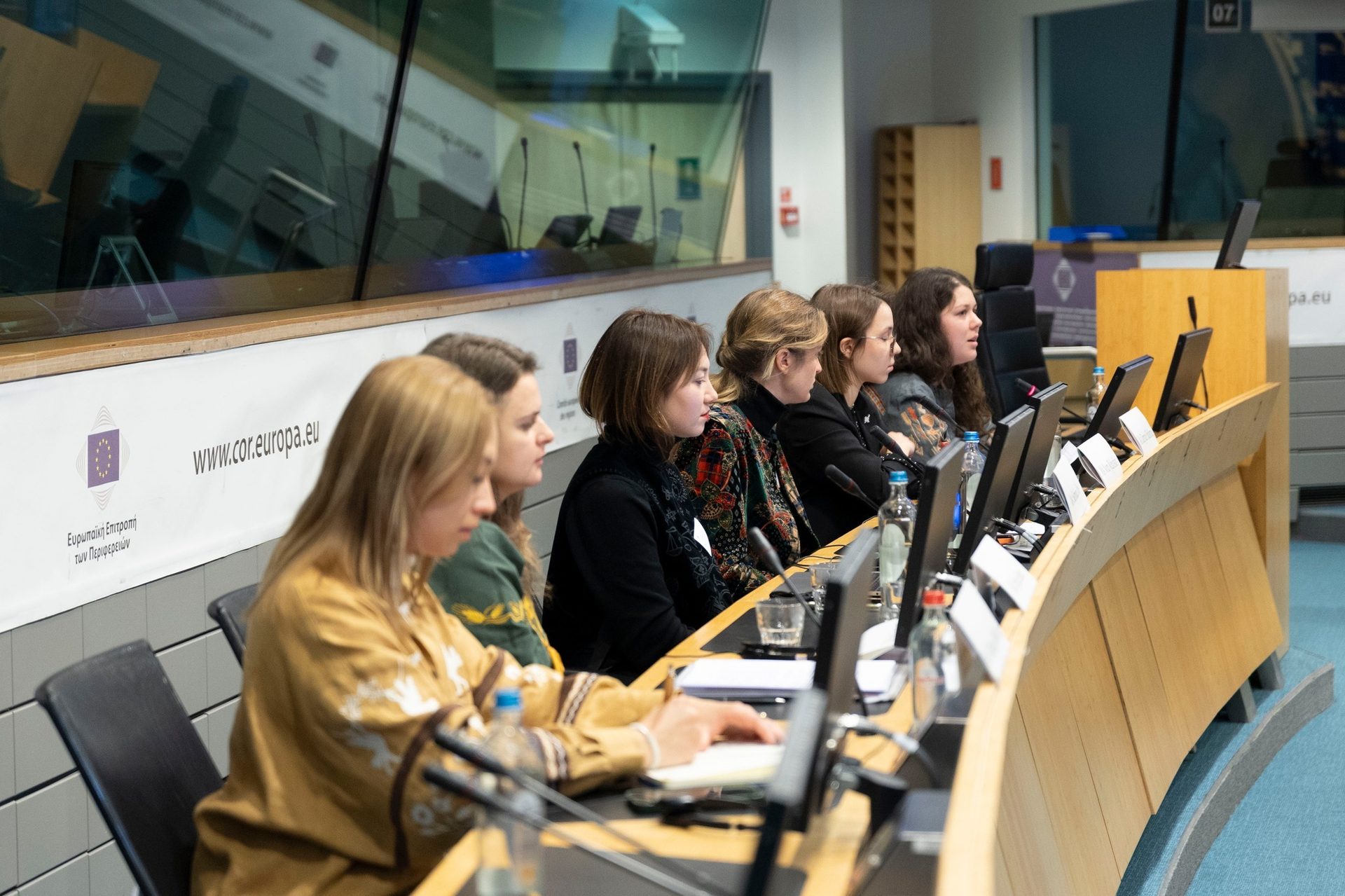
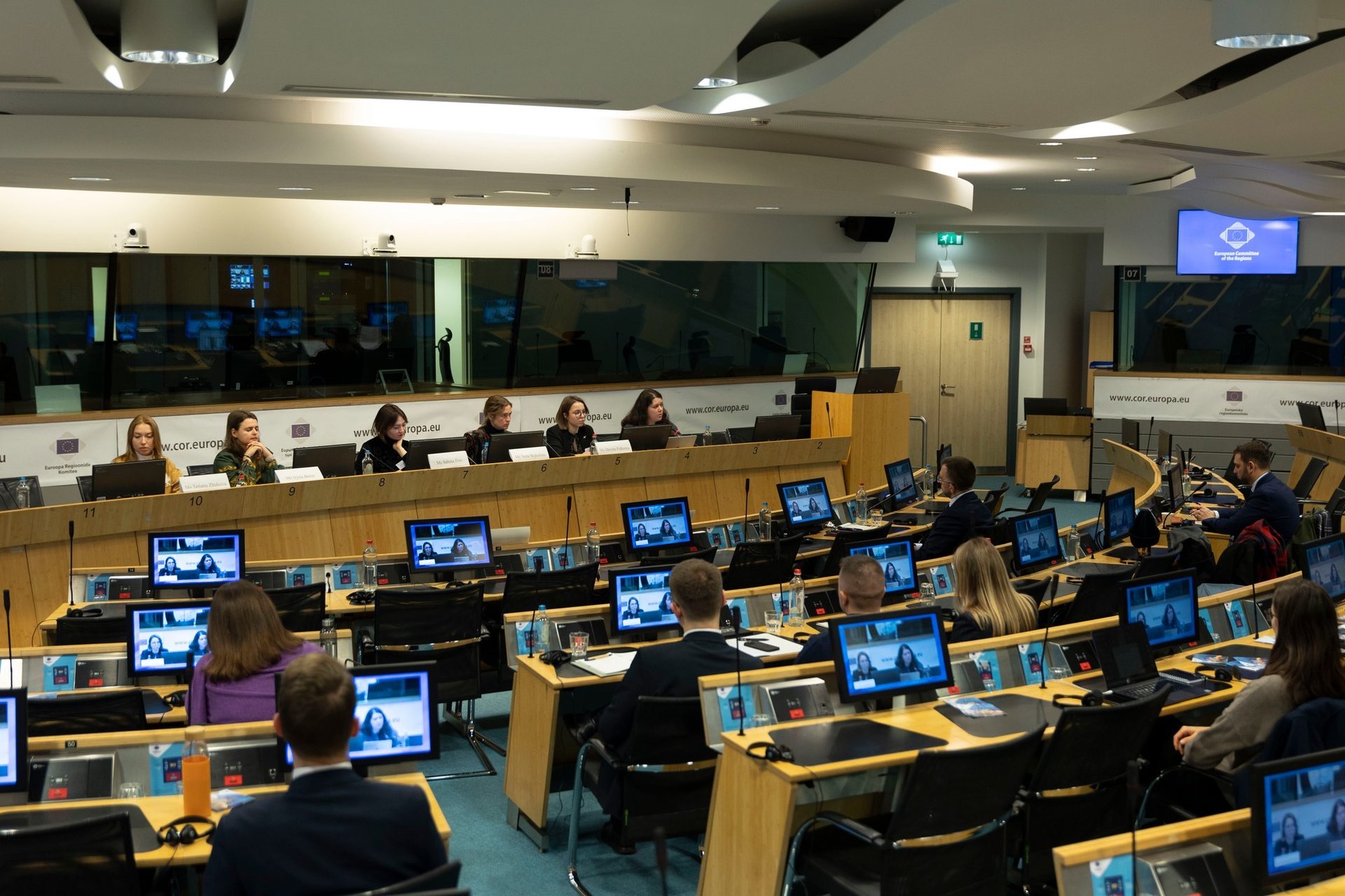
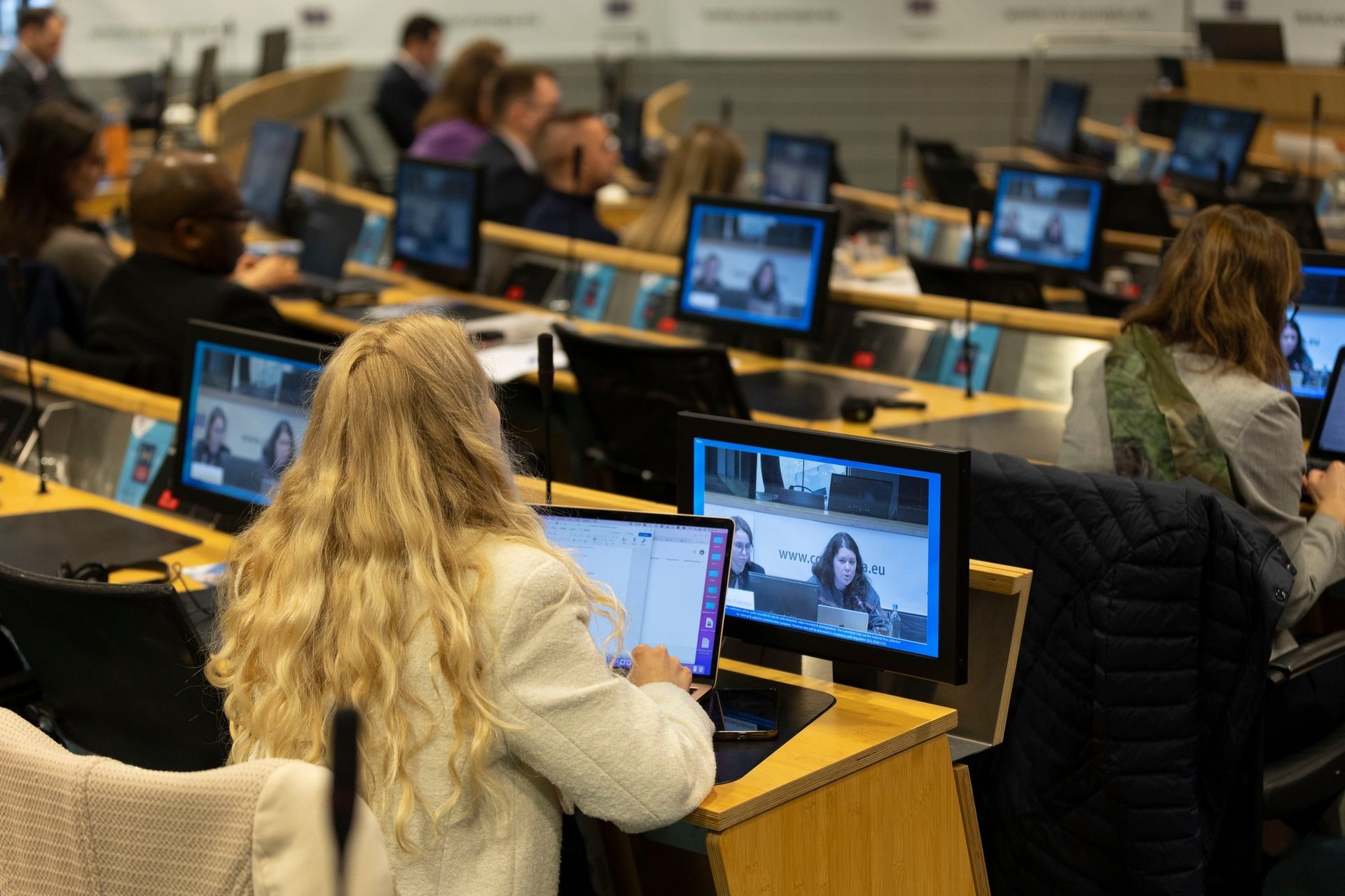
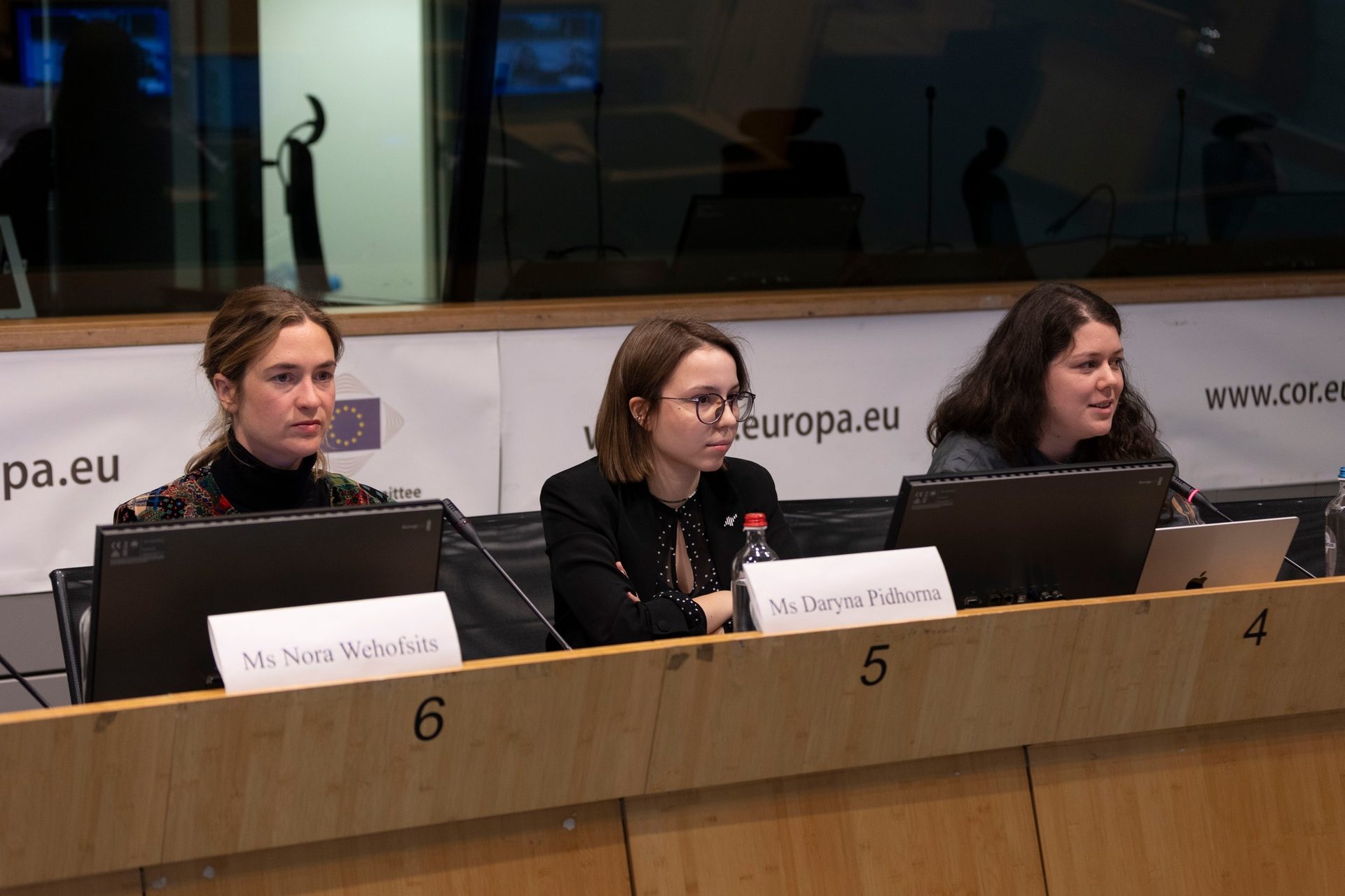
The Network of Human Rights Houses
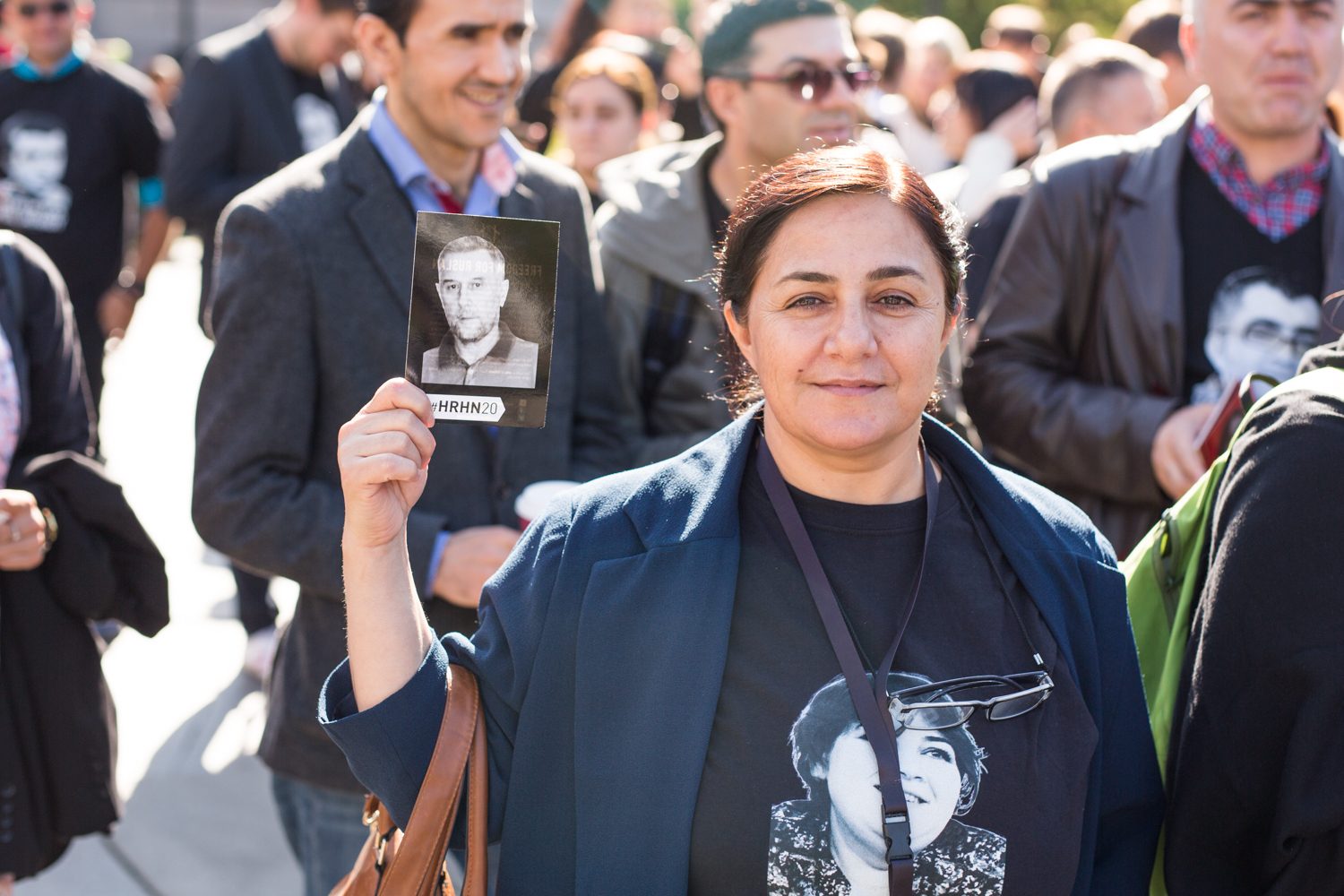
Resource Centre Nakhchivan
Status: Forced to cease activities
The Resource Centre in Nakhchivan was forced to cease its activities in 2014 when its founder had to flee Azerbaijan. The doors of the Centre may be closed, but the dream is to one day return to Nakchivan and re-open the doors as a home for local civil society.

Index on Censorship
Location: London, United Kingdom
Index on Censorship is a nonprofit that campaigns for and defends free expression worldwide. Index publishes work by censored writers and artists, promotes debate, and monitors threats to free speech.
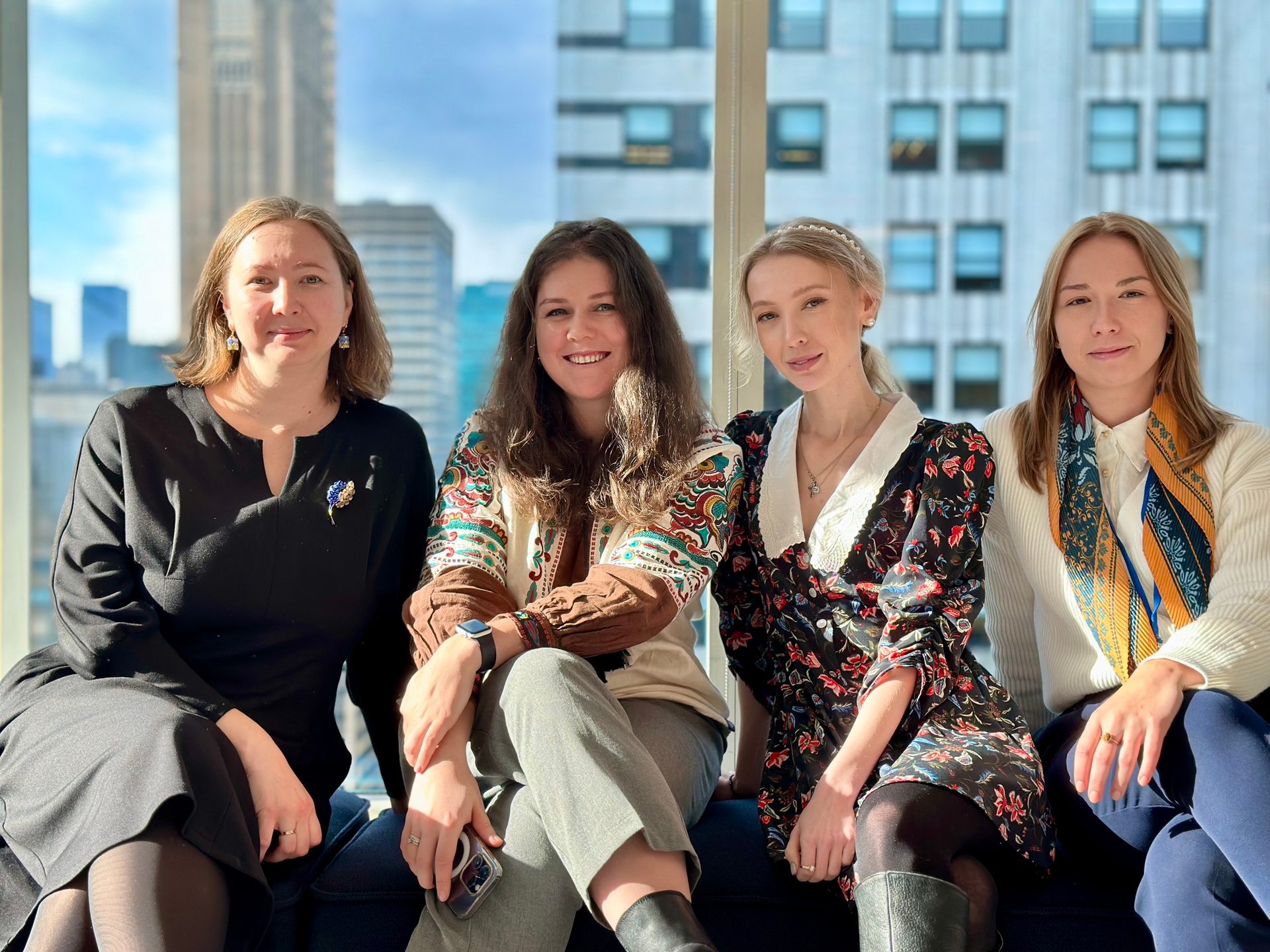
Human Rights House Crimea
Location: Kyiv, Ukraine.
Human Rights House Crimea aims to develop, strengthen, and coordinate the capacity of organisations involved in human rights protection in Crimea, ensuring more effective and systematic human rights work. Among its establishing members are three organisations displaced from the peninsula following its occupation and illegal annexation by the Russian Federation in 2014. Today, HRH Crimea focuses on the human rights situation in Crimea and other southern territories of Ukraine temporarily occupied by Russia.
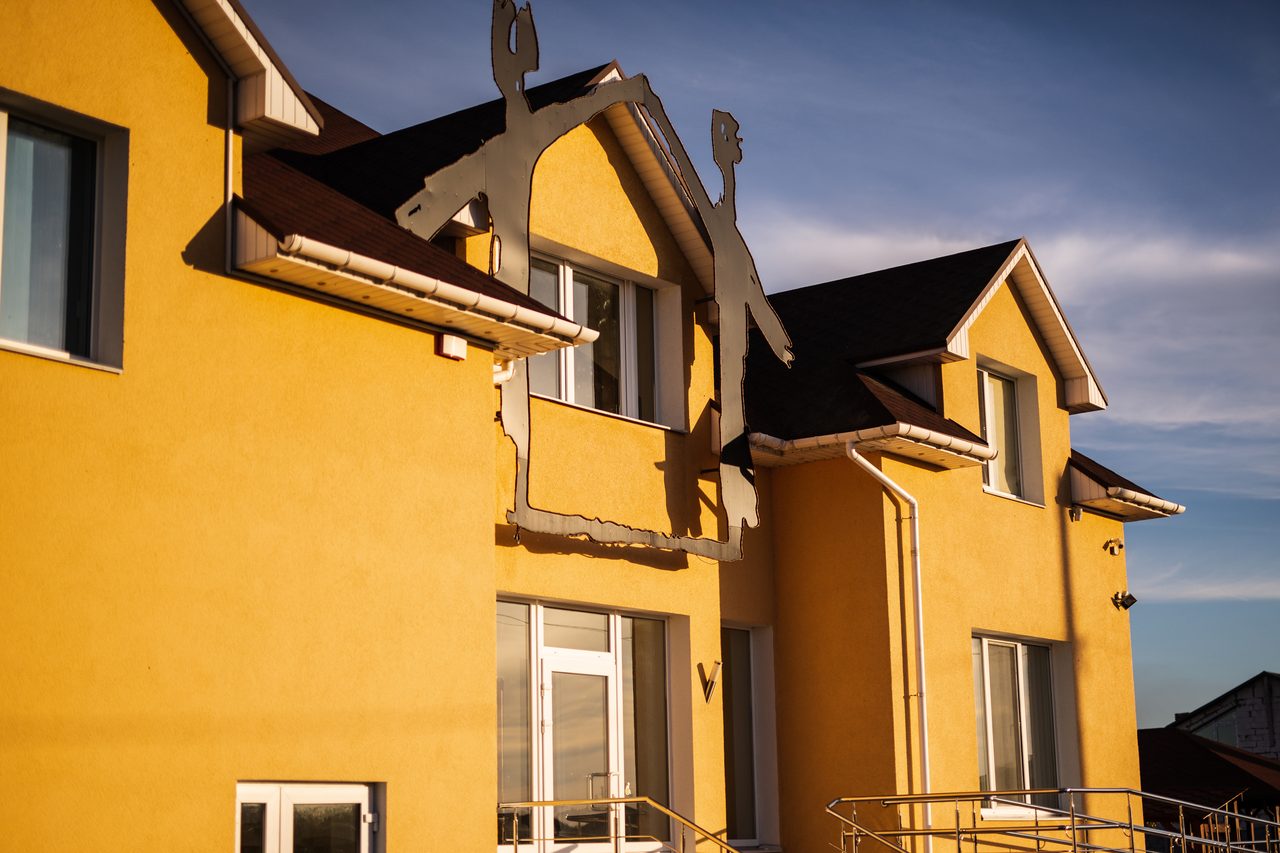
Educational Human Rights House Chernihiv
Location: Chernihiv, Ukraine.
Educational Human Rights House Chernihiv unites organisations, human rights defenders, and civil activists, who believe that education can secure long-term positive changes in the field of human rights.
EHRH Chernihiv has worked tirelessly to assist in repairs and humanitarian work in Ukraine as well as to document Russia’s continued military aggression.
Read about Educational Human Rights House Chernihiv and its member organisations.
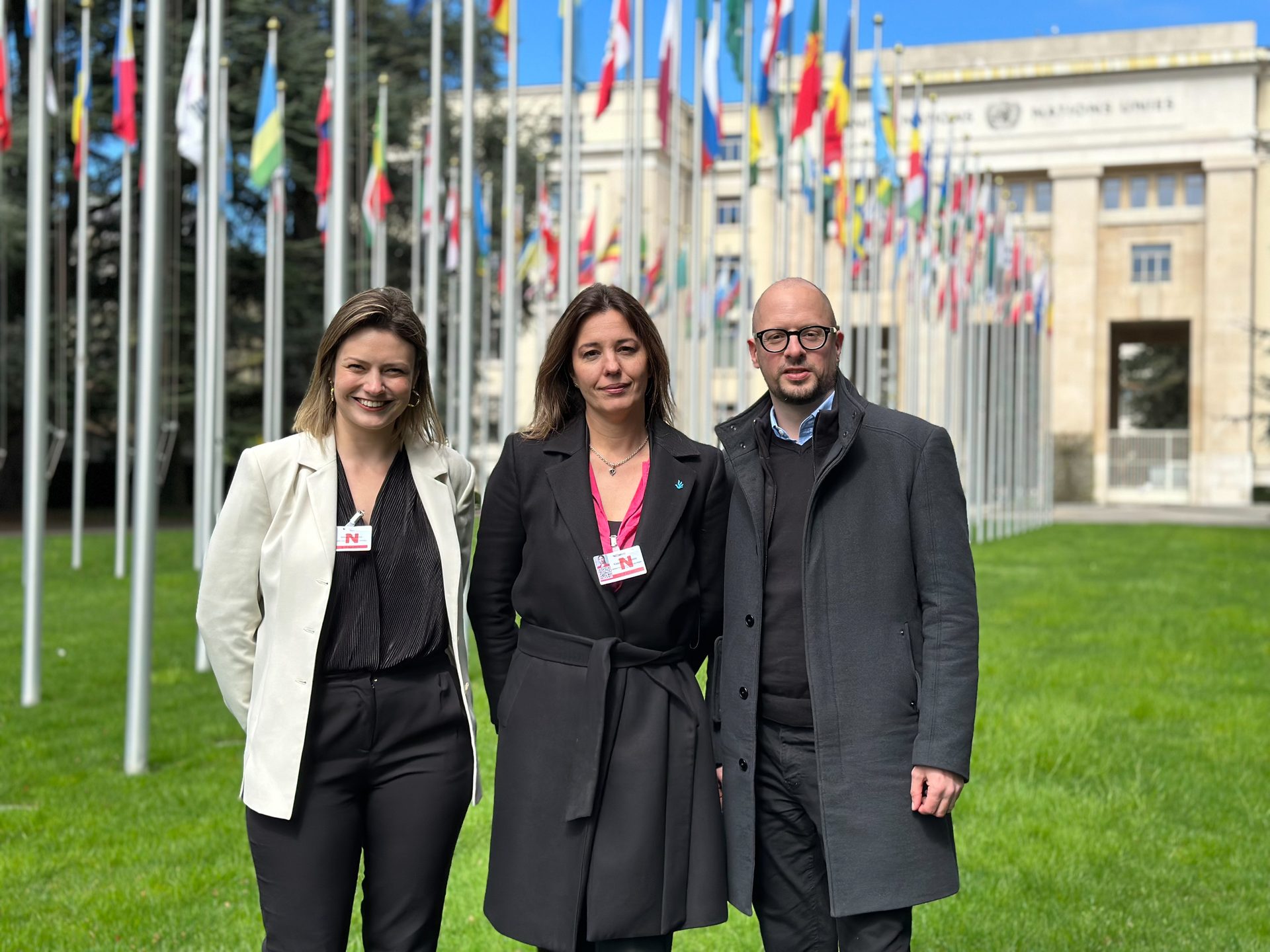
Human Rights House Belgrade
Location: Belgrade, Serbia.
Supporting civil society, Human Rights House Belgrade has a focus on economic and social rights, discrimination, hate crime, minority issues, and access to justice. HRH Belgrade supports human rights defenders, providing free legal aid in the first instance. It is also a leader in Serbia’s EU negotiation process, coordinating with the National Convention on the EU – the platform for discussion on Serbian accession – as a genuine civil society movement for reforms and further EU integration.
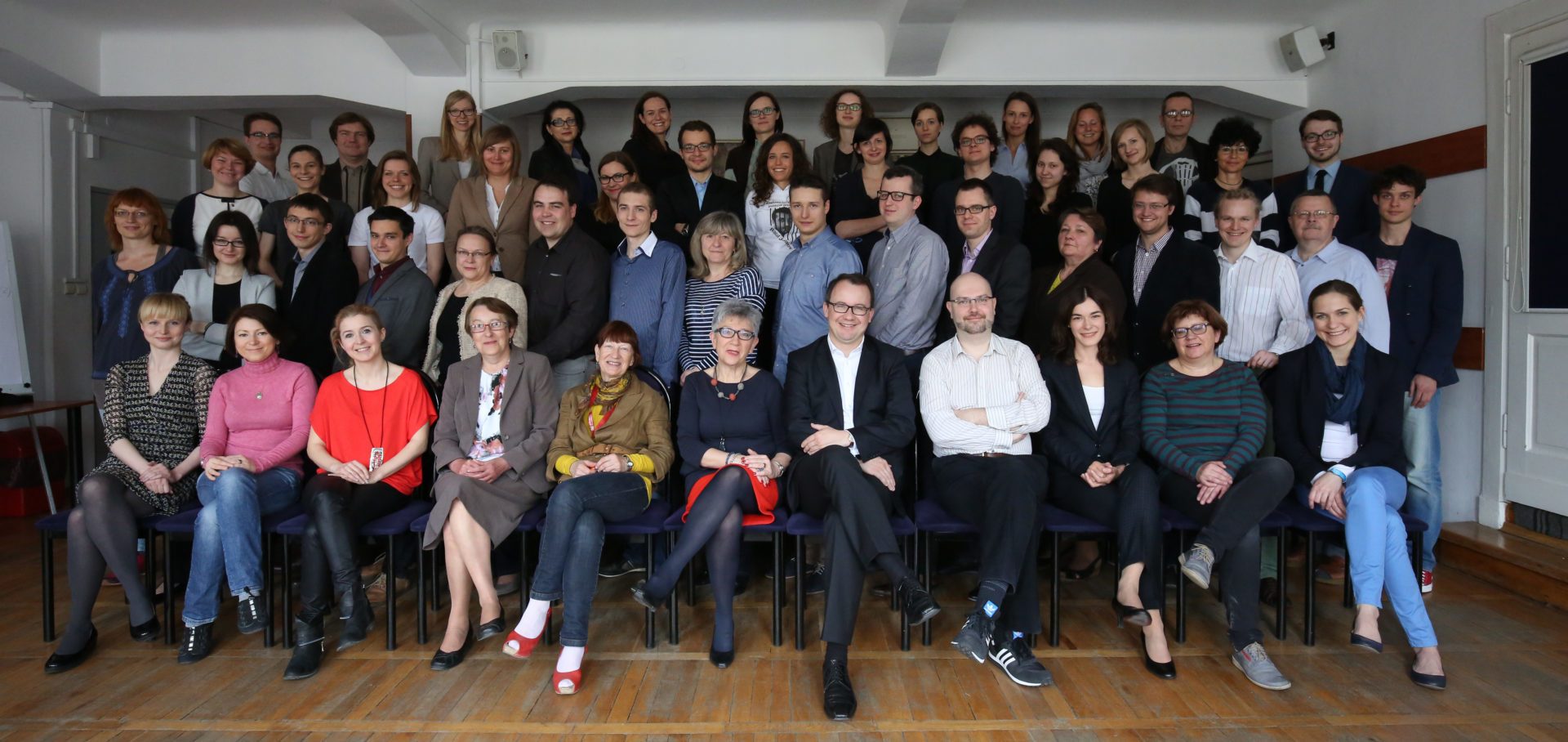
Helsinki Foundation for Human Rights
Location: Warsaw, Poland
In 1994, the Warsaw-based Helsinki Foundation for Human Rights became one of the founding members of the Network of Human Rights Houses and remains its member. It is one of the oldest non-governmental organisations involved in the field of human rights protection in Poland. Since 2022, it has also documented war crimes in Ukraine.
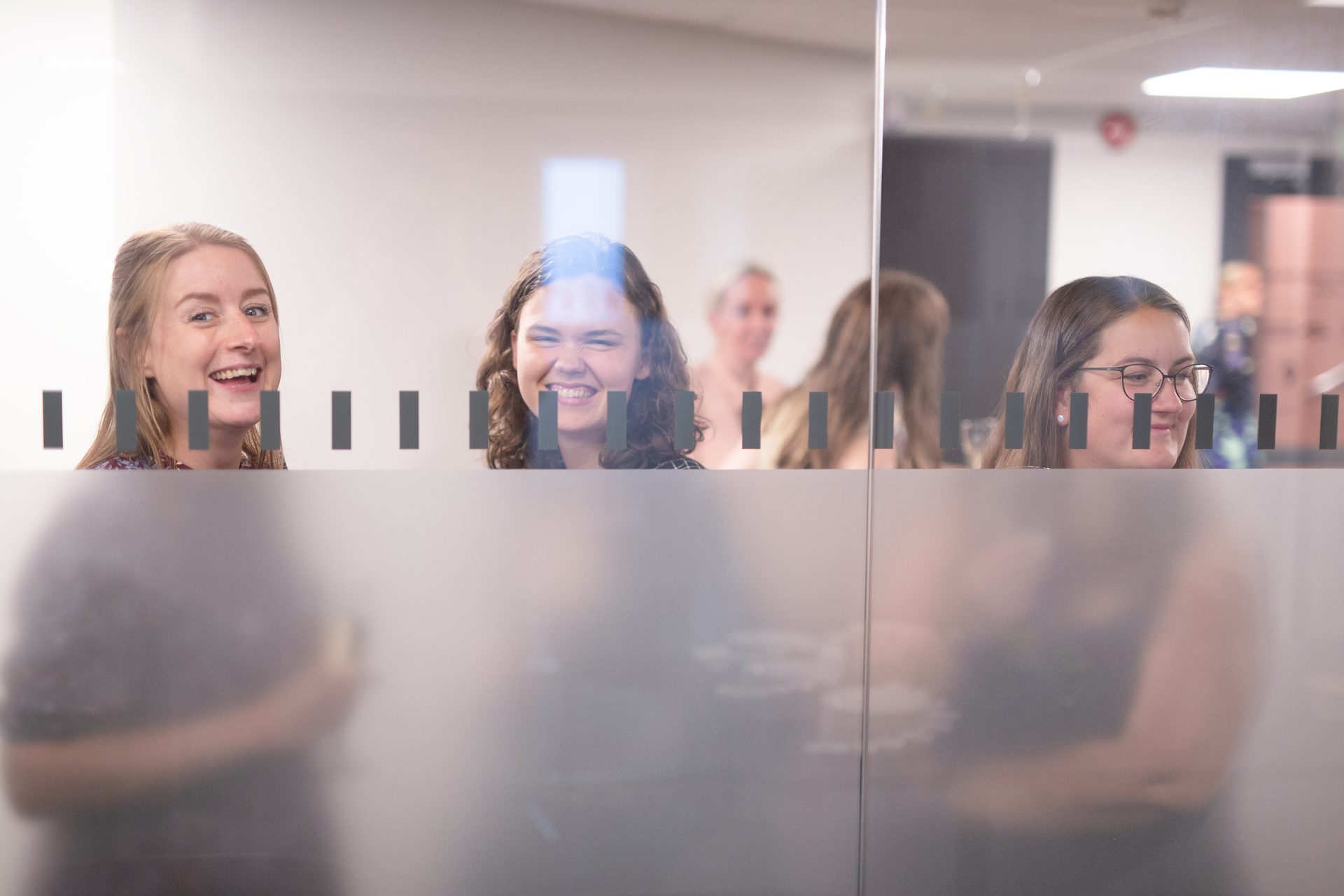
Human Rights House Oslo
Location: Oslo, Norway
The first Human Rights House was founded in Oslo in 1989, during a time of great change and hope for human rights in Europe. Human Rights House Oslo is today home to six diverse organisations that champion a variety of thematic and geographical human rights issues. These range from women’s rights in Norway, to the human rights situations of Tibet, Eastern Europe, and the entire African continent.
Read about Human Rights House Oslo and its member organisations.
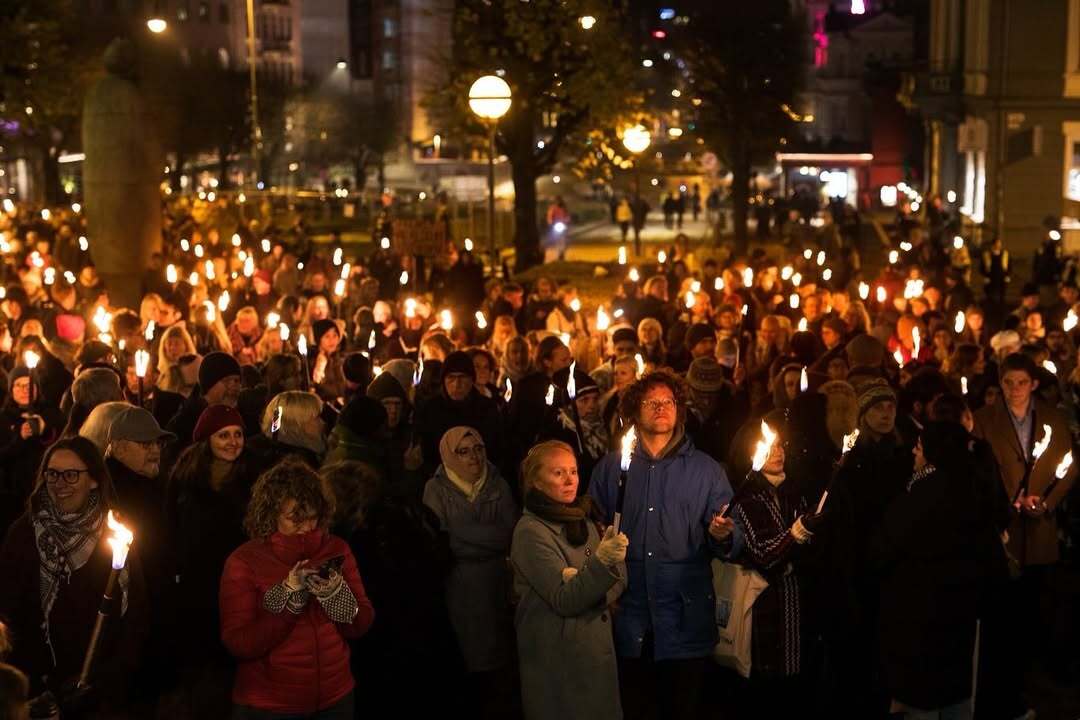
Rafto Foundation
Location: Bergen, Norway
The Rafto Foundation works to promote human rights by presenting the Rafto Prize, empowering human rights defenders, challenging authorities and the business community and by providing education in democracy and human rights.
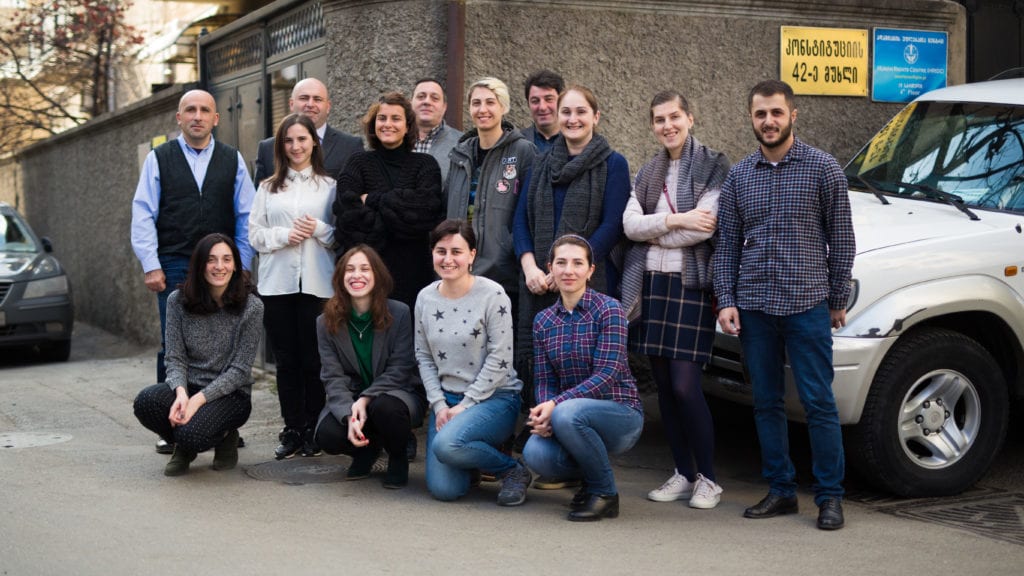
Human Rights House Tbilisi
Location: Tbilisi, Georgia
Human Rights House Tbilisi unites five civil society organisations working on issues including media freedom, gender-based violence, rehabilitation of victims of torture, and other human rights topics. HRH Tbilisi is an important regional resource working to increase capacity and protection for regional HRDs.
Read about Human Rights House Tbilisi and its member organisations.
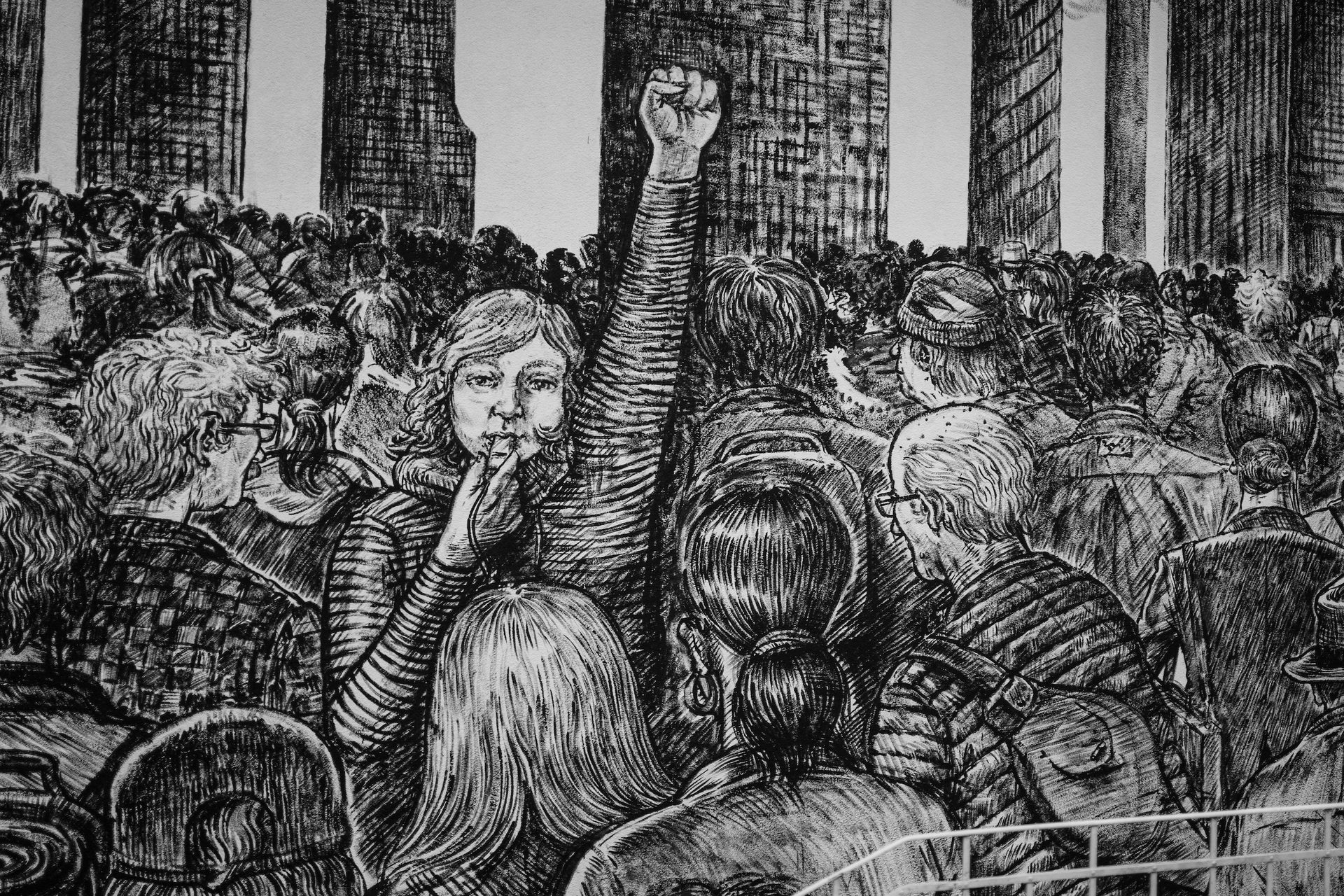
Human Rights House Zagreb
Location: Zagreb, Croatia
Human Rights House Zagreb was established in 2008 with a goal to contribute to building a democratic, pluralistic and inclusive society based on the values of human rights, social justice and solidarity. Today, HHR Zagreb unites six organisations and is renowned as the centre of expertise on human rights in Croatia. HRH Zagreb works on research, monitoring, advocacy and education within three programs: democracy and human rights, justice and human rights, and socio-economic rights.
Read about Human Rights House Zagreb and its seven member organisations.
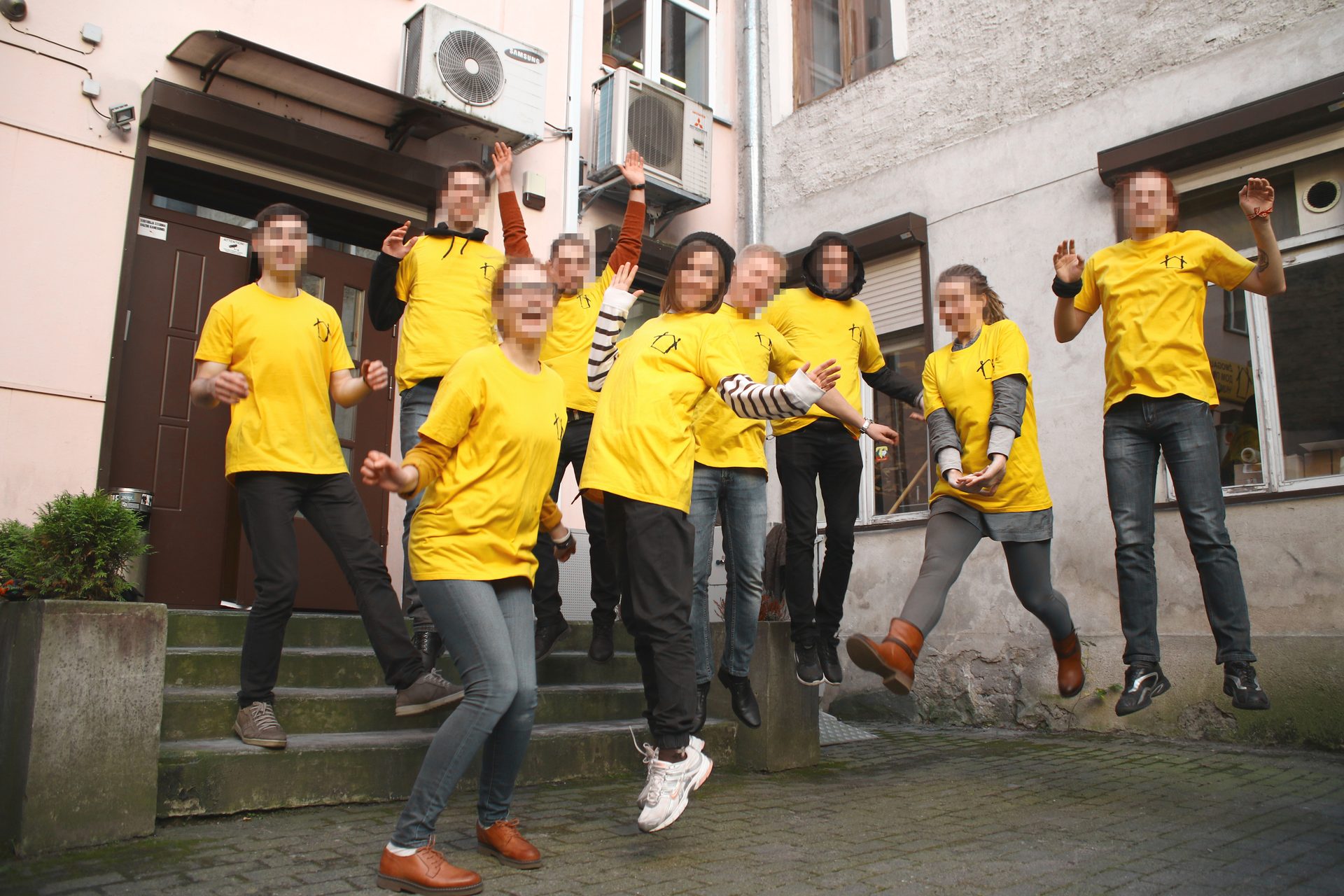
Barys Zvozskau Belarusian Human Rights House
Location: Vilnius, Lithuania
The Barys Zvozskau Belarusian Human Rights House supports and develops the human rights movement of Belarus. The Barys Zvozskau Belarusian Human Rights House was registered in 2006 in exile in Lithuania due to the impossibility for the House to operate in Belarus.
Read more about the Barys Zvozskau Belarusian Human Rights House.
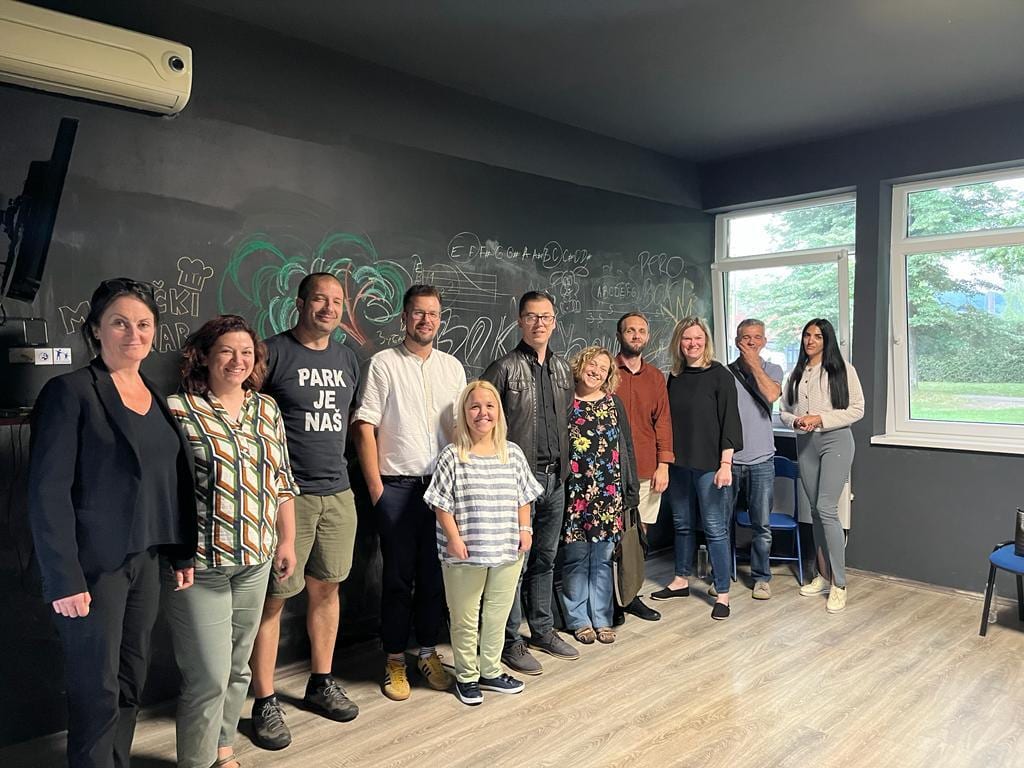
Human Rights House Banja Luka
Location: Republika Srpska, Bosnia and Herzegovina
Established in Bosnia and Herzegovina in 2023, Human Rights House Banja Luka unites ten organisations with decades of combined experience in promoting and protecting human rights, with a particular focus on the rights of women, children, whistleblowers, and environmental activists.
Read more about Human Rights House Banka Luka and its member organisations.
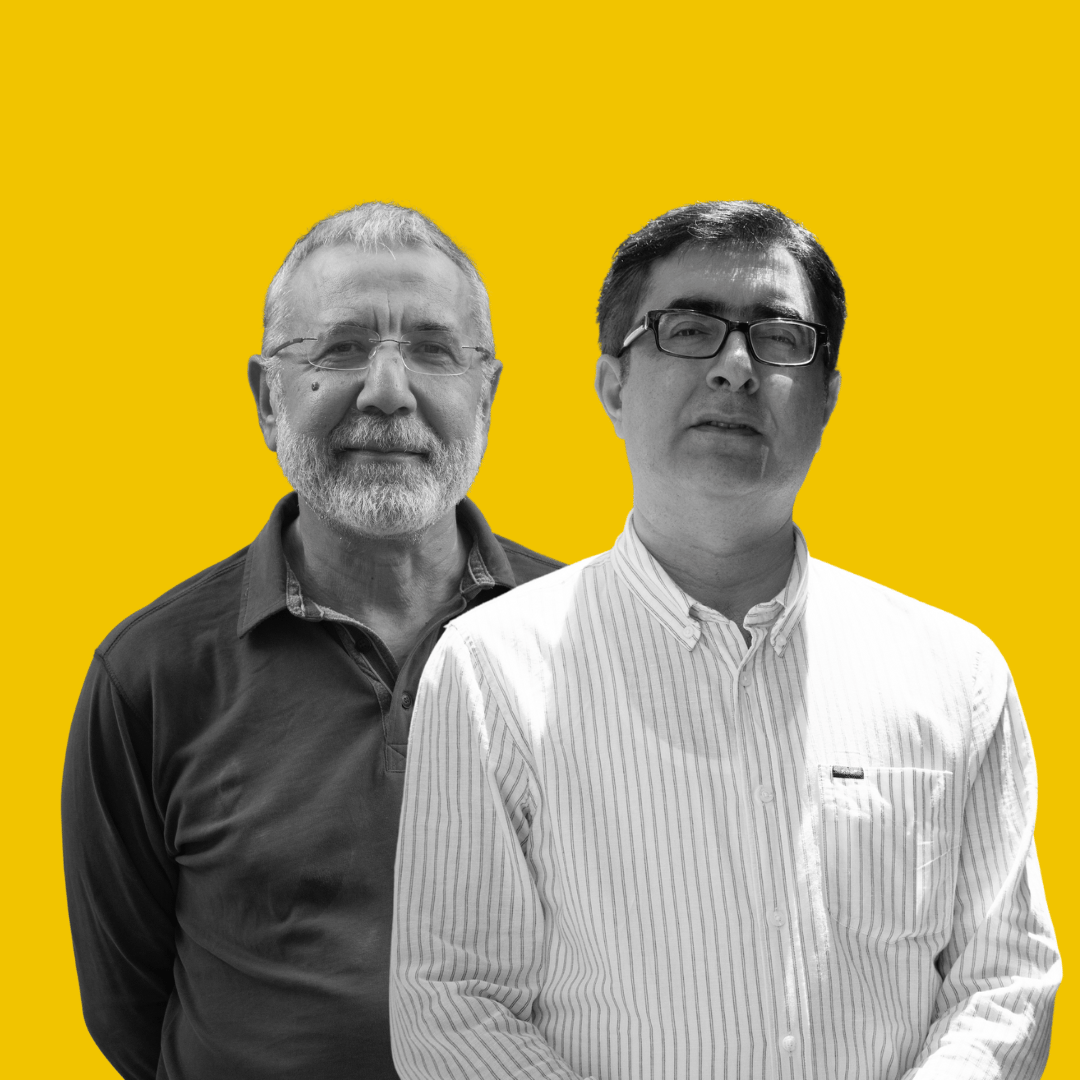
Human Rights House Azerbaijan
Location: Azerbaijan
Established in 2007, Human Rights House Azerbaijan operated until its closure by the Ministry of Justice in 2011. Member organisations continue working to reopen HRH Azerbaijan. Anar Mammadli, leader of Election Monitoring and Democracy Studies Center (one of HRH Azerbaijan’s member organisations) has been unjustly detained on spurious charges since 29 April 2024, in retaliation for his work. HRHF calls for his release.
Read more about Human Rights House Azerbaijan and its member organisations.
Human Rights House Yerevan
Location: Yerevan, Armenia
Established in Armenia in 2012, Human Rights House Yerevan unites six organisations. Human Rights House Yerevan is committed to a safe, accessible, and common space for activists, civil society organisations, movements, civic initiatives, and human rights defenders, who are often targeted for their work. The mission of the House is to protect, empower, and support these groups in their efforts to promote and uphold human rights.
Read more about Human Rights House Yerevan and its member organisations.
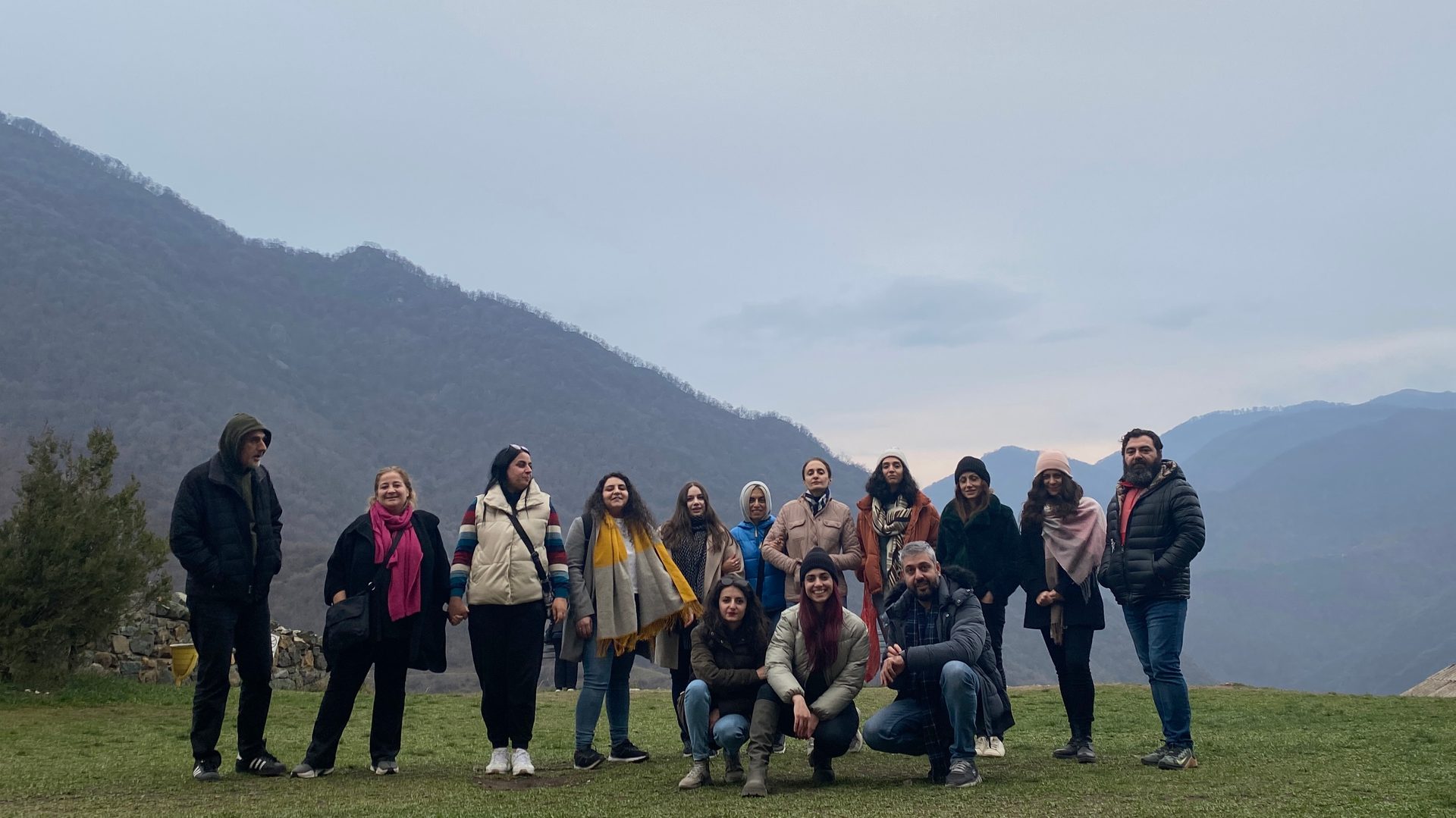
Human Rights Houses in 2024
Concept
The Human Rights House concept is built around the enduring values of solidarity & partnership. It remains as important today as when the first House opened its doors in Oslo in 1989.
Human Rights House Foundation establishes and supports Human Rights Houses – coalitions of local independent civil society organisations working to advance human rights at home and abroad. In 2024, over 80 NGOs were united in an international Network of Human Rights Houses.
Human
Rights House Foundation
Human Rights House Foundation is an international non-profit non-governmental organisation headquartered in Oslo with an office in Geneva and representation in Brussels. HRHF holds consultative status at the United Nations and participatory status at the Council of Europe.
This financial data has been summarised from HRHF’s annual accounts. For a complete copy of the annual accounts and the accompanying independent audit report click here.
% Expense distribution per organisational objective: Direct support / HRHF-led initiatives
1. Establish and support Human Rights Houses (62% / 38%)
2. Connect Human Rights Houses (34% / 66%)
3. Protect Human Rights Defenders (64% / 36%)
4. Advance 4 rights core to human rights work (20% / 80%)
5. Build & maintain organisational capacity (0% / 100%)
Direct Support to Partners
HRHF-led Initatives
1.
2.
3.
4.
5.
% Expenses per organisational objective*
1. Strengthen the capacities of HRHs to advance human rights (47%)
2. Strengthen the Human Rights House Network and its impact (28%)
3. Strengthen the promotion and protection of rights that underpin independent civil society (12%)
4. HRHF organisational sustainability (13%)
*Including NOK 12.3 mln (EUR 1.1 mln) in direct support to partners.
Allocation of expenses 2024
% Revenue by donor
Norwegian Ministry of Foreign Affairs (73%)
UK Foreign, Commonwealth and Development Office (9%)
European Commission (8%)
Federal Department of Foreign Affairs of Switzerland (6%)
Ministry for Foreign Affairs of Finland (3%)
Other donors (1%)
For the fiscal year ending 31 December 2024, Human Rights House Foundation’s revenue totalled NOK 37.6 mln (EUR 3.2 mln).
Revenue 2024

Donate
We seek new partnerships in order to expand our ability to advance human rights through empowering human rights defenders and strengthening independent civil society.
We offer our sincere thanks for the generous financial support that we received from donors.
In 2024, our donors included the Norwegian Ministry of Foreign Affairs, the Federal Department of Foreign Affairs of Switzerland, the European Commission, the Ministry for Foreign Affairs of Finland, the Foreign, Commonwealth and Development Office of the United Kingdom, the Ministry of Foreign Affairs of the Czech Republic, and other donors.
We also thank our partners, including ERIM, for collaboration and joint work.
Financial information
% Gender balance (Male / Female)
0
/
0
Locations: Headquarters in Oslo with an office in Geneva and representation in Brussels.
0
Languages spoken in our offices
0
Nationalities represented in our team
0
15 members of staff and 4 consultants work for HRHF
0
Our people in 2024
*Due to security concerns, some of our staff/consultants are not visible in this report.
Elaine Sabourin (Through June 2024)
Senior Grants Officer
Pasha Bystrova
Communication Consultant
Consultants *
Mushegh Yekmalyan (Through May 2024)
Senior Human Rights Officer
Nina Pániková
Senior Capacity Building Officer
Kateryna Oleinikova
Administrative Assistant
Evy Nilsen
Senior Human Resources Officer
Matthew Jones
Senior International Advocacy Officer
Prisca Jaobelison
Administrative Officer
Craig Jackson
Senior Communication Officer
Thomas Engebretsen
Financial Accountant
Staff *
Daiva Petkevičiūtė
Head of Network Development and Support
Iryna Pavlovska
Head of Administration and Finance
Management
Minda Holm
Research fellow with the research group on foreign policy and diplomacy, Norwegian Institute of International Affairs (NUPI)
Karen-Anna Eggen
Researcher, Norwegian Institute for Defence Studies
Laila Bokhari
Fellow, Harvard Kennedy School of Government
Pål Lieungh
(Deputy Chair)
Partner, Thommessen law firm
Christopher
Hansteen
(Deputy Chair)
Partner, Hjort law firm
Bernt Hagtvet
(Chairperson)
Professor emeritus, Institute of political science, University of Oslo
Board members

